#the men's changing room is a parallel universe in itself
Explore tagged Tumblr posts
Text
When cleaning the women's changing room at the gym: *silence. no one needs anything.*
The moment I get permission to enter the men's changing room: DING DONG PLS COME TO THE ENTRANCE COUNTER!! RIGHT NOW!! IMPORTANT!! DON'T IGNORE ME!!
(We employees carry a phone with us when we leave the counter so that if someone needs something they can ring and we can go back to the counter)
#idk if I'm just unlucky or if people have absolute shit timing#but it happens so often#and then i have to go and ask permission to go in again. and then no one answers cuz I'm just asking for the atmosphere or something.#dw it's fine if i yell in “female employee - may i enter?” into a changing room where there are clearly people inside and no one answers#things happening in meg's life#the men's changing room is a parallel universe in itself#sometimes it's relatively clean and other times that poor room has seen the apocalypse
22 notes
·
View notes
Photo

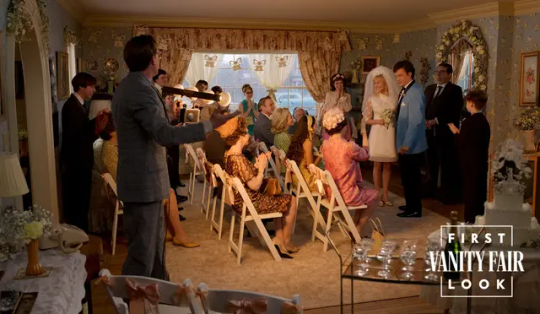


FIRST LOOK “Here”
“Here takes place entirely from one fixed point of view. The camera never budges. It doesn’t zoom and never even turns. What does move—and rather quickly—is time. More than a century of life in one American living room plays out during the brisk 104-minute story.
Here is a Forrest Gump reunion of sorts, both in front of and behind the camera. The film, which debuts in theaters November 15th, stars Tom Hanks and Robin Wright and was cowritten by Zemeckis and Eric Roth, all of whom collaborated on that earlier Oscar-winner. Little has been shared about Here's unusual point of view until now. “That’s the excitement of it,” Zemeckis says. “What passes by this view of the universe? I think it’s an interesting way to do a meditation on mortality. It taps into the universal theme that everything passes.”
Here has some parallels to a traditional playhouse experience, since the film takes takes place in one location, but it differs because the set itself is constantly evolving and changing. “When you’re watching something on the stage, you are the editor and the filmmaker,” Zemeckis says. “You decide, ‘Am I going to watch that character or am I going to look over here and see that guy who’s sitting on the sofa?’ What we do with the panels is we guide the audience to what we want them to see.”
Using these panels, flashes of the home’s many inhabitants over the decades weave together throughout the story. A World War II veteran turned salesman named Al (WandaVision’s Paul Bettany) and his homemaker wife, Rose (Yellowstone’s Kelly Reilly), move into the house shortly after he returns Stateside after surviving heavy combat. Hanks’s character, Richard, is their firstborn, which sets the core of Here’s story in motion. “There were men in the 1930s and ’40s who lived through the Great Depression and then World War II, and then entered the buttoned-down ’50s where everyone had this conformity,” Zemeckis says. “They didn’t have the tools to express their feelings. And so, there was a lot of anger and a lot of lashing out.”
Al is not abusive per se, but he’s got more edge than the Father Knows Best era acknowledged. Rose is no pushover either, even if the doors open to her are vanishingly few. “The whole point was to make the story identifiable,” Zemeckis says. “We didn’t want people [in the house] to be criminals or spies in highly dramatic situations. There are some people who probably won’t like the fact that the conflicts in the movie are not over the top—that they’re pretty rooted in reality.”
The clashes between the generations show how quickly a culture shifts as children grow up and parents grow old. “I think that the film speaks to the truth that we have to accept that everything changes,” Zemeckis says. “Where we get in trouble is when we resist that reality of life, and then we get dug-in and miss out on opportunities.” - Vanity Fair
#Here#filmedit#Robert Zemeckis#Tom Hanks#Robin Wright#Paul Bettany#Kelly Reilly#Filmography#you're telling me I'm not seeing baby faced Bettany in this? I had hopes lol#IT IS HAPPENING!!!
14 notes
·
View notes
Note
2, 28
2 x 28: Royal AU x Proposal Fic
This snippet spiralled out of control, hence why it's about two months late. It's a modern AU (or more like a parallel universe AU) in which Horatio is an English prince and Bush is his long suffering friend who Horatio met in the Navy and has been dragging into royal drama ever since, hence the snippet below.
Horatio was pacing before the long windows, his hands clasped behind his back, when Will was ushered into the reception room by one of the palace staff. He was wearing his full dress uniform, resplendent in naval blue and gold, and Will saw for a moment not his friend, but the man who would one day be king. It unsettled him as it always did, but he shook it off; he knew Horatio too well to be awed by his position.
“Lieutenant Commander Bush,” said Horatio, looking up, a tense smile on his face. Will bowed.
“Your Royal Highness,” said Will, returning the smile. He crossed the room to where Horatio stood. “You summoned me, sir.”
“Yes,” said Horatio. His fingers drummed a nervous pattern against his thighs as he looked Will over. “I take it that you weren’t too busy?”
Will laughed. “I expect I’ll receive a right royal bollocking from Calder when I get back to base, but that’s nothing I can’t handle, sir.”
Horatio’s face darkened. “You should sit,” he said, gesturing at one of the sofas. “I can ring for tea, if you like.”
“I’m quite comfortable standing, sir,” said Will.
Horatio met his eyes, but sensing that Will would not be moved, he sighed. “I expect you’re wondering why I asked you here,” he said, reaching for one of the many newspapers that covered the coffee table. “Here,” he said, shoving it at Will.
Will unfolded it gingerly: it was a cheap tabloid, precisely the type Will had long ago warned Horatio never to glance at if he wanted to preserve his sanity. Horatio’s face was splashed across the front page — a paparazzi shot, by the looks of it — and beneath it… Will exhaled unsteadily.
“Prince of Wales to Wed,” he read aloud. Scanning down to where the article started, he read, “Palace sources reveal that Prince Horatio has announced his intention to wed before his thirty-second birthday in July, as is traditional for a Prince of Wales. The archaic law, begun in the eighteenth century in the reign of… and so on.” He folded the paper and set it down. “Well,” he said, a little stiffly. “I suppose I should congratulate you, sir. Who is the lucky woman?” He caught himself before adding ‘or fellow’. He knew Horatio well, but there were some questions he had never fully found the courage to ask.
Horatio’s expression was troubled, and he glanced away from Will for a moment towards the windows. “That’s the trouble,” he said. “There isn’t anyone.”
Will could only stare at him, aware that he should be grasping on to something here but utterly failing to. “I don’t understand, sir,” he said.
A muscle in Horatio’s jaw twitched as he considered Will’s confused expression. “Sit,” he said, and Will obeyed, perching himself on the sofa and feeling not unlike a truant schoolboy being hauled before the headmaster. He watched as Horatio began to pace, never once looking back at Will, his head bowed and his hands fidgeting behind his back.
“The Royal Marriages Act of 1708 states that if a Prince of Wales should ascend the throne, he must take a bride by the age of thirty-two. If he does not, he will be stripped of his title and the throne will pass down the line of succession.” Horatio’s tone was dry and scholarly, but the unhappy set of his shoulders was indication enough of how he truly felt about it all. “It is how my family took the throne after all — Frederick William, Prince of Wales, would not marry, even when his father demanded it of him, and so the title passed on to an obscure cadet branch. If I am not married by July, the throne will end up in the hands of my second-cousin, a man who should not be given an ounce of responsibility.” He turned to William, anguish on his face. “Don’t you see?” he asked. “I have tried to get my father to change the law — I have begged him — but no use. He and all his Tory sycophants in Parliament would see me become no more than a painted figurehead. Well, I won’t do it.”
Bush knew the mad glint in Horatio’s eye too well to not understand what it signified. “You have a plan, sir,” he said, and Horatio nodded.
“I do,” he said. “But I’m sorry, William. I wish I didn’t have to drag you in to the mess. You’re the only man I can trust for this.”
William rose to his feet, straightened his uniform. “Tell me, sir.” Perhaps it spoke to the bond that had grown between them during their years of service together, but Will knew there was little he would not do for Horatio’s sake. Running headfirst into enemy fire, a burning building — he would not think twice if Horatio asked it of him.
Horatio, for his part, had suddenly grown shy. It was an odd thing to watch a man enrobed in pomp and circumstance turn pink around the ears and clear his throat like a boy, and Will frowned, concerned.
“Sir?” he asked.
Horatio’s eyes met his for a brief moment before darting away. “I believe there is a way to delay this, at least for a little while. Perhaps long enough for me to have the law changed.” He glanced up at Will again. “If you and I could — if we could pretend to be engaged, I believe it might be enough to buy me some time.”
The floor pitched suddenly beneath Will’s feet, but before he could stumble Horatio’s hand shot out and grasped him by the elbow.
“You should sit,” ordered Horatio, but Will shook his head.
“I’m fine, sir,” he promised. “Just my leg. You know how it is, sir.”
“I do,” said Horatio.
Will wasn’t listening. He shook his head again, trying to clear it of the lightness that had come over it. “Engaged, sir,” he said, stupidly. “What do you mean?”
“You and I will present ourselves as engaged. Such a thing is legal now, you know.” For a moment a troubled expression crossed his face but it was gone before Will could make sense of it. “I know you do not feel such things for me, but if I could ask this of you — I will be good to you, I promise. I will not ask you for any more than you are willing to give.”
“I don’t understand, sir,” said Will, and Horatio sighed, frustrated.
“Sit,” he ordered, and Will sat. Horatio perched himself on the arm of the sofa beside him.
“It will cause a scandal, sir,” said Will. “Do the papers even know you’re— I mean, sir, that it will mean everyone thinks that you’re—” He could not bring himself to ask such a personal question of the man who would one day become his king.
Horatio had no such compunctions. “Gay?” he asked. “Half the tabloids think so at any rate. I expect that I’ll just be confirming their suspicions.”
“But—” Will’s brain struggled to order itself. “You shouldn’t have to pretend at something you’re not, sir,” he said.
“It wouldn’t be pretending,” said Horatio, staring off into the middle distance. “Not entirely. You understand how it is.”
“I do, sir,” said Will, gently. “Is that why you asked me, sir? You need someone who can act the part?”
Horatio gave him a look. “I didn’t ask you solely because I know you’ve gone out with men in the past,” he said, clearly bristling at the question.
“I’ve done a good deal more than just go out with men in the past, sir,” said Will, and was pleased to see Horatio flush.
“Yes, well,” said Horatio, fingers twitching against his knee. “That’s not the reason I asked you.”
“What then, sir?” asked Will.
Horatio’s eyes met his. “I trust you,” he said. “More than anyone else. And you are the only person I could ask.”
“Maria Mason? Lady Barbara Wellesley? Would they not do, sir?”
Horatio glared at him. “They are members of my household staff. Can you imagine what would be said if I came forward and announced that I was engaged to my principle private secretary? My communications secretary? I will not allow that to happen. Besides,” he said, shaking his head. “The act stipulates that the Prince of Wales must take a bride. I should imagine that my engagement to a man throws a sufficiently sized wrench into the gears. It should buy me enough time to petition parliament to change the law.”
“I see, sir,” said Will.
“But I won’t do it unless you are certain. This won’t be an easy thing, Will.” As he spoke Will saw the fatigue etched into every line of Horatio’s face, a fatigue he had carried all his life. “The press will try to tear you and your family apart. I’ll do what I can to protect them, but…” He shrugged. “There is only so much even I am capable of.”
“How much can I tell them, sir?” Will’s mother would delight in the news that her son was engaged: to only break it off a few months later would break her heart.
Horatio considered it for a long moment. “As much as you wish,” he said. Then, a little awkwardly, he added: “Does your family know…?”
“That I like men as well as women, sir?” Will grinned. “I should think that one was difficult to hide after Mum caught me in bed with the brother of one of my sister’s friends when I was in Year Twelve.” His mother had hauled him over the coals for that — not for being with another boy, but for using her bed instead of his own. It had not been one of his better decisions.
Horatio tried to conceal his smile and failed. “Goodness,” he said, and Will’s grin widened.
“Hopefully that won’t come out in the papers, sir,” he said, and sobering up, added: “Will you need me to sign anything, sir? Non-disclosure agreements, that sort of thing?”
Horatio’s smile faded and he fidgeted awkwardly. “I won’t have you sign anything you don’t want to,” he said. “I’ve never made you sign anything before—”
“Your personal secretary might have other ideas about that, sir,” said Will. “I expect she’ll want Mum and the girls to sign one too.”
Horatio nodded, looking altogether miserable. “I’m sorry, Will,” he said. “I shouldn’t be asking this of you.”
“I know what you’re asking, sir,” said Will, but Horatio shook his head.
“You don’t,” he said. “Not really. You have no idea the pressure the press will put you under. I’ve seen the papers from when my parents announced their engagement. They hounded my mother even before the news broke that my father had proposed — she was starring in a production of The Barber of Seville at the time, and photographers would camp outside the stage door waiting for her. The papers loved her and my father together — the prince and the opera singer. It was a modern fairytale. But—” He rubbed his jaw, uncomfortable. “I don’t think they will spin such a pretty story for you.”
“Because I’m a man, you mean, sir,” offered Will.
There was a tortured look in Horatio’s eyes as he glanced at Will. “Yes,” he said. “I can handle it — the intrusive questions, the speculation, but you—”
“I can weather it, sir,” said Will.
“Can you?” asked Horatio. “Every man has a maggot in his past waiting to devour his future. Can you be so sure that they will not find yours?”
Will shrugged. “I have no secrets, sir.”
“There will people who will try to smear your name for a chance in the spotlight,” warned Horatio. “Exes, old friends, family members… there will always be someone.” He looked down at his hands, clasped in his lap. “I’m sorry. I ask for too much.”
Will shook his head. “You don’t, sir, not in the least. You wouldn’t have asked me if you had any other choice.”
“I do have a choice, don’t you see?” said Horatio, a miserable look on his face. “I could forfeit my inheritance. It’s what I want, after all.”
Will knew better than perhaps anyone that Horatio did not want the position life had thrust upon him. He did not want to be king — he had admitted this privately to Will once, many years ago, when they had both been rather drunk. But Will also knew that Horatio felt a keen sense of duty towards his position: to give it up would be to admit to failing his duty, something Will knew would break Horatio.
“Besides,” continued Horatio. “I could ask someone else.”
“Who, sir?” asked Will, a little incredulous. “Brown?”
Horatio glared at him. “Yes, Brown.”
Will frowned at the thought of that; Brown was a chief petty officer, and a good one, but a chief petty officer all the same. Both Will and Horatio may have counted Brown as a friend, but the division in their ranks was always present, and Brown was too good a non-commissioned officer to ever assume familiarity with his commanding officers. It was unthinkable that both Horatio and Brown would so easily flout their ranks: no one would ever believe it, and even if people did, Brown would never find acceptance amongst Horatio’s sort. He was a non-commissioned officer from a working class family from the wrong part of Essex, who had dropped out of state school at seventeen and had climbed through the ranks in the Navy through hard work and dedication. His story was not so different from Will’s, but people were more willing to overlook the circumstances of a man’s birth when he was a commissioned officer. Will might never be accepted amongst Horatio’s kind, but he would be more accepted than Brown. It was utterly impossible that Brown be the one Horatio announced his engagement to.
“You know that won’t work, sir,” said Will, shaking his head. “No one would believe it. They’ll have difficulty believing that the likes of you would ever fall for the likes of me, sir, let alone someone like Brown.” Horatio’s expression was closely guarded, and Will was aware that he was treading on dangerous ground. “It has to be me, sir. And I’ll do it, too — whatever it may take.”
Horatio only nodded. “It will be the most difficult thing you’ve ever done,” he warned. “The press is one thing, but the palace is another. Do you remember how it felt, those first weeks as a cadet, when your whole world was suddenly topsy-turvy, and you were no more capable or clever than a little child?”
“Of course,” said Will.
“Your first few weeks here in this palace will be worse than that. Everyone will be watching you, judging your every move. I don’t doubt you’ll do well, but it will be difficult, learning protocol and etiquette, and the thousand stupid little rules…” He trailed off, his tone betraying precisely how he felt about palace life. “I’ll do what I can, but I can only be at your side so many hours of the day. Being an officer should give you a certain amount of leeway when it comes to making mistakes — I would imagine that everyone will expect you to be rather bluff and no-nonsense — but even that can only carry you so far. I will have to find someone to instruct you in these things — Barbara perhaps…”
So this was to be it. His life was to forever be changed from this point, for better or worse. Will was suddenly aware that the path his life had taken up until this point had suddenly veered sharply in a direction he had never anticipated. From now until the day he died his name would be associated with Horatio’s. He knew that it should trouble him, and yet it didn’t; he would make whatever sacrifice was required of him. A thought occurred to him and he swallowed hard, a tight knot forming in his stomach.
“Will I be required to resign my commission, sir?” he asked.
“What?” asked Horatio, surprised. “God, no. We’ll see to it that you carry on your duties in a different capacity, as I did.” He took a long, hard look at Bush. “You’ll finally be promoted commander, you know.”
Will shook his head. “I don’t want that, sir,” he said. “I haven’t done anything to deserve it.”
Horatio was unmoved. “It’s overdue. More to the point, you are performing an invaluable service to the Crown,” he said, coldly. “I can think of no better reason for promotion than that. Besides,” he added, his tone more gentle, “It will put us on near-even footing. You won’t have to call me ‘sir.’”
Will laughed at that. “I may not know much about proper etiquette, sir,” he said, “But I do know that I still have to address you properly.”
“In private, then,” said Horatio. “You will have to call me by my name in front of others at times, if we are to appear natural. Overfamiliarity is expected: you cannot call me ‘sir’ all the time.”
Will nodded gravely. “Very well, sir,” he said. “Where do we go from here?”
Horatio rose from where he had perched himself on the arm of the settee and began to pace. “We’ll announce the engagement in about a fortnight,” he said. “You will move to an apartment here, in this palace, and you will spend the first few weeks getting acquainted with your new role. I will speak to someone about getting security for your mother and sisters — they will need it.”
“Thank you, sir,” said Will.
Horatio stopped in his pacing. “You should not be thanking me,” he said quietly. “I am all but throwing you to the wolves myself.”
Will stood and went over to him. “You wouldn’t ask me if it didn’t matter to you, sir,” he said.
Horatio bowed his head. “No,” he admitted. “But I will not have this drag on. Six months is all I ask — from now until October. After that, one way or another, this will be done. You can go back to your life, and I can go back to mine. And if you should ever feel that it is too much — it will be over. I won’t make you sign any agreement — if I don’t uphold my end of the bargain, you can go to the papers and tell them the whole thing.”
“I would never do that, sir,” said Will.
Horatio shrugged, the uncharacteristic gesture speaking deeply to his misery. “I don’t want you to feel powerless in this — this relationship. You needn’t worry about having to be close with me in public either. The palace will want us to project the cleanest and least offensive image possible, and I doubt that their prince kissing another man in public is the image they want. We’ll keep the story simple too: we became friends during our time together in the Service and after I left to return to my duties, two years ago, it became something more. All the times I met you for dinner, here or elsewhere, all those weekends camping or sailing… it would be the easiest thing in the world to fall in love that way, and the whole world will believe it. We can sort out the particulars of the relationship later, but for now…”
Will cocked an eyebrow at him. “For now, I think you have to ask me a question, sir,” he said.
Horatio nodded. “I haven’t got a ring,” he said, his hands twitching at his sides.
“I don’t need one, sir,” said Will.
“No, of course not,” said Horatio hurriedly. “How foolish of me.” His face was long and grave. “Very well,” he said. “Let’s get this over with.”
It was all pretend, Will forced himself to remember. None of this was real, not Horatio’s nervous expression, nor the way he kept glancing up at Will’s face when he thought Will’s attention was elsewhere with something almost wistful in his expression. It was not real, no matter how Will’s stomach fluttered as Horatio hitched up his trousers and slowly, painfully, lowered himself to one knee and clasped Will’s hand between his own.
“William,” said Horatio, his voice wavering. He cleared his throat and tried again. “William Bush, will you marry me?”
“Yes,” said Will, without thinking. “Yes, I will marry you.” He gripped Horatio's hand very tight in his and tried not to think on the strange and unexpected future that suddenly loomed before him. It would all work out in the end.
11 notes
·
View notes
Text
Culture, parallels & meta - S3 E2
Zaterdag 10:21
That’s character: In this scene, they’re again establishing some of Robbe’s insecurities. We already know from previous seasons that he often feels like the third wheel, keeps to himself, lets people walk all over him or apologizes a lot, so that they don’t hate him or abandon him (like his dad did). But this scene takes it even further: he doesn’t want to be a burden. Not with stuff like his friend’s party mess, so he cleans up as early and fast as he can. Not with taking food that doesn’t belong to him, so he chooses to not eat anything instead.
Perfect parallel: Zoë mentioning “Especially the pasta” in this season, because Milan stole her pasta at the beginning of hers.
Surprise bitch, guess who? Milan’s one-nightstand appears to be ‘Georgy Chtchevaev’, a close friend of Jonathan Michiels (Viktor) and other cast members. Small, small world.
Oop, there it is, the homophobia / heteronormativity: Robbe’s expression at the end reveals how he longs for something like Milan has, but then realizes he might never have/want that. (Internalized homophobia is a bitch, y’all!)
Blink-and-y’ll-miss-it: The guy pulls out strawberry yoghurt from ‘Colruyt’ out of an almost empty fridge along with a spoon, from the cutlery drawer. Robbe’s gaze keeps lingering a tad too long on the half naked boy in their kitchen.
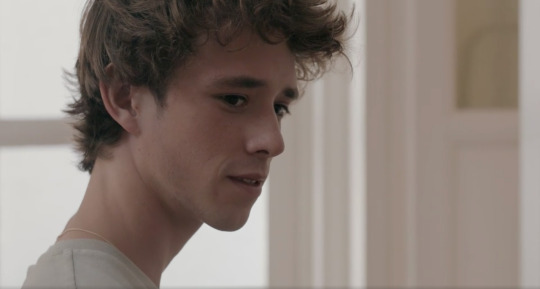
°
Zaterdag 14:43
C is for culture:
“Hey, I’m working here” - Teens are allowed to get a student job, as long as they’re at least 15 years old and completed the first two years of high school. The rules around how often they may work, has changed a lot during the last decade. However, nowadays, they’re allowed to work at a lower social security tariff as long as they don’t go over 475 working hours per year. Otherwise, they’ll have to pay the normal amount or even taxes if they surpass a certain income limit.
“No, I was just shopping” - C&A (Clemens & August Brenninkmeijer) is a Dutch chain store of origin with approx. 1,500 stores in Europe. They mostly attract older generations, as their style is seen as a bit old-fashioned and classic. That’s why their popularity significantly dropped in recent years, causing closures in some cities. - A smart move of putting product placement in a youth tv series.
Perfect parallel:
Robbe pulling a t-shirt off the rack to get Noor’s attention in this episode, him using the same tactic with a sweater in the last episode.
Noor sitting on a reluctant Robbe’s lap to kiss him here, Robbe happily straddling Sander to kiss and talk later on.
Oop, there it is, the homophobia / heteronormativity: Robbe again faking that he likes Noor’s sexual advances.
Lost in translation: Robbe’s mom texting him “Ziet ge mij niet graag?”, which could literally be interpreted as “Don’t you want to see me?”, but in this context it actually means “Don’t you love me anymore?”.
Blink-and-y’ll-miss-it: In case you didn’t catch it, Robbe is making a double joke with the t-shirt - saying that Noor is sexy as well as repeating the song on the store radio. Jana’s look at a disheveled Noor reveals that she knew Robbe wasn’t just ‘trying something on’.
Bonus: This season uses a lot of mirrors to reflect Robbe’s emotions and inner turmoil. Even his relationships with Noor and Sander are mirrored within the season itself: he never liked what Noor did for him (waiting outside the school, making out in public, going next level) and he was amazed at Sander doing the same. Mirrors are the perfect way of showing how Robbe has two faces: his ‘straight’ public persona and his struggling inner ‘gay’ self.

°
Zondag 19:59
That’s character: Zoë’s mom behavior is at full force here. When she spots her friends, roommates or boyfriend in difficult situations, she jumps to the opportunity to make them feel better. She instantly defends them, provides a shoulder to cry on, gives advice, feeds them when needed, tries to figure out what they’re feeling, ... Sometimes giving some tough loving too. Zoë just has that caring nature of her own. This probably stems from the fact that she missed out on parental figures and wants to feel needed as a compensation.
Perfect parallel:
Symbolism! Robbe walking away from his mom’s room in a cold-looking hallway, because he’s not comfortable (yet) with the situation. And him walking towards Sander’s room in a warmly lit hallway, since he’s at peace with what’s happening with his love.
Zoë asking Milan if he’s “Playing hard to get?” in this situation, Milan asking Robbe if his clothes say “Hard to get or playing hard to get?” later.
Oop, there it is, the homophobia / heteronormativity: Robbe analyses what Milan is doing with his partner, not really sure how to feel about it.
Nod to the OG: Zoë stating “The only thing you can do now is just be there for her and yes, that you have to wait”, sounds oddly familiar to the minute-for-minute speech by Sonja.
Funny coincidence: Milan making out heavily with his boy in front of Robbe and his salad, might look like a nod to the ‘Right in front of my salad’ meme.
Blink-and-y’ll-miss-it: Robbe’s other (thicker) coat is hanging on a hook in the hallway. Senne’s “If I had have known that, I would have tried harder” indicates that he probably had to retake a year in high school, because otherwise he’d been a student in uni earlier on.
°
Maandag 16:27
C is for culture: “Kwak en Boemel kwamen binnen” (= “Kwak and Boemel entered”) - Robbe is referring to two side characters in the Belgian comic books ‘Jommeke’, who are homeless, lowlife criminals. The main protagonist in the series is the 11-year-old boy ‘Jommeke’. He is clever, honest, brave, loves adventure and is recognizable by his distinct blonde bowl cut. It’s one of the best-selling strips in Flanders, besides ‘Suske and Wiske’.
Perfect parallel: Jens’ first time suggesting toothpaste to jerk off happens here in S3, but he repeats it again during wtFOCKDOWN.
Oop, there it is, the homophobia / heteronormativity: The boys questioning why Robbe didn’t go all-the-way with Noor yet.
Lost in translation: Noor saying “Is dat een eik? Want ik zie veel eikels hier!” has completely lost its meaning when translated. ‘Eikels’ means ‘acorns’, which come from the ‘eik’ (= ‘oak tree’). But ‘eikels’ also means ‘assholes’. That’s why she’s pointing out the oak tree, to diss the boys that they’re actually ‘eikels’.
Blink-and-y’ll-miss-it: Again, the very subtle hint at the beginning that Sander was at the skatepark - checking Robbe out. Robbe pulls the middle finger at the boys hollering. His skateboard has a ‘World Industries’ sticker on it.

°
Dinsdag 14:56
Perfect parallel:
Robbe arguing “A whole weekend on a trip with people you don’t know?” against Noor coming along in this episode, his flirty affirmative answer to Sander’s “Like a weekend trip with strangers, right?” in the next.
Amber and her match making skills again! First, she tried to set herself up with Senne in S1, then Jana and Zoë with Max in S2, now Luca with Aaron in S3.
Lost in translation: “Ik denk niet dat ze daar goesting voor heeft” - ‘Goesting’ is a typical Flemish word for anything that has to do with desire, preference or willingness to do something in any context (work, food, activities, sex, ...). That’s why Aaron answers him with “I had a different impression on Friday”, taking the “I don’t think she has ‘goesting’” in a very sexual way.
Oop, there it is, the homophobia / heteronormativity: The real reason why he doesn’t want Noor to join the trip, is him not wanting to fake his attraction to her. Except Robbe isn’t willing to admit that to himself yet.
Blink-and-y’ll-miss-it: Luca has braces!
°
Woensdag 12:21
Perfect parallel: Noor’s “And then you haven’t even seen the men yet” as a rebuttal to Moyo’s comments about art school girls in this episode, Robbe meeting the beautiful art boy Sander in the next.
Oop, there it is, the homophobia / heteronormativity: Robbe just doesn’t see the appeal in watching women dance, since he’s not attracted to them. But the guys don’t get why he says ‘no’ to the recital.
Blink-and-y’ll-miss-it: Noor is greeting Britt with a hug in the background. Moyo kisses the dance recital flyer right before going outside.
°
Donderdag 07:21
C is for culture: Robbe is making a sandwich with choco spread and speculaas cookies. ‘Speculaas’ (’Biscoff' in English) is a spiced shortcrust biscuit with origins in the Netherlands and Belgium. It’s typically baked for the ‘Sinterklaas’ and Christmas celebrations. Though, it can be eaten as a treat to accompany coffee, thee or ice-cream as well.
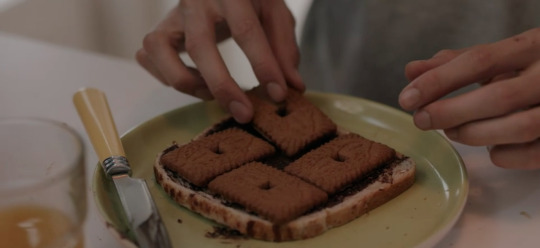
Perfect parallel:
Zoë saying “I think you’re not used to eating healthy” earlier this episode and Robbe making sweet sandwich at the breakfast table, confirming her statement here.
Milan taking revenge for Zoë on a sleeping Senne in this episode, him helping Robbe prank Moyo for being homophobic in a later one.
Blink-and-y’ll-miss-it: Milan’s breakfast is a banana. Senne pulling Zoë into their bed, without her spilling the coffee in her hand.
°
Vrijdag 18:02
Perfect parallel: Luca dissing Moyo’s sexist statements with “Do you actually have a girlfriend? ... I understand why” earlier, her saying “Moyo, then you better take a good look at it, because it will be the last time you’ll see that room” here.
Blink-and-y’ll-miss-it: Zoë and Jana hugging each other outside. Luca giving Moyo a clear wink after dissing him. Robbe didn’t expect Noor to sleep with him in the bunkbed, as his face falls when she says she will.
°
Vrijdag 22:04
C is for culture: "It isn’t because he isn’t here...” - The reason that Senne couldn’t join their trip to the seaside, is that he doesn’t have a fall break. Universities usually start their school year a week later than university colleges, so they’re the only ones who don’t have a vacation at the end of October.
Perfect parallel: Robbe looking at drunk Noor with a sad expression of “Why can’t I just love this girl?” in this episode, him looking at a sleepy Sander with a face filled with love in the last episode.
Oop, there it is, the homophobia / heteronormativity: Robbe trying to pry Noor’s hands away from his body.
Blink-and-y’ll-miss-it: Senne responds with “#metoo” as a joke, referencing the movement and him missing Zoë. Her face freezes for a few seconds to indicate that she is indeed jealous. Robbe’s little wink at Luca.
103 notes
·
View notes
Text
I’ve Never Seen David Lynch and George Lucas in the Same Room at the Same Time…

The thematic parallels between David Lynch and George Lucas are something I keep coming back to again and again, but their careers and evolution have a lot of overlap too. They were born in the earliest Boomer cohort (George Lucas in May 1944, David Lynch January 1946) and had experiences growing up that were colored by the idyllic 1950s, but shifted into a distrust of authority structures that was common for many of their age cohort in the 1960s. They both came of age wanting to do something physical with her hands that felt creative to them in large grimy spaces - fixing cars for Lucas, and painting and installations with a fascination with organic materials, industrial metal, and rot for Lynch. They both fell into film because they were looking for something that satisfied their artistic bent (although film was never a primary aspect of her life to that point). They wound up making a handful of short films over a 3 year period, culminating in a longer short-film that would eventually get them noticed at roughly the same age (Electric Labyrinth THX 1138 4EB [1967] and the Grandmother [1970] for Lynch).
These films netted both of them a patron (Francis Ford Coppola for Lucas, the American Film Institute for Lynch) and started filming their first feature-length film two years after those films. They both got their biggest name recognition bump by films released in 1977 and pulled away from the power of the studio system in roughly 1984. Famously, Lucas offered Lynch a chance to direct what would become Return of the Jedi in about 1981 ( I prefer the story where Lucas does this by picking him up in a Lamborghini - I’ve heard a phone call version too, but it’s not as perfect) and Lynch answered something like “it’s your movie George, you direct it.” They both spent the mid 80s in movie jail, and although they took very different paths in general after (I’ve been emphasizing the similarities) there are still things that jibe in the history - they both reminded people of what they liked about them with a late 80s movie, spent a lot of the 90s on TV projects, did one project around classic radio, returned to theatrical notice around the millennium, all the while generally keeping their own council and disappointing a lot of fans.
There’s obviously a world of difference. Lucas is a left brained technologist who equated freedom with an owning of the means of production. Lynch is it right brained impressionist seeing freedom-as no one ever being able to tell you what to do, acting as a solo artist with collaborators who merge with his sensibilities. Lynch is a production lone wolf, depending mostly on people believing in him and funding him, and losing out in the popular consciousness by making uncompromising art that may not be what the audience wants, meaning funding is sometimes hard to come by. Lucas is like the Democratic party controlling the Congress and presidency - having total power but unable to turn that into what he really wants to make, somehow. The idea of Lynch selling his body of work to Disney is absurd.
But the correspondences in this are telling and help to explain the thematic similarities and divergences. Plus, the differences often relate to the similarities - Lucas identifies with corrupted controlling paternalistic power as a horror of inevitable capture of the individual by larger structures, while Lynch sees the corrupted masculine influence as an archetype, the call coming from inside the house, agency coopted by a collective taint in the universal pattern . But on some level these are the same thing - what is this person I am capable of becoming seeing as I am in control but yet not, doing horrific things? Lucas’ constant commentary on slavery is about hegemony and a systemic oppression he is complicit in, while Lynch has whole pantheons of beings that turn people into vessels that oblate the self and make them act on subconscious programming. Neither probably think the word neoliberalism too much but tend to communicate similar things about it is almost diametrically opposed ways.
The thematic similarities are rooted in a few areas that unpack in to a variety of subspaces which overlap – patriarchal structures as psychoanalytic dynamics (more Freudian father fixation for Lucas, Jung for Lynch), boomer generational failure as socio-first-but-economics-ultimately, the artist as in struggle with larger forces (largely of the self), and an eastern religious metaphysics that is American Christian in flavor. The major line of difference running through this is gender/sex/desire, Lynch being on main with a lot of spiritual overtones of sin, guilt, and “the fall” and Lucas finding this kind of guilt and sin as a secondary phenomenon that is mostly actively suppressed and unconvincing when it shows up; yet both wind up often finding physical consummation at direct odds with art in a gendered creation way (that also links Eraserhead to Age of Ultron and the original Frankenstein). Try doing a psychosexual reading of Howard the Duck sometime.
Lucas’ developmental through line is this: dude in love with 50’s culture but informed by 60s counterculture makes a movie where the young granola-ish revolutionaries win against the fascists in an effort to rewrite society but, having secured rights for “independent spirit” reasons now finds himself in control of something huge and immediately starts making art about boomer men becoming their controlling fathers and then moves on to movies where powerless freaks are the real focus. After a creatively fallow period, he comes back to make a sequel/prequel trilogy that is one of the most misunderstood complicated statements about people becoming what they hate as an eternal cycle at the level of the personal, the societal, the political, the spiritual, the artistic, you name it!
Lynch’s developmental through line is this: dude in love with 50’s culture but informed by 60s outsider/art counterculture makes a movie where the young artist struggles with the idea of a regular life, initiated by fatherhood, which attempts to destroy the artistic spark, after which he enters the Hollywood system and makes an artist as freak movie and a movie about plucky rebels conquering space authoritarianism (that the future of is books about that ending in messianic authoritarianism) and then disavows that system. He then proceeds to make art about subject and object as a supremely gendered thing, in a land that has fallen from grace, moving inexorably towards the idea of eternal cycle at the level of the personal, the societal, the political, the spiritual, you name it!
They both have an idea of the father-artist identified with the abject oppressed, under siege as figure, resentful from being kept from creation, over a career realizing that their “self” is the horrific villain of their own story. For Lynch, this is psychosexual, then spiritual, with a resisted toxic masculine urge to control and overwhelm, often in a violent way. It is the artist’s own urges that get in the way of making art, of desiring in the universe that has an unbalanced power structure from some far off echoes of an original symmetry breaking inherent to the archetypal gender dynamic. For Lucas, it is the realization that the artist in control has a tendency to become the controlling dad and sexual relations are inherently problematic in a political and spiritual way. Real art seems impossible if the artist has control, identifying with the downtrodden is a bit of a lie, happy endings can’t happen not because of the happiness bit because of the ending bit. For both, there is a fundamental flaw in the cycle, which is patriarchal in nature, but Lynch just approaches this much hornier.
The boomer part probably requires the most discussion, but the TLDR is that they are both are crawling out, through Vietnam, from the 50s social order, and grappling with how badly the 60s idealism failed. Lucas does this in the prequels as a big canvas critique of how the social revolution was co-opted by the generation not being able to see its own flaws, of not seeing the system taking over again, an Empire calling itself a Republic. An inability to look in the mirror and really see. The wisest oldest hippie is the only one who sees what’s happening, but is powerless as his apprentices are inevitably spit out, and the next generation has to be raised not by a skeptic but a true believer in “liberal” “democracy” (cynic quotes theirs).
Lynch is interesting here in that he most directly addresses this only in Twin Peaks, but we see more naked reflections, divorced of contemporary politics, in his other works. In Twin Peaks, Ben Horn is the Palpatine figure, who winds up a sweet old man buying off the harm his life’s work and progeny have produced while ignoring the poor and next generation personally. Jacoby the neutered, fried Yoda that eventually slides into Alex Jones territory (the canonical Boomer ethos in a nutshell – “what me” neoliberalism and change the world ideology going crackpot). All of Twin Peaks except for Fire Walk with Me is directly socioeconomically generational (Bobby Briggs becomes a young Republican in season 2, the mill, the trailer park), but the other works are full of class issues informed by Lynch’s age. From Blue Velvet’s suburban kid exploring his darker side by going to the poor part of town through a career of classist low-life encoding (Bob is a denim jacket wearing homeless person, all the covered in grime by the dumpster/trailer park characters, Ronette as the factory floor version of Laura, etc), culminating in Inland Empire and Twin Peaks the Return chronicling the fall of man as partially an (generationally specific in TP) economic fall into a unequal class defined world of needing an opening and leaving the house to labor as where evil is born. TP OS is about how boomers turned out just as bad, the Return is about how we inhabit the world of their ideological blindness.
All filmmakers seem to, at least to a certain degree, bring the question of creation of art directly into their work via distant or close metaphor. In Eraserhead and Elephant Man, Lynch values the spark of art which the downtrodden protagonist is trying not to lose. In Dune, the visionary with a big project that seeks to upend the system (but that we know eventually become something even worse) is a project that fell apart due to studio interference. Blue velvet is about the act of watching awakening something uncomfortable in us that is incompatible with normie life (it wouldn’t be weird to say it was about porn). Twin Peaks is about television, FWWM about movies, and all at least partially about closure being a death act in art. Lost Highway is about the artist tortured by desire, Mulholland Drive about desire being central to be eaten alive by the Hollywood system. Inland Empire is about filmmaking as a way into understanding the world on a deeper level (as is its unofficial sequel Inception) to cure its ills. All of this is art’s struggle against power, with an element of the major powers being subconscious forces that control us leading to desires that ablate the artistic impulse.
Lucas' projects have over time been about a young upstart independent filmmaker, losing his soul by becoming successful, and becoming the system, man. He then tries desperately to identify as really not the one in charge, until he admits to what he has become. He consistently dips back into filmmaking as an adventure or a good fight, but he has to set these in a time period before his birth. As in Lynch, having a child is equated with not being able to fulfill the kind of artistic destiny, but Lucas goes further in equating it to an excuse for why the powerful artist goes bad and needs redemption. He had a naïve or-is-it canny motif focused on the short inhuman outsider, often related to music or primitive settings (often with wooden cages) as a recurring thing for a while. These characters are often wise, or at least no filter tell-it, and are similar to the Elephant Man. This is a trope, sure, the wise different wavelength other, but there is also an identification of the artist at knowing and right yet impotent and a clue to the author’s metaphysical system.
Lynch is the mainline protestant in upbringing and very much influenced by a kind of proto-eastern religion (you can just say the Vedas for shorthand). Lucas is not very religious, but was brought up Christian, influenced by Christian symbolism and became interested in world religion as narrative via figures like Joseph Campbell. Hence, they both gravitate towards some kind of Gnostic Proto Christian, So-Cal zen, Thomas Aquinas “gets” Plato kind of amalgam, which informs their work. Lynch has veered towards an eternal cycle framework, and the very physics compatible idea of something in the past breaking and causing consciousness/suffering, through which we can achieve joy as a counter only through letting go of the self, and the recurrence of ruptures on all scales demonstrating a fractal pattern of hurt and redemption. Lucas also sees a big cycle, but it is one more of human existence as narrative that has a tendency to return, with a little bit of Nietzsche and movie eastern spirituality thrown in. Both believe in a recurring pattern that plays itself out in a way that is terrible, but hopeful, as the struggle is where hope derives from. Both have inherently Christian ideas and symbols in their work but lean back on non-Christian ideas that the Christian ideas have a history with. Lynch has his virgin Mary as the real Christ figure female angels that show up, while Lucas has turnt space Jesus.
Suffice it to say that the tree trial scene in the Empire Strikes Back and the lodge sequences in Twin Peaks are a very good place to start looking for how the two auteurs meet. Compare Anakin/Luke Skywalker to Mr C, look at the 90s turn they both made, register their seeing the “sleeper must awaken” of fiction being terribly fraught, compare the force vs. the universal field, the way their relationship status and partners carve their work into eras, and their continued existence as mainstream experimental filmmakers.
26 notes
·
View notes
Text
Thoughts on Petshop of Horrors: Wandering Ark volumes 1 & 2
(also on dreamwidth)
HOW did I manage to miss the translation of my long-awaited Papa D PSOH series?? I've been stalking it ever since I found the announcement and somehow the fact that @ruthlessnightsscans already put out the first two volumes completely went past my head.

Obviously I had to read it right away, sleep be damned.
this is the edited version of my brain thoughts after i managed to get two sleeps and calm down a bit or it would be a lot more incoherent
The art: the initial pages really remind me of the old art! Unfortunately it goes back to the roundness prevalent since the Shin series (which has only become even rounder with time) not long after. That art style is also a lot less dynamic than the original, I find. It's a bit of a problem on scenes that are supposed to have some tension caused by movement. This is nothing new since, like I said, Sensei has been using this art style since a good while ago. I really miss the original art though. It had a major nostalgia punch to it and a lot more feeling as well.
-- First chapter: "I am on a journey with no destination in mind" just say you're on vacation and go off I guess.
Papa is... weirdly easy-going. I want to say it's because he's not yet mad with grief and his son being taken away and so on, but the glimpses we saw at his time in university definitely didn't paint him this soft. There's no edge to him, on this volume or the next.
Regarding the story itself, I can't say I loved it but it’s not the worst out of all of them (there are four in total between these two volumes, and a third volume is on the way). I liked Koushun's character, but Seiyou annoyed me, especially when he presumed to know what she wanted (or perhaps he didn't presume, but decided for her what was better anyway) - something like I Shall Revive This Species So Breed In My Name Okay Bye. Note also that while Koushun was willing enough to marry (thinking she was marrying someone else but that's another point entirely), the groom himself came in chains. And then Seiyou... locks them in together? Great. Just great. Very conducive to a loving mood indeed, locking a woman with a potentially dangerous stranger who might cause her harm and telling them both to fuck (note. the. chains. you don’t put chains on someone you think is harmless; they never put any on Koushun even when she attacked Seiyou). I was afraid for her when it cut to another scene here, with the last we saw of her being pushed against a wall and being told by the groom that it seemed that he would have to make a child with her. "Rather than hate each other, I want to break that curse"? Seiyou, sweetie, that is NOT the way to make them not hate you. ((The reveal that Koushou is some sort of creature - very PSOH-y - does not help, since putting two wild animals together without them being used to each other is perhaps even more likely to them killing/harming one another.))
MAJOR little mermaid vibes on Koushun standing over a sleeping Seiyou with a knife.
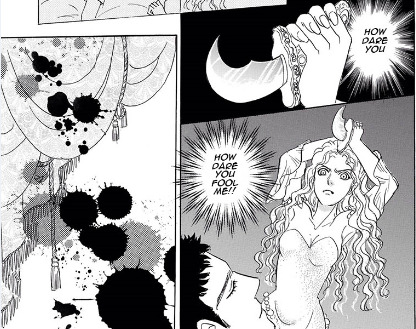
There are quite some parallels with the D species on this tale of bloodshed and revenge. The Ds could stand to learn from this, though historically they don't. "Even if you kill the third prince, the Kagetsu people are already gone. They won't return." Papa himself says that 'winning on the last available tile' is a waste of time, which really resonates with his research into reviving lost species and the issues of his own kind. A reference to the health of descendants when no new blood is introduced is also made here, which might or might not point to our D depending on where in time this Papa is from.
--
Second chapter: it's... frankly, super choppy. The story is all over the place. On the author's note, Akino herself says that it's a challenge to put the whole life of that empress in 57 pages, and I have to agree. Either it should have been cut to the REALLY relevant parts and worked on them some more, or be discarded in its entirety. It's too rushed. The whole first part was unnecessary: it could have started with her already working at the palace or being chosen as a concubine, and then made references to her previous life in her thoughts instead of wasting several pages on it when that backstory won't be going anywhere (except for some references to Hakubun whom she sees on that other actor - who dies like, two or three pages later, so that's that on that). I do like Ranji herself as a character: she's clever and quick to pick up on things. Her life is just a series of tragedies one after the other, unfortunately.
Papa D is some sort of benevolent helper in this chapter for some reason - this pattern repeats somewhat on the next chapters, but on this one there isn't really anything to gain for him at all, other than perhaps his dubious acquaintance with one of the concubines/future empress, which wouldn't really hold much weight since he met her ?once? apart from near her death.
And then, somehow, the initial Papa D in this chapter was actually Sofu?
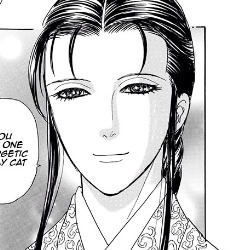

Sofu???? I'm calling bullshit. As far as we know - going back to Sofu's own series and flashbacks on the original PSOH, even - Sofu never had a hairstyle of that length, and out of our three known Ds (new!D excluded) he's the one least likely to help a human just because. The ark is also said to travel through space and time, so I'm saying that's Papa D and that's it. Fun aside: on this chapter, Papa says he's the "third generation", meaning that on this series he's probably the youngest existing D (and by inference our D does not exist yet).
Also, some issues with in-story continuity here: when the last emperor dies Ranji still looks fairly young and the emperor-to-be is three years old, a couple pages later she looks a lot more aged but the new emperor is still three years old. To be honest, I think the story would have been tied off much better if A-chan had some connection with Hakubun or the eunuch instead of each having their very brief, individual emotional connections to her - which, in turn, doesn't really make them memorable. The "wishes" thing was interesting, really called back to the old PSOH tradition with the mystical pets and bittersweet be-careful-what-you-wish-for endings.
--
Third chapter: I think, overall, this was probably the one I liked the best. Can't really bring myself to call it my favourite though, since none of them even begin to compare to the original PSOH chapters. I cackled at the "jawline is too sharp" dialogues and thoughts: with this art style EVERYONE has the same round jaw as every other character, and it's the furthest thing from "sharp" possible.
With this series it really seems like Sensei is giving more focus to trying to tell historically-accurate stories rather than focusing on the stories themselves, as there is a huge amount of superfluous historical information to be found in these volumes.
The empress Elizabeth reminds me of Sofu, in truth. She won't "mind" affairs and the like (read: she will hate it but ignore them) as long as it works towards her ends. Her taking away the newly-born child is a huge parallel to Sofu regarding both Papa and D, and D and new!D. Child-snatching FTW! That being said, I actually kind of liked her, ruthless as she was: the whole reason why Sophie made it as far as crown princess was because Elizabeth valued her hard work. You don't get to hold an empire together without having a steel spine and a cunning mind (or people to do the work for you I guess, but here it doesn’t seem to be the case).
I hate that Sophie had to change even her name and religion to fit her new reality, accurate as it is to history. That sort of thing always messes me up (throwback to the Nazi/teddy bear chapter of the original PSOH series, where there was also a name/religion change for the sake of survival). Not a reflection on the author in any way, I just hate that this is something people had to go through. As something I hated that kinda does reflect on the author, though, was the ugly = terrible association with Pyotr and the maid. Sophie/Catherine is initially said to not be beautiful but she's not depicted in the same way those two are at all.
Papa's benevolence is thankfully offset this chapter by the fact that he does have something to gain here. For some reason Ds doing things merely for the goodness of their hearts kind of rubs me the wrong way unless it's D during or post-Leon.
Most PSOH victims clients: oh a pretty person! WHAT DO YOU MEAN IT'S AN ANIMAL Sophie/Catherine: a dog you say? sounds kinda hot ngl
Gotta respect how she just jumps straight into the dog affairs. The take-back of the empire was also nicely executed, and I'm always here for ladies in traditionally male clothing.
--
Fourth chapter:
This is linked semi-directly to the third chapter by virtue of the amber room Papa D craved. Marks also the second time that Papa takes a human on board of the ark.
D, circa end of original PSOH, a single tear rolling down his cheek as he watches Leon plummet towards the earth: Humans have not earned the right to board this ark. Papa D: I'm gonna go for a joyride and take along this human and this human and this human and this human and--
Papa really gives Doctor Who vibes on the ark matter. Travelling through space and time, occasionally taking human companions? The one for this chapter - who I'm guessing might be a cameo from one of Sensei's other series, since I didn't recognize him and there was no backstory for him on the chapter - even has era-appropriate wardrobe changes (at least assuming it's the same person and not just someone who looks similar scratch that they have eyes of different colours so I guess Papa has been giving rides to delivery men now), the second of which leaving me very ??? as to WHEN he is from.

That last Look(TM) reminds me a of Leon Orcot, between the long ponytail and the clothes resembling the ones Leon wore on the last chapter of Shin PSOH (in PSOH time, that would have happened approximately 15 years after the end of the original series, meaning that Papa was already long dead then. Unless Leon's style was just stuck in time, which is also very possible).
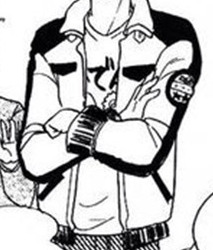
It might or might not have endeared him to me for that exact reason. What can I say? I'm a sucker for Leon Orcot, and apparently also for characters that visually remind me of him. ANYWAY.
Why another Nazi-era chapter??? Sensei plz. One was already enough on the original PSOH - it wasn't anywhere near my favourites back then, either - and the fact that this one mostly followed a Nazi colonel didn't help either. Here we witness them tearing down the amber room, "reclaiming" art from all over the world, a father's heartbreaking sacrifice to “save” his daughter’s dog, and Papa D coming to meet the Nazi dude. One would expect the Ds to avoid genocidal racists given the fate of their own species, but apparently the Nazis were relevant enough for not one but TWO Ds to interact with them. Oh well. Either way, I really don't like how Papa appears to not care one way or another - when the D for the original series interacted with people he didn't like, his mask was really fairly obvious (at least for the reader). Perhaps Papa simply has a better mask. Perhaps those nuances were lost to time and round art styles. Perhaps Papa or Sensei just don't give two shits. Guess we'll never know.
EVERYONE seems to comment on the flavour of Papa's tea: it's 4 out of 4 so far for these two volumes, and in this chapter in particular it seems as if it's laced with some kind of truth serum - it seems to be Papa's version of D's (and possibly Sofu's?) incense from the original PSOH. A reference to the original PSOH's Nazi chapter is also made here, with Papa mentioning that Sofu was on friendly terms with Eva Braun: this implicates that in this time they were in closer contact (not surprising since Sofu probably hasn't stolen his still-non-existent kid yet).
The colonel seems to value art over human life - surprise surprise! - so he kills his own comrades to keep the art "safe". A stomach-turning moment comes where they find human golden teeth being kept as treasure, which Papa mentions remelting to turn into golden nuggets. Why, Papa/Sensei, why? It's in poor taste, even if you're testing the colonel the way D did with some of his clients on original PSOH.
At the very least an eerie moment comes next where Papa explains that dead creatures can be revived using DNA. "Even dead people?" Cue Papa's all-seeing stare directly into the reader's eyes (and presumably the colonel's as well) with a backdrop of an inverted black-and-white multitude of graves as he says that future is not very far. Colonel almost shits his pants, with reason when you consider the amount of people the Nazis killed off that would presumably come after them. This almost forgives the teeth comment, and it's probably the first moment in these two volumes when we see some genuine emotion on Papa's face (on this page and the next), creepy and maniac as it might be.
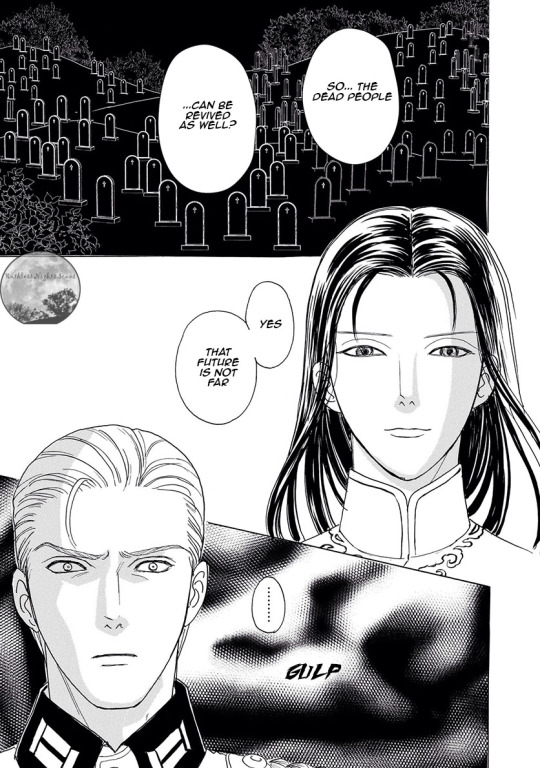
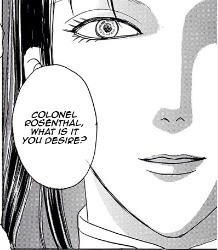
Colonel dude has spent the whole chapter justifying everything under "orders of the fuhrer" so far. Then comes the moment that Papa calls him out by saying that the orders were to burn his sweet dear art so that it wouldn't fall into enemy's hands, and it's here that we see how much of an hypocrite the colonel is when he doesn't want to follow those orders. Suddenly it's "treasures of mankind" (even though he's been stealing them left and right) and the fuhrer is "a fool" (even though he's been using his orders and his "greatness" as justification for everything).
Suddenly, Papa's companion! Who the heck is that! Shoots him! This is someone whose family was killed by the colonel (directly or under his orders) or so he says; he's gripping a piece of art we don't get to see, which is presumably the reason for those deaths. Now in the future! A guy who looks a bit like that other man who shot the colonel, but who I'm not 100% sure if it is or is not the same person because the round art style makes everyone look alike Someone who is definitely not the same guy because his eye colour is different (and who's dressed in a sporty outfit with a long ponytail, which I've mentioned kinda reminds me of Leon) looks for the amber in the place the art was stored, alongside Papa. He flies on the ark (all these humans on the ark, Sofu would have a conniption!) and reminds me of Leon once more while being shouty and holding on to the main mast for dear life.
The sacrificial father mini-plot also gets resolved with the dog returning (but not the father himself) along with a picture with that family. Which is presumably the picture the other dude who shot the colonel was holding, which begs the question: how is he related to them? He doesn't look like any of them, but he did say the colonel killed his family while (presumably) holding that same picture, so hmmm. Maybe he's the dog, colour-scheme aside? But apart from the father, the rest of the family seems to have survived, so it's kind of a strange thing to say since that sort of wording usually means more than one person. Even if he is the dog (my money is on that option), it's not exactly obvious to a reader who's not looking very closely. Some loose ends there, or at least ends that don't really look like they're tied together at all.
"No matter how long winter is, spring will come." Fairly hopeful final words there, Papa D. These echo similar ones spoken by D at the end of Shin PSOH, after running from Leon once more ("someday, the season for returning will come"): perhaps both these Ds are not as pessimistic as to their future, at least at this point? Poor Papa definitely had a change of heart between his series and the ending of original PSOH, unfortunately.
--
General thoughts: Sensei hasn't quite managed to replicate the feeling of the original PSOH just yet. The storytelling feels a bit shallow and rushed, though the pacing improved from the first volume to the second. There's also very little focus on Papa himself for some reason: he's more of a background character on his own series except for the fourth chapter, which is a very strange narrative choice. In part this might also be because he doesn’t have a permanent companion to discuss/argue with like in previous iterations of the PSOH series. I wonder if the third volume will continue on this trend? I wish it’d delve a bit more into Papa, but either way it’s still nice to get some more PSOH content.
I've heard Vesca will make an appearance next volume, I'm so excited!! Out of Shin PSOH, my favourite chapters were Leon's (surprise surprise!) and the ones with Papa and Vesca on their university days. Papa definitely seemed a lot sharper there, which I miss here - I feel like Sensei has been smoothing out all their edges like with the art style lmao, and in turn it makes them feel a bit lacking since the Ds are not meant to be bland and forgiving and easy-going, at least as per their original portrayal. I've also seen sneak-peaks of Leon and D from author notes of the next volume so I can't wait at the chance to weep at the slightest panel of my son Leon.
A final shoutout to RNS for continuing the PSOH translations! I really can't thank them enough!!
#PetShop of Horrors#pet shop of horrors#psoh#hyouhaku no hakobune hen#papa d#wandering ark#psoh wandering ark#psoh ark adrift#petshop of horrors hyouhaku#howl rambles a lot
24 notes
·
View notes
Text
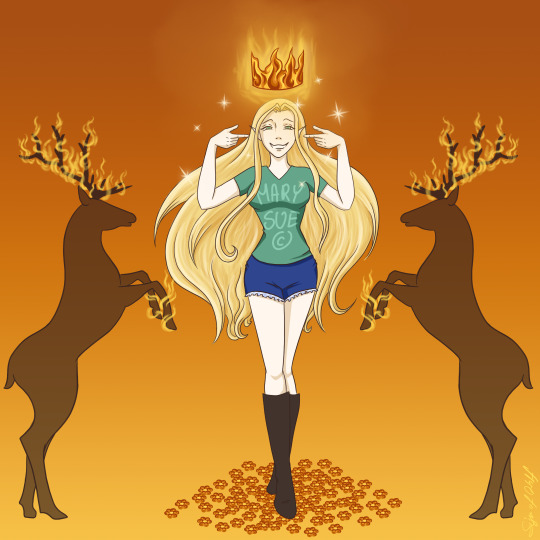
Kingdom of Ash by Sarah J. Maas – book review
Series: Throne of Glass #7 Genre: YA, Fantasy Theme: Fae, magic users, war Warnings: mentions of torture, imprisonment Star rating: 0,5/10
Why did I pick this up?: I wanted to end this horrible series once and for all.
[Heavy spoilers ahead]
To make myself clear, before this book I quite liked this series. It wouldn’t place in my top 100 books, not even close, but it was a pleasant pageturner to listen to in audiobooks when working.
Language
Let’s start slow. I lack the words to express how much I hate the words ‘male’, ‘female’ and ‘mate’ after this series. Not even gonna try to express my trauma. But these 3 gems aside, Sarah J. Maas needs a dictionary. Or compress her work to a manageable size. Everything sang, Everyone melted, Every man roared, Every woman trembled, Everyone was unleashing themselves at least once a chapter (number of chapters: 122) ). And now I know definitely too much about Yrene’s ‘womb’. I know so much…
Dynamism
I thought that was a book about a war with heavy action content. Oh boy, I was wrong. This 984-pages monstrosity has maybe 5 pages of action. If you squint.
Every sequence, where by design action should take place was followed by one of two scripts:
Few sentences of action and then a few pages long internal monologue. Often repeated with the same character after the next few sentences of action, or with the next character and then the next (sometimes the first character made a second appearance and then everything would go all over again). And the word ‘character’ used in these sentences is not because I’m rambling. This book is written that way!
Few sentences of action and then action stops, and we are graced by a few pages long conversation. In the middle of a battle. Or spying. Or in Erawan’s chambers, when his castle is going down, and he is running up the stairs...
Time
Leaving alone the fact that apparently all series took less than a year (till this book I estimated the plot for about 3 years, Wiki told me it was 2, but Maas knows best), because that is a can of worms in itself. Time in this one? I honestly have no idea. There were many ‘few weeks of travel’ parts with two main groups of POVs. Personally my only time indicator was ‘Orynth won’t fall till Aelin gets here’. But nothing just fit. And I saw Lost Song when in the last episode we as the audience realized that our two POVs parallel storylines are in reality millennia apart. Lost Song made sense.
Emotional loading
… there wasn’t any. Really, it was like reading a milk label. Every time the scene was potentially emotionally impactful, Maas went ahead to overexplaining EVERY. GOD. DAMMED. THING. And it was abso-fucking-lutely everything. ‘Emotional dilemma? Let’s current POV explain it! 2 pages should be enough… Damn maybe it wasn’t enough. I know! I’ll switch POVs and explain it through the other character!’ <= My impression of Maas’ thought process. I’m fairly sure that the record was 7 POVs explaining the same thing in the row, but I was blacking out a little, so I cannot be sure.
And if that wasn’t enough, this book had a second way to defuse tension: random-plastic-repetitive-badly_written-smut. Really badly written and really repetitive. How could you not feel the spicy bits, when Manon (cruel, self assured 100+years old witch-queen) reacts the same in bed as Elide (20years old, virgin, ex-slave). And the rest of them were the same, there weren’t ANY distinctions.Just copy-paste.
The next point in current case: Someone died, it was impactful, I really liked the character, so I got sad. But then 2 of our characters came out of the room with a body, and after a paragraph of grieving they started making out, and then I was regaled with 2-pages-long description of melting cores. That was the place then this book stopped being badly written, and started being distasteful.
Characters
Remember when I was writing about switching POVs (which is 15(!!!) In the whole book. Oh and an omniscient narrator in places when our current POV was grieving too much to overthink something, but Maas still wanted to inform us about something)? They were all savagely murdered in the worst way: character mutilation. Somewhere between books our maybe-not-that-original but colorful and interesting characters became carbon copies of each other. I have no idea how many times I didn’t realise there was a POV switch. The only indicator was a change of pronoun, or when Maas was telling us the name of a current narrator. These were the only ways. And if you can't distinguish if you are in Dorian’s head or in Manon’s, that is the sign of a really BAD writing.
Romance
…there wasn't any. In all this book there wasn't any naturally progressing romantic scene. There were Maas’ endgame pairings which were sexing or pinning. As the author Maas loves to write about soulmates. And it’s not a bad thing itself. When I want some fluffy story I often tag ‘soulmates’ in AO3 and voila, +10 to good mood. But God above, it is not cute when every pair you write about are ‘true mates’ just BECAUSE. It is the only way Maas sees a relationship, as a fated pairing, written in the wake of the universe by the God himself. There is no choice, nor the work to put in it. They are the author's OTP and that means that they are perfect and they should have children right now. Point in case:
Guy was treating a girl like a shit on his sole, including throwing her naked out of tent, on a snow, with their friends present, all the while abusing her verbally in a worst way. But it’s okay, because when she almost died he realised his mistakes and apologised. Two scenes later, he was forgiven, because... fated mates?
The pathos
I know that many people don't like this type of scenes, but it's not my case. I’m reading by picturing images and not repeating words. I like sequences that I can imagine to be grand and glorious, even if they are a little corny. That said, the pathos scenes were the most disappointing ones for me. Maas likes to write parts that are more picturesquely exalted than logically possible [point in case: meeting of 5 armies/forces in the random patch of sand in Empire of Storms, and it being painted as ‘an Aelin’s great plan’. I laughed myself silly at that. But not taking logic and all the plot holes into consideration that was a nicely looking scene. In Kingdom of Ash that wasn’t the case. I would say that the author wanted to paint us a renaissance painting every 20 pages or so. In my opinion, every time she failed miserably. Each and every of those scenes was or to farfetched to be even remotely realistic, and evidently written only for a sake of the picture, or just plainly stupid.
Example, and it’s so priceless a scene, that I just need to share it: Battle of Orynth, 25th day or so (time in this book doesn’t exist), the 13. sacrificed themselves (like thousands before them but hush). And then, time stops: grieving Manon is going through the city, they open the gates for her (yes, the siege is still on), she goes to the place where they died, after her come out all of our main heroes, and half the city itself with ‘flowers, rocks and precious possessions’ and they lay it there in a tribute to these brave (evil till 2 months ago) witches. I honestly can’t remember when was the last time I saw such an abstract scene. It’s a material for an essay in itself. No, I could not take it seriously.
Additionally, it's hard to make an impact as every damn sentence is grand and lofty. In the end it became truly pathetic, Aelin vs Maeve was unreadable.
Character deaths:
Let's make a quick count: main characters in a series at the start of KoA: 12 secondary characters in a series at the start of KoA: 20ish minor and total background: a lot more
Death count: main: 0 secondary: 3 minor: 2 (11 if we try very hard)
Resurrections: 1 (possibly 3, but not gonna analyze it)
Did you feel emotions of this impossible war against this all-encompassing, all-powerful, invincible, immortal, cunning Evil with armies from 3 continents and 2 worlds? No? Me neither.
Oh well, but there were a lot of deaths of ordinary soldiers. I’m quite certain that all of Terrasen’s army was at least twice brought back to life for them to die in these numbers.
Logic or lack thereof
Oh, and let’s not forget about the Deus ex machina army of unbeatable, magical elves on wolves, from legends, living for the past thousands of years in the unreachable lands of the north, because they managed to run from the surprise attack 10 years earlier. Did I mention that they came from portals, which the whole book was telling us were impossible to make in this scenario? After the previous saviour army was already fighting there for a day? And that Aelin didn’t know they would come for sure (how did she contact them again?)? Even though they were waiting in the full armours for these portals? Ah, and also: that army didn’t do anything. They just came and fought for maybe 4 minutes. And there were just so many things like that!
And if we’re on the topic of armies I present you: ‘My favourite absurd-list in the series: allied armies’.
(As a comparison, in A Song of Ice and Fire by J.R.R Martin, in 7 kingdoms of Westeros, at the peak of war there were 7 forces present, but not all were even engaged in a war.)
First the ones that made sense:
Armies of Terrasen’s Lords (counted as one, not gonna nitpick)
The Khaganate army (also counted as one)
Galan Ashryver’s armada
Whitethorn fraction
Rebel Ironteeth witches
…should Dorian be counted as an ‘army’?
And there were some that did not:
Ansel of Briarcliff’s army
The Silent Assassins
Mycenians
Wild Men of the Fangs
Army of magical elves on wolves
And the ‘I don’t even know’ category:
Crochan witches
Overpowering and overreaching
Section title tells it all. The stakes were too high. I was honestly waiting for Aelin to become Super Saiyan and start to throw planets at Maeve and Erawan. I won’t spoil if this happened.
In my opinion it could be a really great series, if our list of villains ended with Arobynn and King of Adarlan, and the list of Aelin titles with an assassin and a princess. We could have had two main fight plots: one emotional with Arobynn, when Aelin would have to face a damage he had done to her, and overcome it. And the second one, with freeing Terrasen from Adarlan’s rule. That’s it. There was an asshole, power hungry king, who feared magic and wanted to rule the East part of a continent. A lot of plot, but not so much that we stopped to care, or didn’t have time to cover everything. We could really get to know what Terrasen and his people were like and not JUST GET TOLD that it was ‘the greatest place in the world’ every damn 20 pages.
Plus…should Dorian be counted as an ‘army’? It's a REALLY valid question.
Climaxes
IIf I have to write a list of things that disappointed me in this book, this review would be thrice its current size, but one of the worst grievances I have is the complete lack of acknowledging the plotlines that had been started. This book series has overall 4 372 pages (not counting novellas) and 12 main characters (still not gonna address this). All of them had their storylines and arcs but if they weren't tied up in the previous instalments they wouldn’t be in this one. I get it, Maeve and Erawan got beaten (in an extremely unsatisfactory way) but they were only a background in this series' plots.
Aelin Well, Aelin was one of 3 people (+2 paragraf-long insertion from Nesryn and Chaol) who got their own POV’s after the battle (second was technically Rowan, who was ‘Aelin’s POV outside of Aelin’.The third Dorian, who got almost a full two pages). And from this we got that: she got crowned, Aedion got his bond and that Maas have no idea how the city looks after weeks of siege. In her case what angered me the most was ‘Terrasen is my home’ subplot. Only in this tome we read at least 3 times that Aelin will be okay with dying, if only she gets to see Terrasen one last time, or if she get to die on Terrassen soil. But you know what? Maas forgot to write the scene where Aelin actually ‘comes in’.
Mannon Didn't get her own POV after the battle, but here’s what we’ve got: She is going to the Wastes with Croachans and Ironteeth. Whait. What? Yes, that was the ending of this 500+ years of feud. They fought together and they decided to unite their two species, completely forgetting more than half a millenia of slaughter. I can only hope that there were at least some talks behind the scenes… NO! F*** NO! This isn’t how it works!
Rowan, Dorian, Chaol, Yrene, Lysandra, Aedion, Lorcan, Elide, Nesryn, Sartaq Lived happily ever after
Secondary minor and total background characters Survived (I acknowledge that they would be ignored in most books’ epilogues, but this abomination is almost 1000 pages of nothing!!).
Good Scenes
That saying, this book actually had 4 good scenes:
Crochan witches go to war - gathering-forces-to-fight trope, which is my *love-always trope* so I’m not even sure if it was relatively good, or if I’m just a slut for this trope. It was still only a paragraph long though.
[recurring] The children’s tale Aelin repeated to herself to remember who she is.
‘Lorcan Lochan’ - the only marginally funny scene in the whole book
I actually found Darrel making Evangeline his heir charming. Even if circumstances were far-fetched at least.
But the words crime of this book? It was agonisingly, mind-numbingly boring. If the overexplaining and repetitions were to be taken out I highly doubt that there would be 300 pages left.
For these 33 hours of audiobook I suffered through I give it half a star. Because Abraxos exist.
Please see my garishly accurate cover on my instagram! You can also like it there :D
instagram | goodreads
#book#book review#bookworm#review#signofwolf-book_review#opinion#throne of glass#throne of glass series#throne of glass spoilers#sarah j maas#kingdom of ash#aelin galythinius#mary sunderland#tog#fantasy#fandom
4 notes
·
View notes
Text
The Essential Dykes to Watch Out For, Alison Bechdel

Rating: Great Read Genre: Graphic Novel Representation: -Lesbian ensemble cast -Racially diverse ensemble cast Trigger warnings: Reclaimed D-slur, animal death, cheating, divorce, cancer, casual transphobia, biphobia, and ableism, difficult topics ranging from war to AIDS to 9/11. Note: Not YA; sexually explicit
If you’re familiar with Fun Home or Are You My Mother? you’ll know what I mean when I say that Dykes to Watch Out For is no entry level work - though Dykes to Watch Out For is difficult for different reasons. While Bechdel’s ruminations on her childhood, psyche, and sexuality require a decent amount of outside reading to be fully appreciated, Dykes to Watch Out For requires an equally rigorous knowledge of the political landscape of the past forty years.
But on the other hand, the more things change, the more they stay the same. The wars, elections, discourse, and protests are not so unfamiliar. If I had to pinpoint Dykes to Watch Out For’s continued importance to lesbians today in just one idea, it would be this: “Against the sweeping backdrop of history... everyday life pretty much continues” (371).

It’s not a major theme of the work, yet it is the shape of the final tapestry. Politics, discourse, trauma, and sickness make their ravages, and here we all are, much the same as we ever were 10, 20, 30 years ago: this pattern, far from intentional, emerges from the tide-like flow of 30 years of comics. But it’s why Dykes to Watch Out For is so special. And we have the privilege of going back to look into that reflection of the 80s, 90s, and 00s and recognize familiar features. The political scenery may be different (or, honestly, not so different) but has daily life changed much?

I first tried to read Dykes to Watch Out For as a curious high schooler, and my eyes glazed over. Without having absorbed enough recent history through cultural osmosis, nor having developed a taste for gray morality, I just didn’t get it. Two characters would have an argument on the page, both of them would make provocative points, and then Bechdel would refrain from telling her reader which was in the wrong. Neither character was a straw man; it almost felt like Bechdel was arguing with herself, trying to decide what was right - if there even was a right answer. I couldn’t wrap my mind around it, especially when the vocabulary and context were both tantalizingly out of reach.
Reading now, I found the once alien discourse all too familiar. The same exact discussions were being had in 1985 as are being hashed out on Twitter. One of a hundred examples is whether gay marriage is a buy-in to the privilege bestowed by heteronormativity. Bechdel asks if marriage is a patriarchal model that can be salvaged, but she doesn’t have an answer for you, just a prompt to chew on.
Another example is Bechdel’s discourse on the outliers of lesbian spheres: trans lesbians, trans men, genderqueer people, and bisexual lesbians (Would you believe that term is used in the text - and equally as contentiously?). These are conversations we are all very familiar with. However, this discourse is especially interesting in a work that took 30 years to write. The reader combs through 30 years of metamorphosis in just a handful of hours. Bechdel’s tongue-in-cheek “Whatever will they come up with next?” is printed in the same volume with genuine consternation on who is allowed to be a lesbian.
Trans women start as a punchline. But on most topics, Dykes to Watch Out For tends, eventually, to stop itself to re-evaluate. Thirty years later, one of the main characters IDs as genderqueer, finds herself meeting trans men and doing drag king shows, fights with her friends over their trans exclusivity, and in the end, ends up advocating for and co-parenting a teenage trans girl, who ends up a main character in her own right. It’s one of Bechdel’s firmer positions on right and wrong, although she doesn’t hesitate to mouth the opposite argument, too.
Plenty of sympathetic characters say transphobic things which just hang in the air, unaddressed. It’s maddening - but in sticking with the material, I got to see the characters who flubbed the pronouns and complained about gender confusion eventually get in line - changes which are not commented upon and happen so gradually in the thirty years over which the comic was written, that they mimic how change happens in real life. In our own lives, change may seem impossible, but then you blink, a decade has passed since you first came out, and half the homophobes have come around. Much the same for Dykes to Watch Out For, which is almost as much a memoir as Fun Home (albeit of Bechdel’s discourse rather than her life). I think every cisgender lesbian should read it - it’s a powerful antidote against TERFism, not because it lays down the law, but because it meets you where you are and gives you the chance to say your piece without ridicule, before taking you by the hand and showing you something kinder. If Dykes to Watch Out For has anything to teach us, it’s that hard lines in the sand make you look like a dick thirty years later. Take Sparrow’s story arc. Mo, Lois, and Ginger are thrown when their friend Sparrow starts dating a man. They say some rotten things about how betrayed they are, how they don’t know if they can trust Sparrow anymore, or her politics - but when they are overheard, the “discourse” suddenly becomes real. That’s their friend, and her feelings are hurt. What else can you do for your friend who has spent decades of her life as a lesbian, whose identity is culturally and socially interwoven with lesbianism, and who identifies as a bisexual lesbian - except love her?
A frequent lesson is that anyone can be reactionary - even the left-est of leftists. Years later, when Sparrow faces an accidental pregnancy, her friends overwhelmingly pressure her to keep the baby, not because of their politics, but because of their excitement - yet the impact, if not the intent, is anti-choice. It’s ideas like these being brought to the forefront that make Dykes to Watch Out For something special.
In her introduction to the book, Bechdel frets over both keeping up with the changing current of discourse (XVI)

...and her own role in shaping that discourse (XVII)

But her work speaks for itself: if we are to do right by one another, we must prioritize one another, not the rules. The same conversations will be had again, and again, and again, from 1983 until we all go blue in the face. We can’t control someone angrily shouting into the room (or Twitter timeline) “but WHAT about BISEXUAL LESBIANS?” and the chaos that follows - but we can accept that someone will shout it again in twenty years, and that the following chaos will be so nearly identical to the previous chaos as to challenge whether it is chaos at all, or just the universe putting on a matinee performance of the same old song and dance. Is it useful to put on your tap shoes and sing along? Or do you end up hurting the feelings of a genuine friend who just happens to be one of the outliers this time around?
Dykes to Watch Out For is thought-provoking (as you can see, my thoughts have been well and truly provoked), occasionally in poor taste, but mostly surprisingly sympathetic, both to its more marginalized characters, and to its wrong-doers - this comic doesn’t have any villains. The initial gag, that Bechdel would write a catalog of lesbians like a lepidopterist giving clinical attention to a series of specimens, works to her favor. There are no bad lesbians and good lesbians. At least, not essentially. This approach lends Dykes to Watch Out For more staying power than it might otherwise have had - it’s relatable. You know these people. You’ve had some of these arguments, and hurt each other’s feelings over them. Your friends live in the mildewy house that’s kept at 64 degrees in the winter, where you’re as likely to be walked in on in the bathroom as not, a home where everyone in the friend group feels free to stop by.
Here in the future, we have the immense privilege of watching how these parallel lives to ours play out. The Essential Dykes to Watch Out For may be a comic for a different generation, but Bechdel has given us something fascinating from both a history and literary perspective. She has put to paper a sprawling epic about lesbians growing from their twenties to their forties, getting married (or not), progressing their careers, having children, having PTA meetings, having affairs, and doing civil disobedience with their kids. Rarely do we see the map from here to there laid out so meticulously. I read this book voraciously, both the earlier chapters that relate to life as a new adult, and the later chapters, which serve as a window into what life was, and could be.
For more from Alison Bechdel, visit her Twitter here.
#the essential dykes to watch out for#alison bechdel#lesbian#great read#graphic novel#protagonist of color#not ya#reviews only
96 notes
·
View notes
Text
treason against kingly youth, pt i of ii
summary: somehow, you survived the 2020 election. now, all you have to do is get a know-nothing white man into the senate. should be easy enough.
pairing: chris evans x reader
words: 3223
trigger warnings: rpf, white dudes doin White Dude Things
ask box / masterlist / commission info / ko-fi

For a moment, just a moment, you allow yourself to breathe, really breathe. One, big breath in that clears the stress from your muscles, drops your shoulders, lets your whole body sag against the decade-old chair that you’re surprised hasn’t crumbled under the weight of your ever-tense body and its corresponding sins.
It’s a mere six feet away that everyone else you’ve worked with for the past three years with – the people you went through sleepless nights, long road trips, greasy food from mom and pop diners with the middle of assfuck nowhere, registering voters and writing up another plan for every fucking thing wrong with America (low teacher pay? Check. Electoral college ruining democracy? Check. Criminalization of homosexuality? Check. Private school sucking the life out of public schools? The monopoly artificially inflating prices on glasses up to 400%? The disparity between the number of men’s and women’s bathrooms in federal buildings? Check, check, check) – each and every person celebrates with wine and whiskey and any other alcoholic beverages they can get their underpaid hands on. It’s not even the cheap stuff, no, this is top shelf liquor. This is D-Day, “we’ve got an hour before the nuclear missile hits” liquor.
There are two times people go this all-out on their spirits – the end of the world, and the end of an election (though, to some, they’re the same thing).
But not you. Never pitiful little you. Pitiful little campaign manager you doesn’t rest, doesn’t get to stop pulling rabbits out of hats and money from single moms and votes out of college students.
There’s three TVs in front of your desk, each playing a different news station and each anchor drowning the others out. It’s a cacophony of white noise, and not because
The only voice, the only singular voice that has cemented itself into this far, previously blissfully unattended corner of your brain. You can hear her, feel her own on your shoulder – you can see her leaning against her old desk nestled in her home back in Massachusetts.
“I want you to be my chief of staff. You ran my campaign better than I could have asked for, and I would be incredibly lucky and blessed to have you run my White House.”
Your own voice rings next, always shakier than the time previous.
“I can’t do that,” your sigh gets deeper each time, too. “You know I can’t.”
Somehow, her voice always gets more confident. It’s one of those things about her, about the way she carries herself. If she’s faking that confidence you’d never know. “I know, but I’ll always tell you that there’s a place for you at the White House as long as I have something to say about it.”
In the sea of blue and red and white confetti and streamers and all the other shit people use to celebrate when their party wins an election, the thick, bleached white of your laptop screen stares back at you more menacingly than any Republican – winning or losing - you’ve ever met.
You’d like to think you are the kind professional that is never caught off guard, the kind of woman who can expect anything. But as the email that’s derailed your plan for the next four years stares back at you, the all-caps subject line feels more like the headlights of an 18-wheeler to a deer in the middle of a highway than an excellent career opportunity.
Still, with malt liquor in hand, you allow yourself a moment to breathe. Maybe, just maybe, it’ll make all of this just a little bit easier.
A little less than five hundred miles away, Christopher Robert Evans is the drunkest he’s ever been, surrounded by the same men he’s known since his freshman year of high school, yelling nonsensically as one of his current senators becomes the president-elect of the most power country on Earth.
The only coherent thing to leave the man’s mouth the entire night is oh so wonderfully caught on a friend’s iPhone and will – quite likely – be posted to some social media site by the next morning.
The video (which you will eventually be seeing at your first meeting with the Boston native) shows him in a Harvard sweatshirt (a university he did not attend), deep blue skinny jeans, and a Patriots hat balanced just enough to show his (possibly) thinning hairline. There, between his two best friends, he screams in his played-up Boston accent at the top of his lungs:
“I’M GOING TO BE A SENATOR, BITCHES!”
But you, back in D.C., are blissfully unaware of the long road ahead of you. So, you enjoy your malt liquor, and your small bit of quiet on election night – a sign of the muted calm before the political shitstorm ahead of you.
You end up not replying to said email the next morning (see: seven hours later after falling asleep in your chair for about five hours and then browsing angry GOP Twitter accounts while cackling into a cup of the blackest coffee you’ve ever tasted for the other two), confirming you’d be willing to work for Christopher Robert Evans’ campaign to run for the current president-elect’s soon-to-be open senate seat.
Or, at least confirming you’d speak to the Evans family to talk about running the campaign of the whitest man under the age of forty you’ve ever seen. Whether or not you ended up attempting to control what is likely another dumpster-fire campaign in a series of dumpster-fire campaigns. Harris is the one that comes to mind, but drawing any parallels between that woman and this man feels borderline offensive.
Plus, her senate run was successful. And she held elected office before that.
Why did you agree to do this again?
Right, you need money. So much money. All of the money. At least enough money that you can be bought from straight under the White House, which just so happens to be the amount the Evans estate offered you in exchange for your services.
Maybe that’s why you’ve found yourself in a conference room in an expensive office building, looking up at Chris Evans as his face turns red and your heart rate picks up.
“I’m Massachusetts’s best choice!” he screams, slamming his hands onto the table – a rich brown you sort of wish you could afford to have in your own home back at the capital. Your estate sale table, even with the coat of white paint you gave it after buying it, still can’t hold a candle to the beautiful grooves and smooth top.
But this isn’t time to yearn for better interior design prospects. Now is the time to put this moderate democrat man-child in his upper-middle-class place.
“Chris, you’re the best choice for an internship for the fucking EPA,” you nearly hiss. “You’re in the intern in Vice who watched Dick Cheney make deals with those fucking oil businessmen. You’re the shiny faced bastard who watched the world burn while listening to a Walkman. Do you understand me?”
His teeth are barred like he’s about to bite at your face; luckily that man comes with an electric collar and you’ve got the controller.
“Your biggest qualification is you got a five on the AP Gov exam. You have a single living family member who has held elected office in the last five years, and he was in the House of Representatives. The House! He wasn’t even in the chamber you’re gunning to be a part of. You were an econ major with a minor in, what? Poli sci? At a mid-tier university because your family doesn’t have Kushner money to bribe your acceptance letter out of a better one. Your main job after college was working as an accountant for old fraternity because they get audited so often the IRS had to release a public statement saying they were changing their processes for such matter on college campuses. You’re so moderate you’re in the aisle playing legislative mad-libs while everyone fawns over your B+ facial hair and C- chest tattoo. You’re a cute puppy at a for-profit rescue, you’re eye candy on a political television show.
“You’re the type of person who didn’t think that Gillibrand was done for before the second debate. That’s the problem with you. I mean there are lots of problems with you, but that’s the one I’m most annoyed with right now. It’s not that you can’t understand patterns or see what’s going on around you. It’s that you were never forced to. When you walk outside in the dark, I bet you don’t look behind you, you don’t clutch your keys like claws to protect yourself. You know how much pepper spray costs? Do you know what a noisemaker does? No, you’ve never had to. You’ve never had to shield yourself from danger because the rest of the world did that for you.”
It’s then that you realize you’re both standing, your finger jabbed into the Windsor knot of his tie. Still, you don’t stop.
“You are the shell of an actual politician; you represent a safe option for right-adjacent Democrats and moderate Republicans who hate the president’s coalition and women. Especially women of color. You’re the perfect option because you stand for nothing of substance, you do nothing on your own. You’re a cover for old racist white men and moderate white women who need something to attatch their lack of political knowledge to during dinner conversations. Either you shape up, or I’m leaving this campaign and watching your inevitable fall from my office in the White House. I will drink a martini in the West Wing the day you lose, I will release a glowing endorsement of the first liberal who so much as whispers about taking your ass down. Do you understand me?”
The longest few seconds of your life pass with bated breath as you two stand there, chests rising and falling in a synced rhythm with your jaws set. It’s a stand off, neither of you willing to look away from the other’s eyes.
“Do you understand me, Evans?” you bite, getting angrier at each passing Chris says nothing. It’s not the self-reflective kind of silence, it’s the generic peanut butter when you’re too broke to afford the real stuff. It’s pasta before a marathon. It’s ads the radio station plays when they’re out of loops of the latest rape-adjacent pop hit.
It’s a filler. And it’s a bad one.
“¿Te comprende?” You’re almost yelling now, screaming in his face louder than you’ve ever screamed before. “¿Me necesitas para decirlo de nuevo?”
Another heavy pause. Chris’ voice is rough as he speaks, like ten grit sandpaper. “Yeah, I get it. I fucking get it.”
And with that, he grabs his side bag and stomps out of the conference room, grumbling something about high school Spanish and Despacito. You ignore his tantrum – unlike his father, who moves to run after him. You shoot daggers into the silver-haired ca, and he sits back down.
You push the too-sweet aftertaste of canned fruit to the back of your mouth. The thick resume paper slides out of your laptop-case-slash-important papers-folder with ease, the heavy five-hundred word essay on why you hate your job detailed in 12-font Times New Roman, pristine black letters nearly shining in the low light.
“That’s my letter of resignation,” you say, looking your boss dead in the eyes. With his jaw set the way it is, you expect to hear his teeth cracking before you could leave the boardroom.
“You know we can’t accept this,” his father says with a tone that’s much too close to a laugh. A nervous laugh, but one that makes you feel like he’s treating you as if you were a joke nonetheless. “You’re our only hope for this race.”
The second sheet of paper - or, rather, the small stack with a staple in the top right corner perfectly perpendicular to the nearest corner - hits the table next. “Then, these are my demands. Let me know by midnight tonight if you can meet them or not so I know whether or not to accept a job somewhere else.”
With that, you pick up your coat and leave.
The driver, a single mom in her mid-forties who is helping put her only son through college, laughs when you enter the backseat of her vehicle. It’s not condescending, not something you feel offended by. Rather, shame paints your face.
“Did Mr. Evans-Junior snap?” She asks as she pulls away. Her tone is knowing, too knowing. How long has she worked for the Evans anyway?
You sigh, then scream into your hands. The woman in front of you doesn’t flinch, doesn’t move a muscle as she waits for your reply. “He’s an idiot.”
The woman laughs. “That’s not what I asked, and I know you know that.”
You’re tempted to scream again, only a little louder. You don’t. “He snapped. I snapped,” you sigh again as you watch out the window. It’s late, too late for traffic to be like this. Fuck Boston. “Now I want to go home and take off my bra and wash off my make up and ger super drunk and shave all my hair off and quit my job and become a sheep herder in Iceland.”
The woman doesn’t disagree, doesn’t negate. She gives you the wonderful gift of silence until she drops you off, waving you goodbye.
“You have a good night,” she calls.
“I’ll do my best,” you shout back.
You’re alone in your apartment, dressed in the most comfortable (and expensive) pair of pajamas you own with red wine and some playlist titled an artsy version of “my life is very sad and my world is falling apart so I bought a $200 bottle of alcohol and hope I cry off my name-brand make up before I have to reemerge into the eyes of polite society,” when you get the text you’ve been dreading. It’s Chris, with his perfect capitalization and punctation and lack of emoji use. You’ve seen the way he texts the rest of the team, his family, his friends. He only pulls that shit with you.
Fuck, you think as you open the message. That kid’s really gotta loosen up. Isn’t weed legal in Massachusetts? He’s a Democrat, there’s no excuse.
He’s asking if he can come over, because of course he is. You’re just lucky the message is something closer to “I feel bad and wish to speak about it with you in person” instead of the crass “u up” you expected. Still, when the three dots at the bottom of the screen appear once again, you assume it’s going to be a picture of his junk that loads.
“Please,” is all the text says.
You acquiesce, sending him something akin to a “Fine but if you step out of line again your ass is going to be explaining why you fucked up to the cold-as-fuck pavement outside.”
You hear the knock at your door thirty minutes later (you often forget how shitty Boston traffic is), opening it to reveal the saddest white boy you’ve ever seen in your short life.
His chestnut hair is disheveled enough to indicate he’d had half of a sleepless night. This is the most casual you’ve seen him – basketball shorts with another Godforsaken Harvard hoodie with Nike sneakers – bags under his eyes completing the “sad frat boy who probably just flunked a chem exam” kind of look.
“Can I come inside?” he asks.
You sigh, trying to figure out how your life came to this. A jerk of your chin allows him entry into your small apartment, every surface littered with physical copies of presentations and a map of Massachusetts covered in stickers and sticky notes and scribbles of poll numbers from past campaigns. To Chris’ untrained eye it all looks like the homestead of a serial killer, but to anyone else on his campaign it’s his ticket to the senate. Politics is a game, a game with very public winners and losers and those who fall between; anyone who doesn’t study all of those outcomes is destined to find themselves either a) in a vacation home in the hills of Vermont drunk as hell, or b) running for president.
(You’ve considered how likely both of those possibilities are, and part of you fears he’ll do both).
There’s a heavy, awkward silence that falls over the room as you both sit down, facing each other.
“So,” you ask awkwardly. “Do you want, uh, a beer…or something?”
Chris shakes his head. “No, I’m, uh, I’m alright. Thanks.”
You sigh a little, relieved. “Good, because all I have is very expensive red wine and judging by our past interactions it is not worth having it spilled all over my white carpet.”
For a moment it’s obvious he doesn’t realize that you’re kidding, but after a few seconds of a facial expression that’s a perfect blend of concerned, rejected, and confused – he lets a little smile get past his façade.
“Yeah, uh,” he laughs. “That sounds like a bitch to clean up.”
What follows is a few minutes of incredibly awkward silence as he looks around your house once more and you take the opportunity to look at him.
It’s weird to see him in this state – it’s weird to see him as something human.
Still, you want to snap at him when he breaks the quiet.
“I want to do better,” he says, voice small. He avoids meeting your eyes, wrings his hands while he looks at the floor. “I thought about what you said and I,” he sighs. “I’m sorry. I want to do better…for you.”
You sigh, placing your red wine on the side table next to you before clasping your hands together. “Look, if you’re winning this election for me-“
“I’m not,” Chris says way too defensively. You let it slide for your own sanity.
“If you’re doing this for me, you’re going to be disappointed. Mostly because what your father wants and what I want are two very different things,” Chris opens his mouth to speak again but you hold you hand up to silence him. “Listen, I have a few rules with my clients. The first one is don’t lie to me. We can talk around this all day outside the boundaries of this home, but if you can look me in the eye on my couch while I drink my wine and tell me you’re doing this for a love of the people or whatever, I’m going to need you to leave.”
Chris gives you a single silent nod.
“But, if you want to win this shitshow…” you drink the rest of the glass in a single gulp. “Then, yeah. Let’s fucking do this.”
Chris lights up.
“But, I have some rules.”
He nods silently, allowing you to continue.
You count off on your fingers. “Don’t lie to me. When I ask a question, answer it. If I don’t ask a question, answer it anyway. I want to know everything, got it?”
Chris nods.
“The only time I don’t want you to speak is when I tell you to shut the fuck up. You got that, too?”
Chris nods again.
“Good, then I have a sneaking suspicion this will work out just fine.”
62 notes
·
View notes
Text
Over Booze and Buzz
Pairing: Jo Yeong/Myeong Seung-ah, Lee Gon/Jeong Tae-eul
Fandom: The King: Eternal Monarch
Tags: Fluff, Friendship, Formalwear, Alternate Universe, Parallel Universe
Summary: In which The Captain let loose (at first) in celebration of the King’s birthday. There's booze involved in this, Tae-eul would so much approve.
Notes: Unbeta-ed. Post drama, written before the 13th episode aired, so pretty sure this is not canon. At all. This fic was written mostly because I agree with Myeong Seung-ah. Some men (especially Jo Yeong), all covered up (especially in suits), are terribly hot. And also because we need some light hearted stories before the finale :)
Link: ArchiveofOurOwn
~
As a personal rule, Jo Yeong only drinks two times a year, max. Once, on the birthday of His Majesty, The King of Corea, Lee Gon, and then the only other time was, lately, on his own birthday.
It was not because he had zero tolerance or despised the taste. No, far from it. He actually preferred soju than beer, but he even came to like the Mixing-Shaking-Drinking-style drink that Lieutenant Jeong Tae-eul - former Lieutenant, he reminded himself - introduced him to, and would even admit that he missed it terribly.
However, now that he was fully back to his life and duty as Captain of the Royal Guards in Corea, Yeong simply could not afford to let his reflexes dulled and judgement compromised, even just for a few hours. Multiple lives, including the King’s, Royal Court’s, and his country could be at stake.
But still, he made an exception, for Lee Gon. Only for his best friend Lee Gon.
Yeong clinked his can of beer with His Majesty’s before they both took a gulp.
“Ahh, I totally miss this, Yeongie,” Lee Gon sighed in contentment, a wide smile on his face. “Do you know why I always look forward to my birthday? It's not because of all of the grand celebrations that Lady Noh throws me: the party, cakes, presents, the kind, but because it’s the only time you're gonna have a drink with me.”
Yeong responded by raising one of his eyebrows. “Oh yeah? But that never stops you from asking, does it, Pyeha?”
The King laughed. “I am a man of perseverance, after all. Look what I’ve accomplished! After years and years of asking, you were finally willing to have a drink with me on your birthday too. You know how thrilled I was, right? Took me four years, but progress!”
Yeong gave out a small smile at that, recalling the memory. A few years back, the moment he finally said yes, the King had stood there unblinking for a few seconds, uncharacteristically at loss for words. It was quite an entertaining sight.
“And by the way, I thought you’ve changed,” the Monarch continued, fully protesting now, “I saw you drink openly when you were in the Republic!”
“That’s because you weren’t there.”
Lee Gon made the motion like he had just been shot on the heart. “Ouch, that hurts.”
Yeong just dismissed his King’s antics. "You know what I mean."
Back then, in the Republic of Korea, he was not Jo Yeong but Jo Eun-seob, a mere civilian, who happened to get tangled up in the conspiracies of the two worlds and did some investigations himself. There, he had no King (and best friend) to protect. There, on the other hand, he traded his needs for 24/7 of vigilance with 24/7 of endless worries, because said King had returned to their world with his counterpart without any means to contact them due to the technicalities of the different worlds.
So, yeah, Yeong was fully aware that he was breaking his own rules, but back then, alcohol had been more than essential as his coping mechanism.
Not that he would ever tell the King about the last part, though.
"Anyway, thank you for drinking with me, Yeong-ah." Lee Gon leaned his head back against the headrest. “You see, this, right here, right now,” he remarked, “life is good.”
Yeong let himself hummed in agreement, returning the sentiment.
They were sprawled on the sofa in His Majesty’s study. The King, sporting semi casual clothes of a white collarless shirt and a dark blue vest, was in a relaxed position. He had his hand, which was holding the beer, resting on one of the propped up pillows. Beside him, the Captain was in his suit uniform as always, but had stripped off his suit jacket and folded it up on the nearby chairs. He wasn’t wearing a tie that day, though, and had unfastened the first few buttons on his shirt.
On the table in front of them, the many cans and bottles of beer were mixed in with soju and their glasses, still stacked neatly. They were untouched, for now, due to their mutual agreement that the infamous Jeong Tae-eul's mix of beer and soju was to be kept for later rounds.
To say that Lee Gon had definitely gone overboard was probably an understatement. Yeong was pretty sure that the amount of alcohol had doubled since his last birthday, and he was having difficulties seeing the actual surface of said table.
They were only halfway through their second cans of beer when someone knocked on the door.
“Come in,” Yeong shouted. He did not bother to straighten his back, let alone get up. His Majesty Lee Gon’s birthday was also the one day where he let himself be the best friend first instead of Captain of the Royal Guards. Plus, he was way too comfortable anyway.
He turned in his seat to see Myeong Seung-ah letting herself in, holding a tablet in her hands.
“Pyeha, I terribly apologize, but-” Her voice instantly trailed off once she witnessed the sight in front of her. “Oh, uhh…”
As a new addition to the Palace, less than a year in, Yeong was sure that Seung-ah had yet to get familiarized with their annual habit.
Over the years, Yeong had amassed quite a collection of how people in the Palace reacted to them getting wasted: some were appalled (just Lady Noh, mostly), some highly approved (Secretary Mo), some were fascinated by their curious timing, and a few (almost all of them female, but he did not keep count, really) made awkward attempts to invite him to drink with them later on, to which he obviously denied.
Judging by her nervous glances which alternated between the two men, Yeong would guess that she had a hard time deciding which sight shocked her more: her King slouching carelessly like he had blended onto the sofa, or the Captain holding a beer sans his suit and soldier pose, possibly drunk.
He supposed it was the combination of the two.
To her credit, Seung-ah seemed to be able to recover pretty quickly. Her expression reverted back to that of strict professionalism (to which he very much approved) as she cleared her throat and tried again. “Secretary Mo is looking for you, Pyeha. She has questions about Lady Jeong’s insistence on some protocols.”
The infliction in her voice was clearly an explanation on itself. Yeong could instantly picture Jeong Tae-eul having a fit over the many ancient traditions of the Kingdom. That lady sure was feisty, she could even handle herself against Head Court Lady Noh, which was pretty impressive. Secretary Mo almost didn’t have a chance.
The King turned towards him with an alarmed look on his face. His eyes quickly darted to the beer he was holding, and he needed no words, really. Yeong knew precisely what was on the King's mind.
He stopped the Monarch before he managed to take two fresh beer cans, swapping them with the soju bottles instead. “Pyeha, I’d suggest you take these instead.”
Jeong Tae-eul was famous for her affinity to strong alcohol, after all.
Lee Gon smiled widely at that. “You’re brilliant, Yeong-ah.”
He gathered the bottles and shot glasses onto his hands then stood up. “We’re resuming this tonight. I don’t care if the party ends way past midnight, it’s still my day. My after party. It’s the King’s order.”
The King then turned to Seung-ah with a mischievous smile in his face, “You’re my witness, Miss Myeong Seung-ah.”
~
As soon as the King had departed the room, Seung-ah approached him with a small smile on her face. “Wow, it’s you, Jo daejangnim, loosening up,” she commented. “Daebak.”
Yeong let out a small smile himself. He lifted one of the unopened beers. “Want one?”
He could almost see the gears in the Public Affairs staff’s head turned, as if she was calculating how much she could get in trouble for succumbing to the temptation of alcohol just before the grand party, which he supposed she still needed to oversee.
But she finally relented. “Yeah, okay,” she said, placing her tablet on the edge of the table after rearranging some of the cans and bottles to make space. She cracked open her beer. "I don't know that you drink."
"I mostly don't,” Yeong replied, resting his arms on his knees. “But the Royal Guards have vetted the entire guests, aids, security details, their family, friends, colleagues, distant acquaintances - everyone - multiple times over the last few months, so I’m confident.”
Not to mention, his fellow security details, the ones who would accompany the many military personnels, politicians, foreign delegations, celebrities, everyone who’s who for that night, had done and coordinated their own security checks and protocols with them. The security level of that night's event was simply beyond impenetrable.
"You must have," Seung-ah agreed. "I can't believe it took me more than an hour to enter the Palace every day this week. I've worked here for months and I even know almost everyone from your team by name!"
Yeong felt a swell of pride for his team at that admission.
He took another sip.
He had to admit, it was nice to be able to let go, even just for a short while. The warm buzz of the alcohol was most definitely comfortable.
Now that the nightmare with Lee Lim was all over, finally, finally he could breathe so much easier. Himself, the King, Lady Jeong Tae-eul, as well as the whole Palace and Kingdom of Corea. No more waiting for the other shoe to drop ever since the King told him that the traitor was still alive. He had prepared himself for such battles and so much more his whole life, but Yeong still had to admit that those particular few months of going back and forth the parallel worlds were absolutely bad for his stress levels and taking its toll on him, both physically and mentally.
“Oh, that reminds me,” Seung-ah turned on the screen of her tablet. “Can you meet me fifteen minutes before the gate opens? I have to freshen up and take care of some minor stuff first, but I still need to prep you.”
“Prep me for what?”
“The Royal Guards’ uniform,” she replied, but Yeong still didn't really follow.
The Palace Wardrobe Department had sent a notice to his office, regarding the guards’ dress code for the night. He had only glanced at it, because just like the year and many years before, the Royal Guards would wear their three piece suits for the night, including himself.
He belatedly realized that she should be talking about their ties.
Yeong gave out an involuntary shudder. “It’s not bow ties again this year, is it?”
Two years ago, Lady Noh had them all wear patterned bow ties, which he hated with a passion. He remembered looking at the photos plastered upon the Kingdom's newspaper the day after and feeling the strongest urge to sue the Head Court Lady for infringement of decent fashion sense.
He still kind of wanted to, to be honest.
Seung-ah laughed. “No, you have my word,” she said. “But I’ll have you know, you still looked extremely good in them, daejangnim.”
Yeong raised one of his eyebrows. He noticed that for some reason, Seung-ah had her gaze locked in on the general direction of his collarbones as she said that.
Yes, that is Myeong Seung-ah, Yeong thought. She was as direct as she always was.
And, well, Yeong had to admit that he really did not mind if she was, indeed, checking him out.
~
After taking a quick shower, Yeong returned to the Royal Guards' locker room to change.
It was currently empty. He supposed everyone had headed out towards their respective posts already. Yeong checked his watch to confirm that he still got about twenty minutes before the Palace gates were opened for the early arrivals.
The Captain put on his shirt, which was all white, just like the other Royal Guards on duty that night. He was in the middle of putting his earpiece on when Myeong Seung-ah came in, bringing a tray filled with tie selections and a large box with her.
“Why are you the only one to bring the ties?” he asked. He expected one of the palace maids to accompany her, but apparently, she came alone.
“Because none of the palace maids know how to do the Eldredge knot perfectly, while I do.” She should have registered the blank look on his face, because she continued with a small smile, apparently amused, “And because I also doubt you’ve even heard of it, daejangnim.”
The what knot, now?
“What’s wrong with Full Windsor?” He inquired. Yeong might not know too many knot varieties, he simply had no time. But at the very least, he knew that the Full Windsor was always a proper option.
“Nothing, but tonight is the first birthday party that the King shares with Lady Jeong, so he wants every little detail to be a bit more special. And, my Captain, the Eldredge knot is a work of art, that I can assure you." Yeong could clearly see that Seung-ah enjoyed teasing him. It was hard to overlook the mirth in her eyes as she uttered the last sentence.
“Miss Park In-young had chosen the Trinity knot, by the way, which looks fantastic on her.” Seung-ah had put down the tray on top of the box and was inspecting his vest and suit jacket, clearly looking for the best pattern or color that would match them best. “But you are the Captain, so you should have the most exquisite one.”
Seung-ah lifted her first choice. The tie was dark navy in color, with some sort of dragon-scale texture which gave out a subtle glimmer to the fabric. “What do you think, will this do?”
"Sure," he said. And he meant it, despite his monosyllabic answer.
For his day-to-day, he did not feel the need to be flashy, just immaculate, so he usually went for solid colors whenever he opted to wear one. Yeong had no objections to subtle patterned ties for special occasions, though, and the one that Myeong Seung-ah currently held screamed nothing but opulence, which he thought was highly appropriate for celebrating his King and best friend Lee Gon's birthday.
“Okay, please stand still,” she laughed at her own bad soldier jokes.
Standing in front of him, Seung-ah upturned his shirt collar and placed the tie around his neck before crossing its skinny end over the wide end at the front.
As she began to work, Yeong started to take note of their height difference. Myeong Seung-ah was not a tiny lady, but she was still a good fifteen or twenty centimeters shorter than him. He mostly saw only the top of her hair as her hands continued to weave the piece of fabric for him.
Her hair smelled nice, he thought. No, she smelled nice.
Yeong was fully aware of their proximity then.
After probably a minute or two and some initial loops, she leaned back to assess the moves she had made. “Okay, so far so good. It’s not too tight, is it?”
Is it not? Yeong felt the room got slightly warmer. “Hm,” was all he offered.
For some reason, Seung-ah grinned at his curt response, he did not know why. She tended to do that a lot, now that he really thought about it. It started to nag him.
Looking down, he watched her return to her task, carefully making some more loops and at one point pulling the skinny end and tightening it. She tugged the fabric with one hand as her other hand held the knot in place. Yeong doubted that she realized it herself, but apparently, when she was deeply concentrating on something, Myeong Seung-ah would produce a slight frown on her face and her lips form a tiny pout.
Yeong let out the tiniest smile.
Her eyes were even prettier from up close, he mused. She probably put something on for the night, because they gave out an extra sparkle-
"And…" his thought was interrupted by the lady in question, who in the meantime was moving her fingers close to his jugular. “I just have to hide the rest here, and we’re done.”
She finished the knot by tucking the rest of the skinny end of the tie behind his right neck loop.
After that, Seung-ah moved closer, closing the gap between them, as she needed to tiptoe a bit just so she could reach the backside of his collar in order to fold it down. Once she did, Yeong was hyper aware of how her hands brushed slightly over his collar, and then also his chest as she straightened his tie for the final touch.
Yeong blinked.
"There," she said, taking a step back to admire her handiwork, and the way she looked at him made him even more uncomfortable.
Did she just throw him a mischievous grin?
Her phone rang before he could respond.
Seung-ah quickly put it in silence as she apologized, “Oops, sorry, it’s my alarm. We gotta go!”
Her eyes darted around the room, and Yeong realized that she should be looking for someplace to change into her partywear for the night. She was indeed still wearing her pantsuit, and the large box she was carrying earlier should consist of her dress.
“Do you need somewhere to change?” he inquired.
Instead of directly answering, Seung-ah jumped straight into her own question. “Um, would you mind if I do it here? Can you turn?”
Yeong just nodded, then without saying another word, he turned on his heels and made a point to face the door, just as an extra precaution.
In the meantime, he continued to prep himself.
After checking his reflection on the mirror on his locker door (which was carefully angled to respect her privacy completely), Yeong could say that he very much approved of this so-called Eldredge knot. It looked highly intricate and lavish.
He soon reached for his own vest, which had bullet-resistant lining sewn inside, and started to put it on, while at the same time silently appreciating its convenience before he moved efficiently to put on his gun holder and suit jacket next.
He was about to turn on his communication line when Seung-ah’s voice called out from behind him.
“Daejangnim?” Her voice was hesitant. “Can you help zip me up?”
When Yeong turned, Seung-ah had her back to him, her hands busy trying to hold down her dress from flying open. She looked sideways at him with a sheepish expression on her face.
“I can only zip them up halfway,” she explained.
He could not help but stare at her dress. It was soft peach (he guessed), layered in laces, and flowing all the way to her ankles. It was not too tight, but he could tell that it should hug her figure nicely, even though he only saw it from the back and it was still in its unzipped state.
Yeong had to admit, that color looked totally good on her.
“Jo daejangnim?” she called him again when he did not respond. “Some help, please?”
“Oh, yes,” he finally moved to assist her.
He quickly identified where the hook and loop on her dress were located and united them. Then, he placed one of his hands where Seung-ah stopped zipping, careful not to touch her somewhere inappropriate, as his other one pulled up the zipper slowly. He carefully trained his gaze elsewhere except to her exposed skin the whole time.
When he’s done, Seung-ah spun to face him, and his breath hitched involuntarily.
“You look- wonderful,” he breathed out.
Seung-ah’s smile was wide. “You do too.” She looked at him from head to toe, and did not even bother to hide the appreciative look on her face.
Yeong took a step forward.
She stayed put. Her gaze upon him did not break at all. Instead, Yeong watched as she tucked her hair slowly and bit her lip as her gaze travelled down from his eyes to his lips, and then lingered on-
And, well, that was the last straw. Yeong simply could not help himself at that point.
He completely closed the gap between them in one long stride, and without saying anything else, he leaned down and claimed her lips with his own.
And he really took his time with it.
~
Later on that night, the King and his soon-to-be Queen huddled together near the three-layered birthday cake that was slightly bigger than her. They finally had a moment to themselves after shaking hands and making small conversations with the guests all night.
Gon had his eyes trained on her best friend, who was currently standing beside Myeong Seung-ah with wine glasses on their hands. She was apparently saying something, then laughed at his response before putting her hand on the Captain's elbow. He, on the other hand, did not seem to mind that gesture at all.
Instead, the King watched as the Captain leaned close and then whispered something in the lady's ears. Lee Gon soon was flabbergasted, and also thrilled, when he saw the smile on Yeong's face.
"Yeong was late to my party - he's never been late to anything! - and now he's being like that? Do you see that? Tell me that you see that!"
“Told you, booze is magic,” Lady Jeong Tae-eul whispered conspiratorially. "And, well, this means I win, right, Birthday Boy?"
Beside her, the Monarch laughed a hearty laugh.
She might be onto something, because at that moment, one thing that the King was really certain of was that he would not get to resume his drinking session with Yeong that night after all.
~
Visual Ref: Yeong’s tie in the Eldredge knot / Seung-ah’s dress
#jo yeong#myeong seung ah#myung seung ah#woo do hwan#kim yong ji#king: eternal monarch#because there's not enough fics of them#because they're just too cute
34 notes
·
View notes
Text
The Two Faces of Dr. Jekyll McSh*tFace
This is my review for the film: The Two Faces of Dr. Jekyll McShitFace.
Enjoy.
Tagging @christopherleefan because I think you might enjoy this? Also, I wrote a fic for Taste of Fear (or Scream of Fear for us Americans), and you can expect one for this film as well.
Pre-face: Okay, okay……………………………… Let me compose myself.
………..
………………..
……………………….
……………………………..
Alright, hit the play button.
London 1874 – I paused just to be sure this was the actual date when the book was written.
It was originally published in 1886.
We’re off to a roaring start.
Ew. Children.
Playing in a garden, yep, this is about what I remember.
Little boy shoves girl’s flowers to the ground, and McShitFace talks about “dumb human animals” when referring to children. We agree on that, at least.
“Play out when they cannot speak out.” Jekyll McShitFace suggests they’ve mentally blocked the ability to speak, due to the fact that they are letting another part of them be free to express itself…. What a load of garbage.
You resigned? Here I thought they fired you for being a creep. The fact that Ernst believes he really is a genius makes me want to punch something.
They’ve been married for six years??
No servants, no friends, and Jekyll has cut all professional ties to study the mind… Like a madman. Yeah, I can see Kitty hating this.
Beyond Good and Evil? Beyond the reach of society?
“A very dangerous man, my friend.” No shit, Ernst. Jekyll is suggesting the ‘higher man’ is the one within, while Ernst suggests that the weaker man maybe the ‘evil’ one. Or what we deem ‘evil’. Jekyll, like some, has come to some crackpot conclusion that by drawing out the ‘evil’ man, the ‘weaker’ man within him, that he can isolate and destroy him… Or something to that effect.
Jekyll never answers Ernst when he asks if he’s used it on anything other than a monkey and I find that telling.
Paul is here. Ernst is leaving.
Jekyll is quite charitable to Paul, if nothing else, and Kitty is putting up a marvelous front. Kitty even tries to get him to spend time with her here, but I have a feeling she knows where this is going. She’s probably done this a million times. This is another for the till.
I can tell Kitty is tired of this. Jekyll spends night and day in the lab. All the time. Yeah, that’d wear on most women. Considering the time period, this is all very strange. Then again, this is a ‘Strange Case’, or it was supposed to be.
Kitty telling him about Jekyll shouting to himself in his room, along with a strange voice that wasn’t his own, for an entire night�� “Married to a man of great talent.” Ernst, my dude…
Kitty’s asking if he is insane enough to be sent away. Ernst says he isn’t: “we must both try to help him.” Right.
Christopher Lee! Damnit, he’s so tall. How tall is this actress?
They’re so cute. Terrible, but cute.
The top of her head reaches his nose or so. He’s a damn good kisser…
Kitty looks lovely in blue.
And is an extrovert.
Jekyll is an introvert.
Still hate him.
Don’t bash the girl for liking to go out. Or ask her to: “take the evening off”.
“I need you tonight, Kitty. Stay.” That’s not creepy. After years of being ignored, that’s not creepy in the slightest.
Okay, this might be just me, but… I see Kitty’s perspective. I sort of see Jekyll’s? It’s a grey area. I’ve paused it to explain my reasoning –
Kitty, is an extrovert, as I’ve stated. She gets her energy from going out, being around people, and having a good time. That’s great. Good for her, you have fun girl, and take your boytoy (he really is, as often as he gets in money trouble) with you. Jekyll is decidedly not. To say they are incompatible would be an understatement.
Kitty is the type of woman who glows under attention, who craves it from both her partner and others. But mostly, her partner. Enter Paul, who’s proven to be attached to her mostly through money, but there’s so much more there. Again, I love these two, because they’re so terribly flawed, but so clearly in love.
Jekyll, meanwhile, cut all attachment to “live like a hermit in the center of London”. Ernst’s words straight from the beginning of the film. I bet you Kitty was stifled, for years, before Paul came along. Now, not much is revealed of the how Jekyll became friends with him, when he did, or even why he did, but I want to bet it was during University or something. That seems the most likely theory, given Jekyll’s nature.
The Jekyll side is a bit more convoluted. Again, I don’t think Kitty is being unfair here. There’s no telling how long she stayed lonely, cooped up in that house (reference back to when Ernst talked about no friends, no company, and no servants), and was just… bored, sad, and upset.
Ernst even mentioned the house being ‘in ruins’.
She calls him selfish for making it such an issue. I get the feeling he sort of deserves it. Also, she’s in love with Paul now, so that adds another layer to their relationship not working and being incredibly strained.
“I’m not going to insult my friends for the sake of your whims.” Is what her argument amounted to. Again, the movie is making her sound like the selfish one, but you really have to take into account the history, nature, and aspects of each character. In doing so, I don’t really think she is. I think she’s in love with another man, bound to a farce of a marriage, and is doing the best she can by not staying near her creepy husband.
And yep, human experimentation time.
Yeah, go ahead McShitFace, sit at your desk and wait to become The Literal Worst.
Party time. I’m shuddering. Too. Many. People. Ew.
They’re both terrible.
I love them.
Awful.
Paul complains of being bored, and yet she is bored doing the things he likes. They jab and jibe. He looks at another woman. They jab and jibe some more.
They’re bickering like they’re already married.
Get a room.
Terminate their relationship?
They bring up their attachment, again, always with the money. Kitty likes a man free of shame, Paul thinks he might lose her to a man who had even less. Hahahaha. You nerds. You’re in too deep and you both know it.
The Literal Worst has arrived. And he’s uglier than ever.
The Sphinx? That’s the name of this trash heap ballroom?
Hyde looks like a Tool. Barely two minutes on screen and he’s got the Creep Smirk going.
Hoes do not stand together, I see.
Paul and Kitty smiling at each other, having a grand old time. I love them.
Hyde showing his true colors already, by eyeing up Kitty, while dancing with another girl (though I’m pretty sure she’s a prostitute. Or just a woman who gets around, living off other men’s money). Wow, he also says some not-so-nice things to her before heading after Paul and Kitty, who’s having a hell of a time. Paul can also be a jackass –
“Don’t drink too much tonight, my darling.” She says it with such tenderness, while taking the glass from his hand.
“Cunning little kitty cat. Rather a dull husband than a drunken lover, eh?” Paul’s already slurring. He’s entered cad mode. Feel free to kick him to the curve, my dear. He deserves to nurse his hangover by himself.
She just looks disappointed.
Kitty’s creep alert is going off. Listen to it, honey. Run. Run, far away.
She’s trying to take Paul home.
Then going to dance with Hyde. Fuck. Kitty, listen to your Creep Radar.
Friendship with Kitty? Honey. No. Run. “Can I trust you?”
?? Kitty. No. Do not trust the creep.
Prostitute girl is back, claiming Hyde tried to force her, and some dude wants recompense. Kitty just wants to go home. Paul refuses to leave, to help Hyde.
Has common sense become a commodity that only Kitty is buying??
“Give the lady a few sovereigns, and there’ll be no trouble.” Yeah, sounds like a prostitute. Kitty bids them all goodnight. Paul looks sad to see her go. Should have thought about that before you acted the bastard.
Hyde tells them to go to hell and take the trollop with him. Dude dives at them, Paul knocks him out… And Hyde keeps hitting him. Paul stops him, telling him not to kill him, and then asks him if he’s ill.
“Let me alone, Jekyll. Let me alone.” Dumbass. Jekyll voice coming out of Hyde. That’s not creepy. Paul looks amused by the creep show. Hyde leaves the place, screaming, and being weird.
Lots of voice changing. This actor is actually really good. Jekyll realizes what he did, because Hyde says: “I will be back, Jekyll. I will return.”
Jekyll: “Never. Never.”
So he knows this was a bad idea?
Goes into Kitty’s room, whose reading, and she starts talking about her ‘party’. She wants to go to sleep. Jekyll still comes closer, being a creep. Creep Radar is blaring.
“I need you, Kitty. I need you desperately.” And he comes in, trying to kiss at her, mouthing at her neck. Like a creep. I know this is a parallel to later in the film (yeah, it’s terrible), when Hyde is in control, but I still hate this.
I had to pause during the next scene to do a deep character analysis –
Kitty pushes him off, telling him she’s tired, and even says “please”. As if she should have to beg him to keep his damn creep hands to himself. He still has a wild, crazy look in his eye, and asks: “What are you really like, Kitty?”
“I’m your wife, that’s all I am.” She answers it with such evenness, barely disturbed, and it reminds me of what Paul said to her –
“From perfect wife to perfect mistress, and back again to perfect wife.”
This movie has a lot to do with the masks we wear. We change them, depending on who we’re talking to: family, friends, strangers, lovers, etc. All the different relationships we have require a mask, shadowing the core of who we are, because letting someone see everything of ourselves is too terrifying to consider. We don’t show our true selves out of fear, pride, or some other convoluted mixture of emotions.
However, every mask has a basis, a template of origin.
I feel as if, at some point, Kitty really did love Jekyll. She must have. She married him not for his intelligence, not for his money, but because she genuinely loved him. Kitty loves too deeply, too strongly, and has all the hallmarks of a woman who has been burned by that depth of attachment.
“It’s my fault, a woman who shows her feelings always loses dignity.” Kitty says this during the first bit of the dance she has with Paul, which reveals so much of her character. She doesn’t look at him when she says it, the pain of her admittance is too much, and she shies away from anyone witnessing it. Even Paul.
Her relationship with Paul is strained right now. It’s weird. It seems like neither of them knows where it’s going, too afraid to continue, but even more horrified by the prospect of letting the other go.
When speaking of breaking their ‘arrangement’ (look up ‘affair’ in the dictionary), Kitty suggested Paul wouldn’t be able to get along financially without her. Paul rebuffed her, saying that Jekyll and he had been friends for years, and she was just his dutiful wife… despising him.
There’s an ease between them that feels years old, yet I doubt it was from the get-go of hers and Jekyll’s marriage. No, she probably did hate him quite a bit, in the beginning. But there’s a thin line between love and hate, one that can be crossed with loneliness. I like to think it was physical at first, a build up of tension between a woman caged in a house, and watching this man go out and spend her husband’s money.
It was probably Paul who convinced her to come out with him one evening. Fuck it. Jekyll wants to stay in his lab all night? Well, why should you stay too? Kitty probably said no at first. Why would she go out with this smarmy bastard, who gambles, who sleeps with anything that has legs, and drinks himself silly? But then there’s the wanting, the listening to her husband tinker away, watching life go by without her…
She probably went to Jekyll. She tried to talk to him, have dinner with her in the house that night. Without any servants, she’s learned to cook. He makes a point of trying to be nice but talks about his work… Always his work. She asks him to kiss her, as if that’s something she should have to nearly beg for. And what did he do? On the verge of some great breakthrough?
“Not right now, Kitty. I’m busy.”
Kitty, who is strong, vibrant, and beautiful, is not enough to stir a man from the wake of progress. From pride.
Humiliation and defeat, a loathing that breaks through love, stuffs her chest and nearly throttles her on the spot. Retreating, glassy eyed to her room. She probably cried, mourning her broken heart.
After that, she demands to go with Paul.
There’s probably a touch of shock, then a knowing smirk. He’s probably seen lots of women with husbands who ignore them, falling into his kind of life, dancing and drinking and laughing their nights away.
He’s not ready for this one.
Alright, hitting play again –
“But the woman inside of you, is that woman my wife?”
No. No, she’s not. She belongs with Paul.
Stop shaking her. She’s right. Get out.
Take your: “Who am I?”s and get the fuck out.
Cut to Paul being a cad again. Ugh. Go home to Kitty, you absolute tool bag.
He and Hyde are sitting at a table in The Sphinx with two bimbos. Wonderful.
Hyde is a creep. I will say that no less than ten times in this review. I probably already have.
The fuck is this?
They’re doing something weird.
Really weird.
A snake charmer dance.
Am I to assume they wish us to believe that snake is venomous?
Okay, to be fair, all snakes and spiders are venomous, but the potency of their venom varies in such a way that they effect most human bodies on different levels. I say ‘most’ because you can be allergic to something, and receive a far more harrowing experience than 98% of the population.
However, that does not excuse the fact that the creature in question is a ball python and is therefore basically harmless. Minus some swelling and bruising.
I had to pause to write that, okay, playing again –
Yeah, this poor animal is being abused by being forced into a ‘sensual dance’ with this woman. ‘Tigress’, they call her, kill me now. Paul says she’s exclusive to the elite. Kill me twice over. This dance is the worst. That poor snake is confused.
Paul is looking worriedly at Hyde as he stares, transfixed, at this woman. Dude, he wants to get bitch slapped, let him.
Christopher Lee’s eyebrows are doing things to me. Paul is the real eye candy in this shit show.
UGHASDKFJASDKFNAMSDKFJNASDKF
Jkljasdfklajsdklfansdkfnj
Klasjeirkmaskdfnjkasdjf
Klasdmfnkasndf
JKLASJDKLFNASKLDFNJ
UGH
SHE
SHE PUT
THE SNAAEK
HEAD
IN
MOTUH
WHY? WHY? WHY would –
WOULD uuo –
That poor animal.
Tell me that was fake.
She did not really put that poor creature’s head in her mouth.
This is abuse.
Not to mention, really gross. Salmonella, and a million other diseases could potentially exist on the skin of a reptile. Do not handle reptiles and then touch your face, or eat, or put any part of their body inside your mouth. Wash hands after handling, thank you.
Disgusting.
And people are clapping. And cheering.
Is this what passes for ‘exotic’ in the 1700s????
Maybe it’s my modern cynicism, but I am not impressed. I am shuddering in revulsion.
Mostly because of the snake in mouth bit.
Gods.
End me.
I’m about to shriek.
“Forget it, dear boy. She’s not in the prep-school class. Believe me, I’ve tried.”
Paul. Paul.
Have you ever considered:
She’s blind.
You’re gorgeous.
And you have a gorgeous woman waiting on you at home.
Why do you bother with the bimbos?
Girl on the right is pretty, okay, she’s like… an 8. Chick on the left is… also pretty, but like a 7.
Kitty is a damn 16, she blows them out of the water. There is no competition. When you’ve already had it all, why bother even looking at anything less? She gets bumped up to a 30 for the fact that she has a brain, she snarks, she jabs with the best of them, and is not afraid to leave you to your well-deserved hangover.
I will fight for Kitty’s honor.
Paul. I’m about to throw down.
He calls the dancer over – Maria – and I can already tell he’s going to –
Yep. Be a bastard.
“She only uses Christian names in bed.”
He deserved that drink to the face.
Even Hyde looks surprised. Then impressed.
Pft – HA! I have to quote this:
“Well, ladies, it seems that I must entertain you both.” He says, while soaked with what one can assume is scotch. “I trust that you will not be too disappointed.” Girl on the right looks like she expects to be disappointed. Ms. Left has her game face on.
“Oh, we’ll just have to manage.” Left is already up and at it.
“Somehow or other.” Right is playing along for now.
“Thank you for your confidence.” Paul’s reply does not sound confident in the slightest. He follows them through a curtain doorway. I’d say, ‘poor bastard’, but he doesn’t deserve my sympathy right now.
Hyde is creeping on Maria now.
“Keep away from him, he is dangerous.”
Yeah. To medium sized rodents.
Actually, considering Hyde is nothing more than a big, smelly, greasy, slimy rat –
Nah, wouldn’t want to give the poor thing indigestion.
“Your friend talked to me like a common whore.”
I assumed you two knew each other? I don’t know, they are weird and vague on that. Alan says he’s tried, then claims what names she uses in bed, and she did throw the drink on him afterwards. I’ve no idea.
I will give this to Hyde: He is a smooth talker. He is also, however, still a bastard.
And the makeup they used on this actress is not flattering at all. I’ve seen pictures of her, and she was beautiful. They somehow made her look hideous. ‘Impertinent’ is a word, though not quite the one I would use for this piece of garbage.
I love putting subtitles on. They’re so dumb.
(Soft sensual music) my ass.
Of course they shag. Why wouldn’t they?
She’s given him an in, now… “You do not buy, you do not beg.” A man who ‘takes’. No, do not give him that.
“A nice, cold wife.” I’m so furious.
They do have a servant! An old woman. Probably a concession after years.
“Mr. Hyde.” Creep.
‘Nanny’.
“Lately, this house has become unused to visitors.”
“The wife of a recluse…”
Trying to sweet talk a woman in love will not go over well for you.
Paul’s??? Paul’s friendship. What a save.
“The question of trespass hardly arises. Mr. Allen has no property rights in me.”
And as for Henry: “Henry leads his own life. He doesn’t seek my approval, and I don’t seek his. Is that wrong?”
OOOOOOFFFFF.
Sweet talk till you talk like that.
“To the boredom of being a neglected wife, and the humiliation of being a rejected mistress.”
It almost felt like she was into the flirting till he said that, but I still get the feeling she wouldn’t have slept with him. You can enjoy flirting, some people do it for a living, but not the act that comes after. As I said before, Kitty wears many masks. This one is short-lived. Hyde has insulted her, and the change in her demeanor is like a switch.
Kitty loves too deeply, to be reminded of her first failing, and the possibility of her loss of Paul is a kick in the teeth. Is she not worth loving? Is science, money, knowledge, other women – is she just no match? Can she have nothing out of this?
“I must say, you are honest. A trifle obvious, perhaps, but honest.” And too close to the surface, too close to the proverbial nail. Kitty is genuinely afraid of losing Paul, and it shows. She’s clinging onto something she feels she can’t hold onto, whether for her already damaged pride or because she doesn’t want to be hurt again. Her face only really started to shift when he said mistress.
“My great affair has already begun.” She’s pulling herself so easily from his arms. He talks about great love since he felt her in his arms, and she just turns away with this casual walk of a knowing woman.
“It was well advanced before ever you appeared on the scene.” She looks almost proud, though there’s still this edge to her. She expects it to crash and burn. She’s just waiting for it.
“I wonder what is the special quality in a man as weak, unscrupulous, and utterly unreliable as Paul Allen?” This really bothers him. Hyde is essentially Jekyll unchained, a copy of the inner, dark urges of one man laid bare, and given free run of the place… And he’s a total rat bastard.
And Kitty is smiling. Kitty is overjoyed.
“I don’t question your description, Mr. Hyde.” She’s radiating with delight. Even that description of Paul in all his awful glory stirs nothing but happiness in her.
“Well then, but why…” And he’s reaching for her, stroking his fingers over her back. It’s this odd mimicry of how Jekyll tried to hold her that night. Ugh.
“I merely happen to love him.” Yes! SHE SAID IT!
“Love? Love is an idiocy!” And she’s laughing again. I’m beginning to believe Kitty uses laughter to cover her pain. Hyde/Jekyll McShitFace uses rage.
“An idiocy of mine, perhaps, but a fact.” Then we get this beautiful close up of her face, the vindication with which she says it has me living –
“I love Paul Allen.” Love, you must be so blind and so wonderful.
(Ominous music). As Hyde descends back to his basement to turn back into Jekyll. Back to the sewer, your garbage monster.
Ernst is here. Okay, something weird is happening again. Jekyll has a heightened metabolism. Probably from sustaining two rat bastards instead of one. I’ve no idea how much time has elapsed, but quite a bit I’m guessing. A week? A month? Another year? Nah, probably more like a week or so.
Jekyll’s life is “burning out at a much faster rate.”
Kitty is fed up with being Paul’s ‘bank clerk’. Yeah, let’s bring Henry into this. ‘Let him deal with life’s little problems and leave us its gaiety’? You are a cad. Why do you love him again, Kitty? You can do better.
She’s sick of being used.
“How can you talk of our love in this way?” Love? Is this the first time you bring it up to her? While asking for money? Aklsjdfkasjdf
Men are annoying.
“You hypocrite!” Thank you.
Debts of honor, my pale ass.
He’s going to Henry.
Ernst knows he’s addicted to something. He says it’s more damning, whatever it is.
At least Paul is honest. Jekyll is being cold to him now. He knows about him and Kitty now. He goes back to his work desk. ‘Going away’. Right. Run.
Paul gets nothing. Notes something must be wrong with him.
Kitty is worried about Paul now.
And fuck – Jekyll is giving full power of his shit to Hyde. His estate, his money, his assets, everything goes to Hyde. This happened in the book, of course, but this completely cuts Kitty off as well.
Also, he even says he’s using Hyde to ‘learn all he can’. You pretty much know it all. Kitty, your wife, is in love with your ‘friend’, Paul. It’s not that hard. You’ve effectively been gaslighting them from the beginning.
“For do I want to return to a life of frustrated isolation and loveless misery?”
I.
I have…
So many problems with this statement alone.
You left your wife, even said it yourself, neglected. For years. So much so, that she’s alone as well. Of course she searched for something beyond you, when you chose to isolate yourself first… And you know what? I’m happy for Kitty, she found something, someone to love and love her in return. Is it perfect? No, but –
Anything and everything can be traced back to you, you sorry sack of literal shit. I’m about to lose it. He’s reaping what he’s sewn, and now he’s trying to escape it.
I’m so pissed off.
He drinks more stuff. Great. The return of The Literal Worst is upon us.
Wow… Never heard Christopher Lee say that before –
“Damn bad luck you’ve been having, I hear, Allen, old man.” Some man comments on the state of Paul’s life, which has gone to hell in a handbasket.
“Damn bad luck.” Paul’s agreement seems to taste as bad as the cigarette he’s smoking. I wonder how many are his, in that overflowing mound of ash and stumps, at the center of the table.
“Oh, well, luck’s a bitch, old boy.” Not sure that was a saying yet, but maybe this is the one that starts the trend.
“Oh, I shouldn’t think so.” Paul looking like he’d like to swallow down the rest of the decanter on the table, with Hyde being the creep that just walked in. “I’ve always had the best possible luck with bitches.”
I just about spit my tea. Not even kidding.
“Almost always, anyway.”
You’re terrible. Kitty should leave without either of you.
How is this review over 4K words? Who’s still reading this?
“Women aren’t a weakness they’re a recurrent necessity.” Paul. Paul. What are you doing?
‘Oldest mistress’.
Paul. You’re awful with money and it’s obvious.
They’re going to go out on the town. Like bastards. Hyde is The Literal Worst.
Snap shots of London’s underbelly during the 1700s… Brawling, lots of drinking and bad singing, and… smoking? Opium? Hooka? Who the fuck knows anymore.
Paul’s out. Hyde is doing the 100-yard Creep Stare.
Paul is out making debts again. ‘Honorable’ ones, at least.
Now he’s out of ideas. It’s been a week. He spent all that money – 5,000 in a week. Ouch. “But you, are a fool.” We agree on that. That is the only thing Hyde, and I will ever agree on.
“And I’ll try Kitty.”
Ha.
Haha.
You can see the wheels turning unpleasantly in Paul’s head. His brow is doing that furrowed thing when he’s confused.
“What the devil do you mean, Hyde?” You know what he means, you just don’t want him to go on. You’re hoping he doesn’t mean what you think he means.
“Well, that should be simple enough for even you to understand.” Again, insulting people while mixing in kind words, though his next ones are far from kind: “I am telling you to obtain your mistress for me.”
Paul is rising out of his chair. His brow is still doing that furrowed thing, but it has gotten even deeper. The rage is coming, a wave that was slow to foam, but quick to rise.
“You unspeakable devil.” There’s still some disbelief, but there’s no denying the shock.
Hyde is doing the creep laugh with a – “How very amusing.” Now you can see the anger, it’s chiseling its way into his features, hard and sharp.
“Paul Allen, breaker of every law in the moral code, is shocked into morality.”
Full blown: I’d punch the ever-living hell out of you. I’m about to.
“You vile, disgusting degenerate.” His lips are quivering. He’s barely holding it together.
“Be rational, my friend.” You’re pushing him far beyond ‘rational’. “I’m asking for the temporary loan of a proven adulteress, of whom you yourself have grown somewhat tired.”
First of all: fuck you. Second of all: Kitty already said he has no property rights to her.
“You go back to hell!” Paul. Punch. Him.
Oh… Wait… Yeah, he’d probably get in trouble for that. And then be sent to jail. And I doubt he wants to be in there while Kitty is out here with this lunatic. Yeah, running out before you lose it seems wise.
Still should have throttled him a bit.
Now what is The Literal Worst doing? Going back to the house…
And sneaking into Kitty’s room. You creep. I’ve never wished to jump through a television screen more.
They only have one servant, ‘Nanny’, is her name.
He’s blackmailing her. With Paul’s notes. Fuck. ‘Buy him back’.
She’s laughing. Yes, that is Kitty’s response to being uncomfortable.
“You utterly repel me.” YES! Go girl! She laughs as he storms out, tossing the notes away. Then she closes and locks the door, pressing her back to it. She was probably more than a little terrified.
Hyde assaults a homeless man, shoving him down, and steps over him. That was in the book… Then back to some cesspit that Paul showed him.
There’s something weird going on here with Hyde and this girl.
Cut to Kitty and Paul snuggling. And kissing. This is the quality content I came for. He’s wearing the same shirt from earlier… Which means he probably took a good long walk, had a small conniption, and then went straight to her.
“Why does love make us behave so hatefully to one another?” Yeah, well, Paul has been the terrible one here.
“Because we’re cowards, my darling. We want everything.” I’m not sure what Paul’s deal is, why he is the way he is… He could just be an ivy league guy who grew up, not knowing how to handle money, he might not come with as much baggage as the rest of them.
Why can’t they just be happy and cute?
Go away? Start a new life? Yeah, do that.
Right now.
Leave.
Before Jekyll McShitFace gets back.
Ah, they planned to mug Hyde, using the girl as a means to dupe him. Seems about right. Also deserved.
Ah, Kitty is leaving Jekyll. About bloody time. Also, the wrong time, considering the whole Hyde business.
Jekyll has destroyed his drugs, though admits that Hyde’s grip is too powerful. Right. As if Ernst didn’t warn you it was an addiction. “No degeneracy is low enough to satisfy him.” You mean you, right? Because, he is, after all, you.
The kids are back in the garden. This can only end well.
Oh, they’re leaving. Good…
Paul and Kitty are making out again. Good for them.
Jekyll shoved a kid. Bad for him.
Same little girl who’s always trying to give him flowers. Yeah, he’s losing it. Rushing back into lab to pen a last will and testament one can hope –
Nope, no such luck.
‘Exorcise him’. Right.
Handwriting switch. Interesting.
Paul admitting to Kitty he’s in trouble with Hyde.
If looks could kill.
Hyde lures them with an invitation from Jekyll, about their last evening together being ‘gay’.
Kitty doesn’t want to go, she’s frightened. Listen to your gut.
Paul wants to stay, because they think he’ll settle. Kitty agrees.
Fuck.
Cabaret. Ugh.
Someone get me out of here. Lots of underwear. This is painful.
Hyde making plans to meet with Maria before meeting with Paul and Kitty, who’s dressed for a funeral. Paul. Don’t. Go. Of course, he does.
Up to Maria’s room. Piss it.
More cabaret. I’ll hand it to you ladies; you can cartwheel and front flip. That is impressive. Also, I’m completely serious, because the amount of muscles it takes to do that are insane. Flexibility is also key. Congrats ladies.
Paul meets with Hyde.
“Surely we can keep Kitty out of this.” He knows something’s up and didn’t want to involve her. Smart, but also stupid.
“Hardly.” Hyde’s reply sets my teeth on edge.
Paul. Don’t go into that room. To meet him in private. Fuck me. Backwards. Paul.
A ball python. How dangerous. Paul. There’s a table right there. Squish the fucker. I mean, I’m against animal cruelty, but in the case of the story, that thing is supposed to be deadly. Squish. Squish. Otherwise, leave him the fudge alone and he’ll leave you alone.
Kitty… Don’t go with the creepy man. Listen to your Creep Radar.
Paul’s dead. Kitty doesn’t deserve this. Don’t –
I hate this. I hate this. Paul is literally dead in the other room.
I’m writing so much fix-it fic for this, you won’t believe.
This review is 18 pages long. If you’ve made it this far, may the gods have mercy on you, because my wrath at this point is endless.
Maria is in Jekyll’s house. He told her to go back to that house, put on Kitty’s clothes –
“The pattern of justice is complete.”
Rot. In. Hell.
Paul and Kitty deserved better. They deserved each other.
Kitty waking up, gods’ I hate this. She’s a wreck. Her hair, her clothes… You can tell she’s about to be sick. She’s barely holding it together. There’s a fucking note… A note leading her to the snake… She finds Paul dead. She’s already shellshocked. Out onto the balcony…
“Paul.” Her last word.
She plummets over the balcony, through the glass roof, and –
Cut to Maria saying: “I love you Edward.”
“I can’t love.” We can agree on two things. Those two things.
“I must be free.” Right before murdering Maria.
Jekyll finally takes back over, rightfully horrified, and runs back to his lab. With three corpses under his belt.
What an interesting mirror effect…
“Why must you destroy?”
“I must be free.”
Then we go back-and-forth, about who murdered, who revenged, and who was wronged. They weren’t in Hyde’s way, but Jekyll was. He doesn’t ‘feel’. Yeah, right…
Hyde is every dark, terrible impulse Jekyll has had, given life and form. His desire to be free, to run rampant, has been a desire of Jekyll’s since the beginning. Free the beast so he could kill it… Then proceeded to twist it to gaslight his wife, his friend, and everyone else. He was living a life, a lie, a sham. The desire for freedom from persecution for our desires, to be allowed to do what we want, when we want, without judgement has been an overarching theme in all of society. People are persecuted for what pronouns they want to use, for how they eat, how they dress, how they talk –
However, because Hyde is merely a reflection, one can assume his desire for freedom is mirrored in Jekyll’s continued desire for the same. Jekyll wants to continue to exist, so Hyde must desire to exist in turn. He’s still composed completely of Jekyll’s desires.
He says he doesn’t feel, yet there is a desperation, a fear in his voice when he says: “You must lose, Jekyll.” Because he’s afraid he won’t. He’s horrified by the idea of being trapped forever, of their relation being found out…
Cut to Inspector being on the case at The Sphinx.
Wow, a lady in gentleman’s clothing runs The Sphinx. Nice.
Jekyll trying to leave a letter to Ernst. Yeah, that’ll go over well. He calls a street cleaner over to take his note to Ernst, but of course, Hyde has to upset that plan.
Again, I give props to the actor for the massive amount of voice switching, and playing the ‘tortured’ scientist, and the King of the Creeps.
Hyde is about to kill this street cleaner. Mate, why did you come into this guy’s house to randomly move something for him? He shoots him in the back, of course…
The Inspector arrives! Not in time…
Hyde is about to torch the place. Of course he is.
He puts up a performance for the police, saying Jekyll is nuts… Whole place is on fire, with street cleaner acting as a sub-in for the body of Jekyll.
I swear, if this fucker gets away with this, I will riot.
Is nobody seeing the Creepiest Grin of the Century?
No, of course not, they’re trying to fight a raging fire.
And of course, there’s a court hearing over the whole thing. Jekyll went nuts. True. He was addicted to drugs. Also true, though it’s not any kind ever seen before. Sought vengeance for imagined slights. True again.
“Fortunate to have escaped – “
Screw you.
Death by suicide. If only.
Do not tell me this is how this movie ends.
“A fine man. A fine – “
Shut up Ernst.
“The higher man.” Shut your face hole, Hyde.
Jekyll is coming out.
“I must leave immediately.” Oh no, you don’t, you bastard.
“Help me.” Keep talking, Jekyll. Get out of there. Confess. You deserve it.
Lots of struggling here. Again, props to the actor.
Inspector, Ernst, and everyone are watching. Do it now, you bastard.
He turned back into Jekyll!
Finally! You did something useful!
He looks really old. Apparently being Hyde aged him decades.
You can still rot in hell.
“I have destroyed him.”
“And yourself, my poor friend.”
“Only I could destroy him.” Dramatic pause. “And I have.”
He’s arrested.
Abrupt Hammer Horror Ending.
Kitty and Paul deserved better.
This review is 20 pages long, over 6K words, and it took me 4 hours to get through it because I kept pausing and rewinding to quote.
You’re welcome.
#The Two Faces of Dr. Jekyll#McSh*tFace#I'm So Tired#Christopher Lee#This Took Way Too Long#Movie Review#Kitty and Paul Deserved Better#So Much Fix-It Fic To Write
4 notes
·
View notes
Text
Fic Breakdown for Closer, Chapter One (aka, the DVD Extras)
So, chapter one of Closer, the first installment in Somewhere in Canada (the Terror kink AU)... went up today! And let me tell you what, I am hype because this is my very first longfic in the Terror fandom, and it's centered around a subject very near and dear to my heart—BDSM. It's a love letter to power exchange, the sheer joy of kink, conventions, and sex education.
Like other fic breakdowns I've done, this'll be in three parts—technical notes (like POV and stylistic choices), story notes (like characterization and kink info), and then, instead of the editing section I usually include, I'm going to talk about specific lines at the end.
I blame Edward for the line notes, tbh. I love him, but he's a himbo, and many things went unobserved in the course of this story.
(Okay, fine, it's not entirely his fault. Some of it is that he's just so steeped in kink that he doesn't think twice about a bunch of the stuff going on.)
Technical Considerations
Inspiration: So this fic is a love letter to kink, and kink education, and conventions, which in my experience can be life-changing opportunities to meet people with similar interests, and also to be able to do some exploration of your own and figure out what makes you tick. I'm pretty sure there's an AU version of me that makes their living off kink education and the convention circuit, but (un)fortunately, in this particular universe, I am a fic writer (and, occasionally, a paid one as well).
Closer is also a love letter to rough physical play. I remember sitting in my very first workshop on the topic, and just being wide-eyed that a) this is a thing, b) it looks fun. (It is, actually, fun.) There's a ton of reasons I love it—and hopefully, after Closer concludes, you'll be able to see some of the reasons why—but I also love that physical play doesn't have any financial barriers to entry. (The irony of Edward "rich boy" Little being heavily into it has not escaped me.)
Timeline: Hilariously, I actually started this verse for a Fitzier fic—it takes place six months from Closer, at the winter version of the conference—but while I was working my way through the Fitzier setup, I was like 'fuck it, I should write a quick one-off joplittle to establish the verse', and lo and behold, my "quick one-off" turned out to be sixty k, and it runs parallel to a Tozer/Irving that I have yet to write, but which is visible in Closer if you squint. So, uh, oops.
So this story fits into a very specific space in the timeline—that is, it's prior to Fitzjames and Crozier having met, but it's after the (second) Cracroft/Crozier breakup. (If you were wondering if that's why Francis isn't running his own damn booth, yes, that's why. He's very likely depression drinking in London at this very moment.)
Setting: I wanted to stay true to the spirit of the whole, you know, boatload of white men going to Canada and being confused, but I wanted them to go for better reasons. It's so rare that we get shows set in Canada, you know? And I feel very passionately about our winters here, in that I complain about them while they're happening, but I do also kind of enjoy the challenge, in a really fucked-up sort of a way. So I set the fic in Canada too, and then, because I was explicitly setting it here, I also got to lean into a bunch of Canadian stereotypes (like Goodsir living his best life in plaid and denim and the inevitable Tim Horton's jokes) and I actually had a lot of fun doing it, so I guess that was something I learned about myself.
Story Considerations:
Primary Kinks: So most people involved in BDSM have a "thing"—you know, the thing that they care about more than they care about any other things. And one of the most fun things for me about creating an AU like this is going through the characters and figuring out what everybody's niche is. Like, it makes sense to me that Hickey would be that edgeplay asshole that's in the kink scene specifically so he can fuck with people. Tozer having a military fetish (and also being a bit of a kink snob) totally fits with his whole "now what the bloody hell do people think that means?" speech.
If you've ever been to a fetish convention, you've seen guys like Blanky, who have been in the scene forever, and made their name handcrafting BDSM gear. They're easy to talk to, and will totally tell you about that time they ran an entire scene using only items found in their kitchen. You've seen women like Sophia Cracroft, who have a cluster of people surrounding her at all times, and who is never short of someone who will bring her tea if it looks like she's thirsty. And you've also seen guys like Ross, who are reasonably famous in their areas of expertise—the kind of guy that you see across the hall, and you're like "shit, is that James Clark Ross?" (And it is! Holy shit!)
Canadian Kink: So! I live in the prairies, and it's as conservative as hell out here. That means there's some specifics to kink culture that I'm not sure translate to other parts of Canada—and they definitely don't translate back to England. For example, every public event I've ever been to (by which I mean every event that wasn't being held in someone's house) has mandated that penetration cannot occur during the event. No toys in orifices, no bits in other bits, no mucous membranes touching, no oral, no fingering, no handjobs, no intercourse, all that kind of stuff. I'm not convinced that you couldn't have sex in a dungeon in, say, Vancouver, or Toronto, or any of the other bigger centers—but that hasn't been my experience in the prairies, and I kept those restrictions for plot purposes in Closer. (Sorry, Jopson. I promise I still love you.)
Canadian weapons laws being what they are also means that some of the gear that's totally okay in other places (like butterfly knives) is totally illegal in Canada (sorry, Tozer. No apologies for you, Hickey.). The sap gloves that Edward is mourning are, unfortunately, one of the items that get lost in the shuffle. Sap gloves are pretty neat—they're leather gloves which are weighted with lead on the knuckles/backs of the hands. They make your punches harder, but they also protect your hands—and, for somebody like Edward, who does a lot of punching when he plays, that protection is definitely beneficial. Plus, they're a bit of a signalling thing—having a set of sap gloves hanging off your belt makes it very clear what kind of things you're into, and I think Edward is a bit bereft not having that this weekend, because he's not used to having to make those introductions cold.
Edgeplay: There's sort of a, er. Spectrum of what is and isn't considered to be "acceptable" kink, even within the kink community. Some kinds of kink are seen as more publicly acceptable, and some kinds are relegated back to the fringes and the dark corners. In the context of Closer, that means Tozer, Hickey, and Little are our resident edgeplayers. This isn't a judgement on the type of play they do (well, it is a judgement on Hickey, but we don't have time to go into *gestures* all that), but it is a statement about the way that type of play is perceived. Sophia Cracroft can, with very little finessing, put photographs of her in rope suspension onto her various social media accounts, and as long as she's clothed, it's perfectly acceptable content to just have out there, and people are going to call it artistic and Instagram-worthy. Tozer, on the other hand, ain't getting any recordings of interrogation scenes he's run posted anywhere except to Pornhub. (The less we say about Hickey's knife-play, the better.)
Similarly, because the rough physical play that Edward does looks fairly intense from the outside (and is pretty intense from the inside), he gets to live in the not-that-publicly-acceptable area of kink. The area of kink where they usually put the crash mats at the far end of the dungeon, because that way, if you don't want to watch two people whaling on each other with their fists, you don't need to see it. This "stigma" is important in Edward's conception of himself, because on one hand, we see in his conversation with Goodsir that Edward absolutely knows his shit and, hero-worship of Crozier aside, has the knowledge base to be a fantastic educator in his own right—but we also see the subtle kinkshaming coming from both Hickey and Tozer about where Edward's place is in all this. That is to say—Edward's place is with them, in the dark shadowy spots, and not in the "socially acceptable" circles that Crozier's circle of people (Jopson included) are perceived to be running in. (There's a sense, coming from Tozer, that there's no point in Edward pursuing getting onto the org committee for the conference itself, because they won't want someone like Edward there—but, again, that's some pretty insidious kinkshaming coming from Tozer, and we could all just let that go and be better for it. Goodsir clearly doesn't feel like Edward's presence would be a detriment.)
So, yeah. I'll excuse Tozer's kinkshaming bullshit temporarily, as he needs to sort himself out. I don't think he's trying to drag Edward down so much as he just thinks Edward's being a bit delusional, and wants to save him the disappointment when Jopson invariably rejects him for being way too kinky and intense. (If Edward is moping around all weekend, he'll be in the hotel room, and how's Tozer supposed to get his dick sucked by random hookups then? "Yeah, come on back to mine, don't mind my roommate, he's a moody bastard and won't participate even if we ask." Not winning any prizes there, lads.)
I won't excuse Hickey's kinkshaming; he's definitely trying to make Edward feel like shit on purpose. I could speculate as to the reasons, but they're probably gross. (I mean, I know the reasons. Hickey's gonna Hickey.)
(There's a whole entire essay I could write about incorrect assumptions that literally everyone is making about the type of play Thomas Jopson must be into, based on his nice hair and nice eyes and nice smile, but I'll just let Jopson handle those corrections on his own, as he's very capable of doing so.)
Concerning the Chapter Title: If you were gonna take a risk, Neddo, the social was the time to do it—and you done fucked that up, sweetheart.
Tomorrow is another day. Give it another shot then, yeah?
Line Notes:
Edward looks across the hall again, cringes. “No, fuck, that’s—no, I think that’s Sophia Cracroft, Sol, I’m not—Christ. Sophia Cracroft, Jesus.”
I will never not find this introduction to Edward Little fucking hilarious, because he comes off as so competent from Jopson's POV when he's arguing with Hickey in the parking lot, and yet the moment we see Edward in his own POV, he's just a mess. I love him very much, but he's a mess. This was one of the deciding factors in the dual POV as well—I knew going in that the brunt of the story was going to be from Edward's POV, but weaving in those occasional Jopson bits lets us see how Edward looks from the other side.
(Also, Tozer three hundred percent knows exactly who Sophia Cracroft is, because he demonstrates that, like, two sentences later, meaning that he’s literally just winding Edward up here, and it goes right over Edward’s head. God.)
It’s the older guy across the hall that’s laughing his ass off, but the cutie is standing right next to him, looking down at his phone, his ears charmingly pink.
As a reminder, Edward is wearing a white tank, and just stretched his arms out behind his back. The nipple piercings are very obvious, Jopson was three hundred percent staring, and Blanky definitely caught him and is laughing his ass off about it.
“…I know what this is about,” Tozer says, tying an orange bandana around his left bicep.
The orange bandana is a hanky code thing—which, yes, it's dated, and it's not really in use anymore, but Tozer seems like the kind of guy that would tattoo his kinks on his forehead just so everybody could see them if they would all fit. Failing to find any way to gracefully do that, we instead have the orange hanky ("anything goes") on the left arm ("top").
(Older guy, thankfully, is wearing a ring on the fourth finger of his left hand. Cutie isn’t. So there’s no obvious problems there.)
Jopson not wearing a ring indicates literally nothing about whether or not he's available, but I guess whatever makes Edward feel better about himself is fine. He's right with his assumption about Jopson, in this case, but it's literally nothing more than a wild guess, and the mental hoops he's jumping through only exist to make him feel better about himself.
(Esther usually attends these events with Blanky—but somebody needed to hold down the fort in London this time, and so she's in London at present. It's for the best, she can check on Francis every so often.)
[Hickey] sticks his hand in the pocket of his latex cargo shorts...
I won't take criticism on this fashion statement, constructive or otherwise.
So, that's it for this week! Chapter two, Aware, goes up next Friday! See you then! And if you have questions or anything in the meantime, you can always drop me an ask on tumblr or Curious Cat!
11 notes
·
View notes
Text
Don’t take him away from me (Irondad)
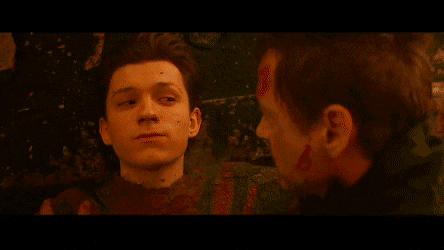
Summary: Tony is obsessed with Peter's disappearance and wants to bring him back at any cost. He moves away from his loved ones, sinks into depression and asks for Wong's help to save Peter.
Warnings: Major character death (?), sadness
Themes: death, father-son relationship, magic, hope, sacrifice, love, Saving Peter Parker
Translated with Google trad ^^’
**********************************************************************************
Ashes became a phobia for some, an obsession for everyone. They refused to cremate the dead, and chimney fires became rare even in the coldest winter. How could it have been otherwise?
“I’m sorry, Mr. Stark, but it’s impossible. As a guardian of the Sanctum, I cannot let you do it. ”
The whole world plunged into silence, as if the shock had taken people off the floor at the same time as their loved ones.
“We have to go ahead, Tony, to maintain a semblance of order. Take back your armour; we will be the Iron men. ”
A national mourning ceremony was organized when people ceased to hope. Captain America gave a long speech in memory of the missing, recalling that we had to keep courage, words without meaning, even for him. The world was not at war, it had lost without even being able to fight. They had failed. It was a month after the Purge.
________________________________________________________________
“The occult powers are not a toy, Mr. Stark, I cannot do anything for you. We all lost someone but that does not give us all the rights. I am sorry. ”
Bruce Banner embarked on research to understand where half of the Universe could have disappeared. He spent all his time there, perhaps to forget that he had lost a part of himself. But we had to face the facts: there was nothing to do, for Hulk as for the others. It was six months after the Purge.
________________________________________________________________
“Tony, you have to … that you stop feeling guilty about what happened. It was not your fault, it was nobody’s fault. Darling… ”
The remaining superheroes returned to service at the same time that the criminals woke up. A semblance of normality had returned, even though Absence was still strongly felt.
“No, Mr. Stark, I refuse to participate in that. The consequences are too uncertain, it is never good to play with life. We, guardians, learned it in pain. It’s no. ”
Thor had managed to find the survivors of Asgard and install them on a small planet to rebuild a kingdom, supported by Valkyrie and Korg. Despite his new responsibilities, he tried to return to see his friend as often as possible. Unfortunately, Point Break always found the genie in the same state: bitter, gnawed by guilt and obstinate not to see the truth. It was a year after the Purge.
________________________________________________________________
- Tony, that cannot continue. I cannot continue … to see you destroy youself. This obsession you have … It’s impossible.
Pepper looks at the impassive figure of the one she no longer recognizes, whom she cannot understand. She had tried with all her strength to support him, to push him forward, to overcome the horrors he had lived, but as much to speak to a wall.
The engagement ring tinkles on the glass table; this break up is different from the previous ones, it is an adieu. After taking a last look at the playboy, Pepper walks away to leave this room too dark, too quiet. Tony’s throaty voice suddenly stops her:
- Will you keep your word?
-Yes. If you succeed … he will officially be your heir.
She refrains from telling him once again that it’s madness. Oh what good would it be ? The door closes without Tony moving a centimetre. He knew it would happen, how could he blame Pepper after all he did? Somehow, it’s better that way, that they separate before…. he does what he has to do. Thoughtfully, he touches his side, where a long scar bears witness to the events of a year ago. A year already … and even more.
Outside, the sea crashes on the rocks under a stormy sky, as if the Sun itself was absent. Hard to believe he was hit by a moon… An umpteenth time, the superhero wonders how a single being could trigger so much chaos, so much suffering. But it’s no longer time to think about it, Tony Stark has never been one to feel sorry for himself, and he’s not going to start today. Not now that Wong has yielded.
The billionaire genie finally gets up, surprises his reflection in the bay window, the drawn features, the hair where pierce some silver threads, and especially his eyes surrounded where shines a flame of determination almost disturbing. To mourn, he can’t, not totally. Not while May Parker hates him. And rightly so: he was supposed to protect her nephew. Every day for months, she pursued him with her anger, her hate, and her sorrow, like a more seductive harpy. It was reminiscent of Tony Stark’s memories of Sokovi’s bitter victory and collateral damages. At the time, he wanted to use the government to fix his mistakes. It was not enough. He did not feel involved enough but today it’s different, he’s ready for anything.
The rain begins to fall while the man in armour joins the Sanctum of New York whose window shines like a gigantic eye watching over the city. Memories come back, his meeting with a man he could not know very long but who resembled him on many points. He, perhaps, has found a way to not die, floating for eternity in a parallel dimension.
- I’m sure your friend teleported to a beach in the Pacific, Wong. He looked smart enough for that.
Tony walks in the door, arranges his rain-soaked hair until the wizard deigns to arrive. It does not take long before he appears, frowning as usual, living figure of disapproval.
- You should refrain from this kind of joke or I may change my mind.
- I just made a guess, no need to come to the threat.
Wong does not answer anything, guides his guest through a series of corridors, the sound of their footsteps choked by oriental rugs. However, the mystic librarian ends up breaking the silence, visibly worried.
- Are you sure you want to do that?
Silly question, it’s been more than a year since the billionaire harassed him without his determination ever faltering and yet, Wong listed the risks more than once. But he supposes that for Tony Stark, life is a gigantic bet. His host does not even bother to answer, it’s so obvious. When the kid di …when he disappeared, it was as if he had taken some of his mentor with him, something broke and the man in armour wanted only one thing: bring him back whatever it costs. Banner told him it was hopeless, Captain asked him to mourn, but it was impossible. When it was not May who was shouting her hate, he saw the teenager’s face in his nightmares. Now he has planned everything. Pepper will run the business until he’s ready, Rhodey will look after him and train him with the other heroes, Banner will take care of the scientific part … He’s been thinking about it for months now and now that Wong has accepted, he will be able to bring back Peter. Wherever he is.
Where Tony expects to see incense, bones, mysterious symbols, in short, all the paraphernalia of resurrection, he finds only one manuscript and the master of the mystical arts donning a double ring. It would not be Wong, you could think of a scam.
- You’ll only have a few minutes to find it. After that, you will both be lost.
- Oh, I thought you were going to announce bad news ..., jokes Tony with a smile but without the spark of irony that always lit his eyes once. Not really knowing what else to do, he stands in front of the librarian, waiting, noting that the wizard carefully avoids his eye with emotion. It would be almost touching.
Wong takes a breath and circles in the air with his fingertips, articulating inaudible words for the man in front of him. This could be any teleport spell at first. But the sparks are usually of a color of fire and not of a deep blue, what we see through the portal is not a gigantic dark expanse. Tony stares for a moment, hoping to see something, a silhouette or even a shape but nothing stands out in the dark.
“Mr. Stark, is it too late to go to the bathroom?»
He probably would have said something like that … if he had been there.
To think thus of the teenager revives the determination of the hero, a moment frozen by apprehension, he turns to Wong to send him a last salute.
- Thank you very much and above all, take care of him. I do not want to have to come and kick your ass.
And without waiting for the answer of the wizard, he crosses the portal quickly, no hesitating anymore.
When Tony Stark had imagined this moment, he had envisioned an intense cold, the same that takes us when we die. But on the other side of the mirror, there is neither cold nor heat, only emptiness and an absence of sensations. All around the billionaire, a deafening silence spreads into the darkness, as if there was nothing else in the world than this visitor. After the shock of discovery, Tony decides to move forward, heart beating and thinking only of the one he must find at any cost. Under his feet, the ground is wrinkled like the surface of a pond but the billionaire is not careful, focused on his mission.
- Underoos !
His voice pierces the ambient calmness, scatters in the void before the silence falls. It is then that a pale color task is formed a few meters from the Avenger, blurry but very real, standing out against the dark background. Gradually, the task becomes clearer, as if you were focusing on it. Peter looks around him, a picture less and less flickering with each heartbeat. Looking as after a long sleep, he blinks, tries to understand where he is. On his face passes a flood of emotions as he remembers his last moments, the battle, the defeat, his death. His whole body trembles and he curls up, hiding nothing of his fear because he believes himself alone, lost forever. My god, he’s dead … so it looks like this after?
Tony slowly approaches the teenager, losing nothing of the confusion that moves him and makes him blind to what surrounds him. He kneels right in front of him, stroking his hair like a little child, making him jump.
- Mr Stark?!
The large hazel eyes express both surprise and immense joy in recognizing their hero and this reaction expresses such innocence that Tony’s heart is tightening. It is because of him that the little one suffers all this … but this ordeal ends, he will go home.
- It’s over…
Without really knowing why, Peter feels he can reassure himself, that his mentor has found a solution and that he can trust him. It’s Iron Man, he always succeeds.
The seconds go by and Tony knows they do not have a lot of time before … being separated again. Then he draws the young man against him, serves him in his arms with more emotion than he would like. No door to open to serve as an excuse, it is a real hug this time. Taken by surprise, Peter does not react immediately as this gesture seems strange to him on the part he admires. Then he puts his arms around him, gives him back his embrace, burying his face against the scarred chest. Nightmares can’t reach him now, everything will be better.
The portal reopens too early, far too early for Tony’s taste. Seeing the sapphire sparks, his first movement is to squeeze the boy closer to his heart, so that they will never be separated again. Then he regains his composure, pushes Peter aside to look into his eyes.
- You’re going home now. Your aunt must make a blood of ink.
- Mr Stark?
Something in the attitude of his mentor worries suddenly the teenager who scans the face of Tony in search of an explanation. It is at this moment that Wong passes his arms through the portal to catch the young man and pull him towards him. Reflexively, Peter clings to the arm of his hero, suddenly sensing that they will be separated.
- No, Mr Stark!
Tony smiles painfully, hoping to be a little reassuring even though he’s never been good at these things.
-It will be fine.
And with a sharp gesture, he recoils to let go of his protégé who screams, tears in his eyes.
-Dad!
The portal closes on him, leaving Tony Stark in the dark, alone but reassured. Now, the little one is safe.
7 notes
·
View notes
Text
Seven Stars Tea Blends
Ever since I saw that the Gundam Café in Akihabara was selling official, licensed teas with the Bauduin and Fareed family crests on them, I knew I was going to write this post someday.
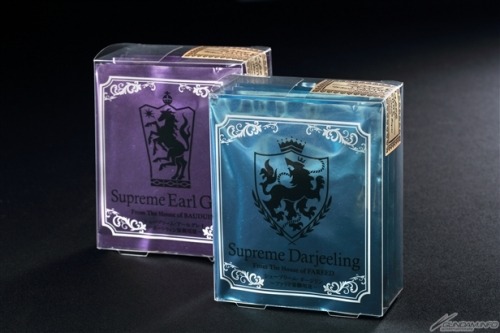
The calls below (other than the two canonical ones) are based on a sort of ambiguous blend of what I think a café might pick (On the Menu), what the characters would think of their family tea in a world with more surviving tea culture than I suspect the IBO world actually has (Tea Culture), and stray facts that influenced my picks or that make fun parallels (Supplementary Notes). I’m tempted to go back in and make bonus picks for Ein, Isurugi, and Julietta, but for now, I’ll try to keep on-theme.
Bauduin Family Blend: Earl Grey.
On the Menu: Bergamont's rich floral scent belies the strength of the black tea brew with its piquant citrus twist; in the same way, the Bauduin family's comfortable affluence masks their intense dedication and trained skill. Tea Culture: Gaelio is surprisingly fond of tea for a soldier, likely due in no small part to his sister's tireless efforts. His palate is not terribly refined, but he can certainly taste when a brew has turned bitter and isn't afraid to say so. Takes his tea with a lot of milk. Gallus leaves the milk but takes a dash of sugar, and likes his teas brewed strong. Almiria has weaned herself off of both milk and sugar when drinking with company, wanting to seem grown-up; though she secretly does prefer a splash of milk added, she nevertheless has the most refined palate of her family. Supplementary Notes: Earl Grey has a storied history that, despite all its associations with high-class luxury, has some outrageously fake elements to it. I enjoy the way this echoes how very prepared Gaelio and Almiria both are to flush their family fortunes straight down the drain the moment Earth taboos or paternal authority conflict with their personal desires. Those kids look like nobles, but deep down, they are far more attuned to their own emotions and goals than they are advancing the family's standing in the peerage.
Fareed Family Blend: Darjeeling.
On the Menu: While the labeling of Darjeeling is strictly regulated and monitored, the tea itself is a mild, soft black with faint floral notes. This juxtaposition echoes both the Fareed family's meticulous intelligence and their talent for the delicate art of social maneuvering. Tea Culture: McGillis has done enough reading, and is attentive enough to social cues, that he can fake it, particularly for Almiria, but his palate is actually quite poor. He can take or leave tea as a drink--he actually prefers coffee--but weird tea classism is exactly the kind of frivolous luxury he loathes on principle. Iznario, on the other hand, is quite discerning. Supplementary Notes: A fun fact about Darjeeling: While the bulk of black tea in India is cultivated from the local variety of the Camellia sinensis plant, assamica, Darjeeling derives from the Chinese type, sinensis. Literally--early Darjeeling tea was grown from seeds smuggled in from forbidden provinces in China, because the East India Trading Company was getting desperate. I am delighted by the way this parallels Iznario's propensity to more or less steal children to advance his own ends--of course we all know how he came by McGillis, but Carta and Almiria's ties to the Fareed family echo the methodology as well.
Issue Family Blend: Matcha.
On the Menu: The Issue family puts a great deal of stock in tradition and ceremony. Our matcha--rich, astringent, and demanding--is a perfect match. Tea Culture: Carta, with her strict personality, would be startlingly skilled with the whole matcha process, though it would have taxed her patience mightily as a young child. She would be smug bordering on intolerable that she drinks it straight, unlike that thin, oversweetened nonsense Gaelio favors. Supplementary Notes: Probably the least likely in-universe call, as Teiwaz and its associated members are the ones hanging onto most of the Japanese culture in the setting, rather than Gjallarhorn, with its European trappings. However, I can't resist drawing the parallel between Carta's fondness for (even reliance on) established battle strategies, her kitsune tails and kabuki makeup, and matcha, that most rigorously, performatively Japanese of teas. If I didn't go with matcha, I probably would have gone with a good quality white, but the delicacy and subtlety of white teas didn't really seem like Carta's bag, and we don't have any other family members to compare to.
Kujan Family Blend: Masala Chai.
On the Menu: An Assam-based blend, this bold black tea is warmed by cloves, ginger and nutmeg. It reflects the Kujan family's reputation for producing leaders whose strength and easy charisma win the unflagging loyalty of their followers. Sweeten liberally with milk and cinnamon for the young or young at heart! Tea Culture: Iok's father, a man of such legendary prowess and charm that he had a generation of soldiers prepared to die for his children, probably drank this mostly straight, adding milk to sweeten it a bit when he was sharing it with his men. Iok, who has the taste palate of a spoiled nine-year-old, likes it so sweet that the family cook has secretly taken to leaving the Assam out entirely. Supplementary Notes: Iok is actually the person in the cast most likely to know his way around a Japanese tea ceremony, if his talent for kanji calligraphy is anything to go by, but chai's particularities--a widely social drink, and one whose production varies so hugely recipe to recipe that some of them don't even bother with tea leaves at all--make it an easy call for someone like Iok, whose charisma and passion make it easy to miss that someone left all the authenticity in his father's cup. Iok is also the most "exotic"-looking of the Gjallarhorn cast, and chai is exotic enough that it's spread overseas under a name that in its own language just means "tea," making it a likely call from our hypothetical Gundam café looking to find something that's foreign-sounding but not so obscure that it's unmarketable.
Elion Family Blend: Russian Caravan.
On the Menu: This green/black tea blend--oolong, keemun, and lapsang souchong--is famed for its characteristically smoky flavor. Bold and complex by turns, but with a mellow finish, this nuanced brew matches perfectly to the Elion family's dauntless yet urbane heir. Tea Culture: Rustal, like McGillis, has little investment in Tea Culture, though in his case it's more because he already knows what he likes and has little interest in exploring other flavors as a weird rich person hobby. Exasperatingly set in his ways, he makes no secret of the fact that he thinks his family brew is a superior tea, and is happy to lean into the star-faring romance of its characteristic flavor blend (see below). Supplementary Notes: The smoke flavor today comes from the lapsang souchong, which is dried over pine smoke, but folklorically, it was thought to have been imparted to the tea by the smoke of campfires on the long trek through Mongolia between China and Russia. As the admiral of the Arianrhod fleet, Rustal is the member of the Gjallarhorn cast who does the most traveling in the black depths of space, and so the imagery of strong-flavored brews to push back against the cold felt like a natural match. Additionally, while Rustal isn't canonically of any particular nationality, he does share his ash blond hair shade with many an anime Russian, which also influenced this match.
Baklazan Family Blend: Silver Needle.
On the Menu: This most rarified of white teas features a profoundly delicate flavor with just a whisper of natural sweetness. The skill, care and discernment involved in its production speak to the Baklazan family head's light touch and keen insight, honed over his many long years on the Council of the Seven Stars. Tea Culture: Lord Baklazan sticks almost completely to white and green teas; even oolong is a bit over-strong for his palate. He's blind, and so finds quite enough to savor in the milder, more nuanced cups of the traditional Eastern teas. He's a bit busy to mind his family's tea brand on his own, but there's an underling on the family payroll whose only and entire job description is "tea master," who Nemo is relieved to say he's unlikely to outlive. Supplementary Notes: We know precious little about Nemo Baklazan, other than his very particular design--even his being blind is blatant supposition on my part--but someone in that council room after McGillis's coup looked around at a room full of dudes in full riot gear and decided, "Despite the implications of those worryingly large guns, McGillis actually can't force us to side with him." Between Nemo, Gallus, and Lord Falk, I'm willing to bet it was Nemo, suggesting a prudent, cautious, but ultimately insightful man. I also wanted to have a proper white on this list somewhere, and he definitely looks the type to have the most refined tastes in Chinese teas. Silver Needle is, not coincidentally, also the most expensive white tea, which feels appropriate for one of the oldest and most influential men in the solar system.
Falk Family Blend: English Breakfast.
On the Menu: A blend of Ceylon and Assam teas with an added earthy Kenyan, brewed to stand up to all the milk or sugar you could add as an indispensable part of the classic full breakfast. Our stoutest black, this tea reflects the Falk family's pragmatism and resolve in the face of the changing times. Tea Culture: Probably the member of the Seven Stars with the greatest active interest in where his household is procuring its tea, Lord Falk always has time to offer his opinion on a cup--Almiria found him to be quite the educational resource, on the few occasions they ever spoke. He has a generous, adventurous palate, though he feels most at home with traditional blacks. Supplementary Notes: Oh my god, you guys, we know basically nothing about Elek Falk--he doesn't even have Lord Baklazan's distinct design! He has a big medallion of the sort that you sometimes see on Anime Popes, but there's no indication that organized religion figures into Gjallarhorn's affairs, and even if it does, the dude who responds, "That's just a fairy tale!" to claims of Agnika's soul animating Bael does not strike me as a likely spiritual leader. He seems interested in getting to the bottom of mysteries--he's one of the voices pressing for continued investigation into Galan Mossa after the Silent War--but those are literally all of the characterization cues we get for him. I don't want to sit here saying, "I picked English Breakfast because he looks like a guy who never skips a good full breakfast, if you get my drift, hohoho," but, like, if the shoe fits...
#mobile suit gundam: iron-blooded orphans#gundam ibo#g tekketsu#mcgillis fareed#gaelio bauduin#almiria bauduin#gallus bauduin#carta issue#iok kujan#rustal elion#seven stars#my writing#ibo meta#please take this nonsense
22 notes
·
View notes
Text
MTVS Epic Rewatch #210
BTVS 7x22 Chosen
Stray Thoughts

You know what? I don’t think I am, Buffy.
1) You know the baddy’s fate is sealed when they dare call Buffy a bitch, right?
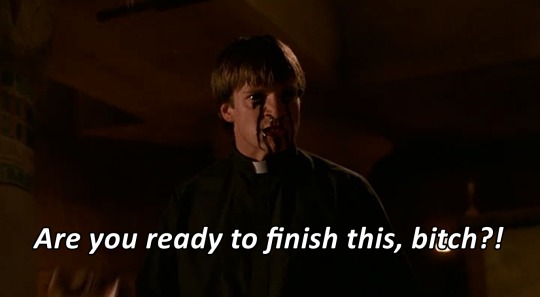
2) Watching Buffy ax Caleb right in the balls and then make puns about it fills me with infinite joy.
3) I think you all know by now I’m not a Bangel shipper, so I wonder how Angel shippers feel about Buffy and Angel’s last on-screen conversation being about Spike. Doesn’t it feel a bit like a wasted opportunity? It’s not really OOC for Angel to act jealous and possessive (even though in the universe of the show he’s spent the last two years approximately being in love with Cordelia, so why does he think he has any right to question Buffy’s love life? Anyway, I know that’s the writers' fault – how they always blatantly ignored whatever was happening in each show for the shippy crossover moment – but the end result is that Angel looks like a two-timing asshole who can’t make up his mind about what or who he wants.) But like, the world is ending, this is what you want your last conversation to be…?
4)
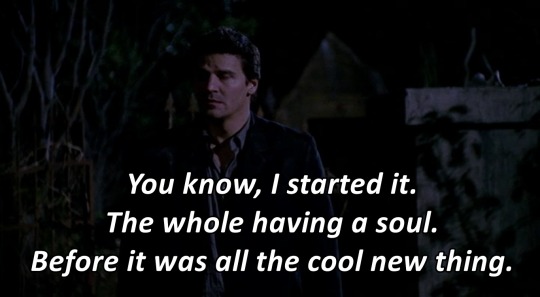
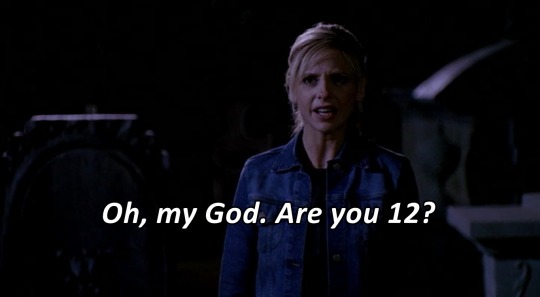
He is. He is a 200+ years old man-child-pire.
5) The cookie dough speech, though? One of my favorite speeches in the show…
I'm cookie dough. I'm not done baking. I'm not finished becoming whoever the hell it is I'm gonna turn out to be. I make it through this, and the next thing, and the next thing, and maybe one day I turn around and realize I'm ready. I'm cookies. And then, you know, if I want someone to eat… or enjoy warm, delicious cookie me, then...that's fine. That'll be then. When I'm done.
I think it’s one of the finest messages the show delivered, and it’s especially important coming from Buffy herself, someone who was seldom not in a relationship.
6) Callback #1…

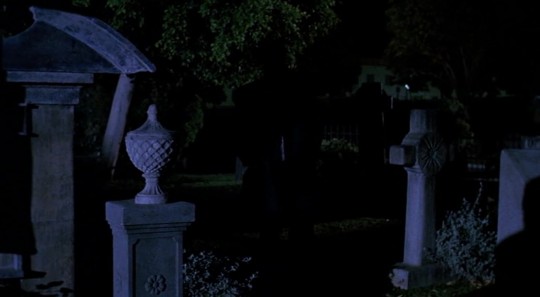
This parallels both Angel’s first appearance in the show in Welcome to the Hellmouth as well as his exit from the show in Graduation Day Part 2.
7) Oh, Xander…


8) Of course, the shipping wars wouldn’t be complete without Spuffy talking about Angel. Guh.
9) Iconic!
You know, one of these days I'm just gonna put you two in a room and let you wrestle it out. There could be oil of some kind involved.

One can only dream!
10) This gives me a lot of feels… It’s such a small gesture but it means she finally trusts him.
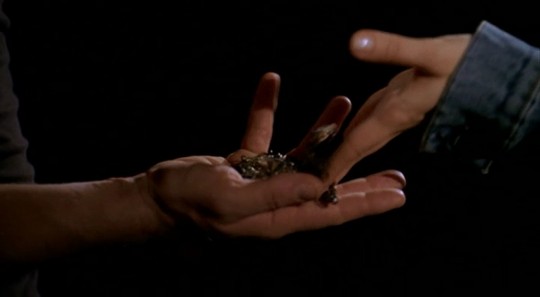
11) You see what I mean when I say the First was fucking idiotic? Always giving Buffy the precise information she needed in order to defeat it? I mean…
None of those girlies will ever know real power unless you're dead. You know the drill: Into every generation, a slayer is born. One girl in all the world. She alone will have the strength and skill to— There's that word again. What you are. How you'll die. Alone. Where's your snappy comeback?
Like, seriously, do you even want to destroy the world? You’re not trying real hard!
12) Yeah, you fucking are!

13) See? Cut to the next morning, Buffy is telling the others her plans, inspired by none other than the First itself! I don’t think she would’ve thought of it if he hadn’t mentioned the fact that they needed the potentials to have real power, the power of a slayer.
14) Sweet, innocent Dawnie!
WILLOW This goes beyond anything I've ever done. It's a total loss of control, and not in a nice, wholesome, my girlfriend has a pierced tongue kind of way.
BUFFY I wouldn't ask if I didn't think you could do it.
WILLOW I—I'm not sure that I'm stable enough.
GILES You can do this, Willow. We'll get the coven on the line, and we'll find out how they can help.
DAWN Oh! "Pierced tongue."
15) This line always gives me chills!
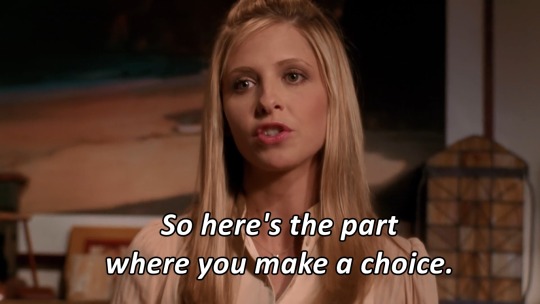
16) Although their conversation is cute…
ROBIN Faith—Make me a deal, all right? We live through this, you give me the chance to surprise you.
FAITH What would be the surprise?
ROBIN You do know the meaning of the word, right?
I really don’t see the point in spending precious minutes of a finale on these two. If we needed Faith to get closure with anyone, that was Buffy.
17) I don’t actually hate Kennedy on this episode. Wow. I never thought I’d say that.
18) How the mighty have fallen…
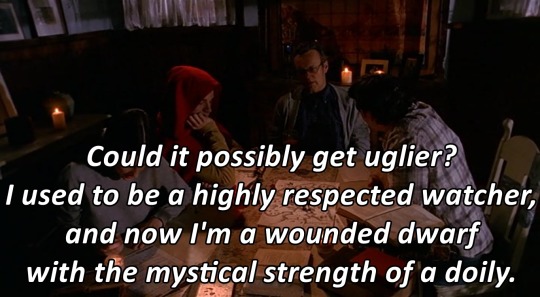
Although I think I missed the part where he was a “highly respected watcher”...
19) And then this scene…
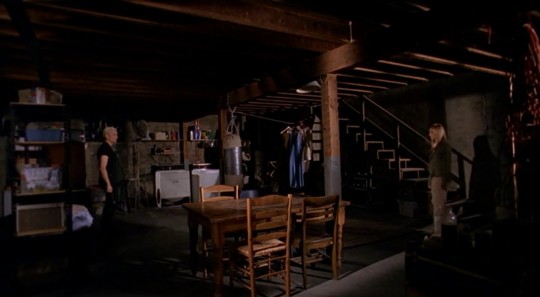
I’ve talked about it before, so I’m going to leave you the link in case your interested to know what I make of it as a Spuffy shipper.
20) Oh, Anya…
ANYA So that leaves me and the dungeon master in the north hall?
ANDREW We will defend it with our very lives.
ANYA Yes, we will defend it with his very life.
XANDER And don't be afraid to use him as a human shield.
ANYA Good, yes, thanks!
21) aNDREW HAD A FUCKING SPEECH PREPARED, I CAN’T!
22) Now, this is what this season should’ve been about…

23) And callback #2…


24) Ok, this is one my greatest movie/tv pet peeves. Why would anyone cut their hands? I get it, you need blood or whatever. I can think of 10 parts of your body you could get it from which wouldn’t be as inconvenient as your hand. Like, how do they continue doing things with a fucking open wound on the palm of their hands? It doesn’t make any sense! And it’s always the fucking hand! WHY!?

25) This is probably the scariest shot in the show, isn’t it? (even if the CGI wasn’t that great…)

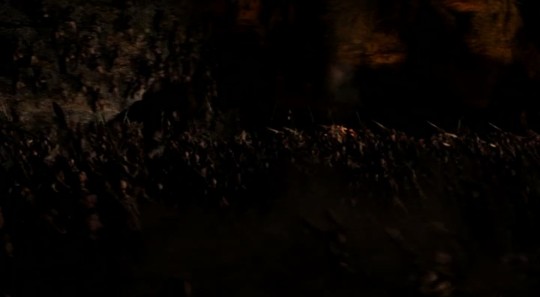
26) Oh, man, this speech still gives me chills!
BUFFY So here's the part where you make a choice: What if you could have that power... now? In every generation, one slayer is born... because a bunch of men who died thousands of years ago made up that rule. They were powerful men. This woman is more powerful than all of them combined. So I say we change the rule. I say my power... should be our power. Tomorrow, Willow will use the essence of the scythe to change our destiny. From now on, every girl in the world who might be a slayer... will be a slayer. Every girl who could have the power... will have the power... can stand up, will stand up. Slayers... every one of us. Make your choice. Are you ready to be strong?
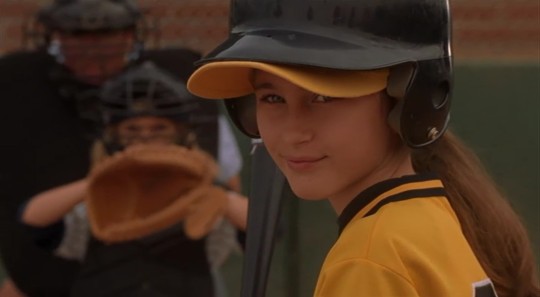
I love it. I do. It is an empowering moment, it’s Buffy and the slayers breaking free from the Council, taking back the power that was imposed onto them, choosing that power.
The irony is not lost on me, however, that Buffy is making the choice for – and therefore removing the agency of – every single potential slayer who is not in that room. She did ask the ones living with her, but what about the rest? What if they don’t want that power and its responsibility?
In spite of this, it still holds up as one of the greatest moments in the show.
Side note: I read somewhere (or saw an interview?) about how this speech was much longer, and how SMG delivered the whole speech in its entirety without making any mistakes, and when she ended everyone was so in awe at what she’d done as an actress that they started clapping. She is a great actress, isn’t she?
27) And our Willow has come full circle, hasn’t she?

28) Iconic shot!
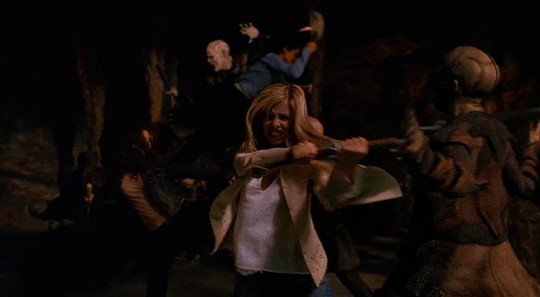
29) Bless you, Anya!!

30) …
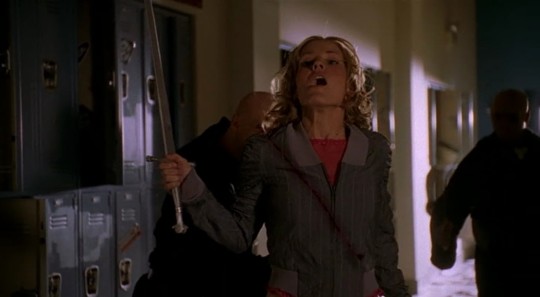
R.I.P. Anyanka Emanuella Jenkins, former vengeance demon, self-appointed American and defender of capitalism, arch-nemesis of bunnies, hater of subtleties, teller of truths.
I know the way Anya went pissed off a lot of people, especially because it’s almost a blink-and-you-missed-it moment. I do, however, feel that someone had to die in this way. Someone important, I mean. Not every main character death in the show could have a big preamble and a huge aftermath. Sometimes you see death coming, but other times, it happens in an instant and it’s done. That’s especially true in big battles like the one in this episode. There is no time to stop and mourn because if you do, you might end up on the dead pile yourself.
We see later how the only ones concerned about Anya are Xander and Andrew. That makes sense, too, in my opinion. Anya was never a true member of the Scooby gang. She was merely there because of Xander. I’m not saying that was okay, I’m simply stating a fact. In fact, I’ve voiced my annoyance about the way Buffy and Willow treated her several times. (This is proven by how little thought was given to her feelings after Xander left her at the altar…) It hardly matters anyway, because if she wanted to be remembered and missed by anyone, that most certainly was Xander. Her life revolved around him, for better or worse.
But, apart from this, I think this was a fitting way to finish her journey – from vengeance demon, to inadequate teenager, to girl in love, to working gal, to scorned lover, to vengeance demon again, to humanity connoisseur and admirer. She overcame her fear of death and she embraced her humanity, and she died stupidly fighting for what she believed in, just like humans do.
31) I think this is one of the most underrated puns in the show.


32) Have you noticed how they are killing the Ubervamps with… stakes? Retcon much?
33) Oh, bollocks, indeed…
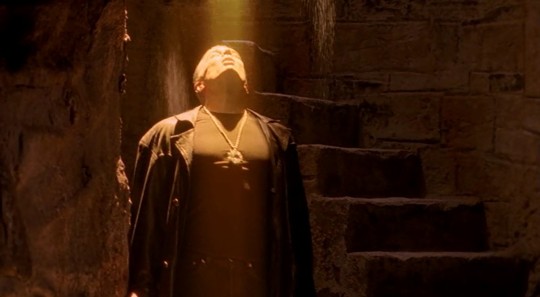

34)It kind of breaks my heart when Spike says that he can really feel his soul like he didn’t really believe it was actually there until now.
35) Oh, god, my Spuffy heart…
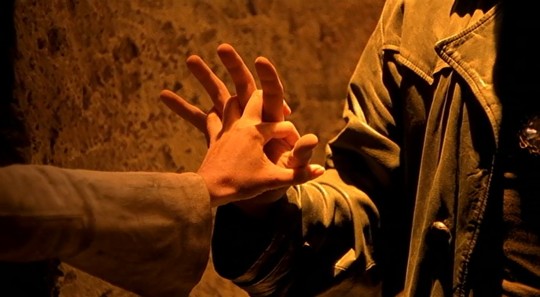



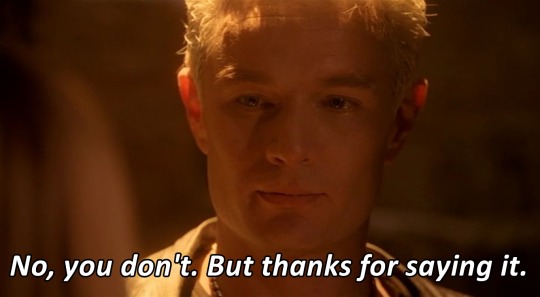
Does Buffy really love Spike, though?
36) "I wanna see how it ends.”

R.I.P. Spike. Sort of. Not really.
37) I really like this shot…

Buffy just stares at the open road, her life ahead, her future, thoughts she’d never before allowed herself to indulge in because death was always around the corner. But now? There’s literally a world of possibilities…
38) Callback #3…


You left like you arrived, Spike. Goodbye home, sweet home.
39) Bless you, Andrew.
XANDER So, did you see?
ANDREW I—I was scared. I'm sorry.
XANDER Did you see what happened? I mean, was she...
ANDREW She was incredible. She died saving my life.
XANDER That's my girl. Always doing the stupid thing.
40) I just love the fact that the original cast members are the only ones in the last shot BECAUSE THAT’S WHAT THIS SEASON SHOULD’VE BEEN ABOUT. EHEM.
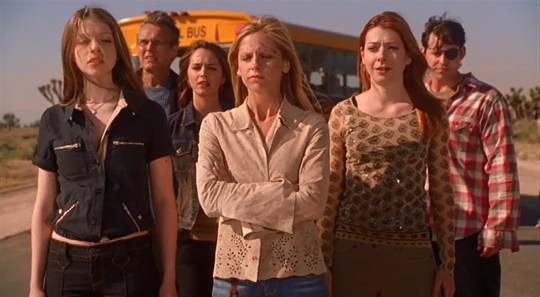
41) I just…
WILLOW Yeah. The First is scrunched, so... what do you think we should do, Buffy?
FAITH Yeah, you're not the one and only chosen anymore. Just gotta live like a person. How's that feel?
DAWN Yeah, Buffy. What are we gonna do now?
Buffy:

ME:

I will try to form a coherent thought because as I write this, I’m still bawling my eyes out. This ending is especially poignant for me because Buffy is my favorite character, so all I’ve ever wanted was her happiness. It’s been seven years. Seven years of heartbreak, pain, mourning loved ones, non-stopping fighting. Seven years of feeling the weight of the world on her shoulders. A girl, alone in the world, fighting the forces of evil. Never allowing herself to look forward because that always leads to disappointment and crushed expectations. But now? Nothing is stopping her now, nothing is holding her back. The open road is right ahead, and she can go and do whatever she wants to.
The show had to end with a final shot of Buffy. This was her journey, and though it’s far from over, that smile assures us that yes, she will be fine.
I guess it gives all of us a little bit of hope.
42) Is Chosen a perfect episode? I don’t think so. I think too much time was wasted on ship moments and side characters. There’s a lot of talk but not the kind I usually enjoy the most. It’s only half-way through the episode – when they get to Sunnydale High - that you really get that feeling of “Oh fuck, this is really the end, this is actually happening!”
But I do think it’s a good ending, nonetheless. There’s an epic battle – although I do enjoy the season 3 battle much more… - there’re callbacks and special character moments, there’s closure and there’s death because it wouldn’t be Buffy if no one ever died. (You lied, Giles.)
More importantly, it does what series finales ought to do – it pays tribute to its characters, and it’s a gift to the fans. I don’t think we should ever measure the quality of a show by how good their series finale is, you know? When I think of this show – and we all know I think about it a lot – it’s not “Chosen” what comes to mind. It’s everything that came before it. Chosen is a celebration of and a tribute to all of that. And as such, it is a perfect finale.
43) Thank you to everyone who has ever read one of my recaps, you are the reason I pushed through even when I felt like giving up. Thank you for sharing my unconditional love for this show. I love you all, too.
44) If you’ve got this far, thank you for reading! If you enjoy my recaps and my blog, please consider supporting it on ko-fi. Thanks!
#Buffy the Vampire Slayer#BTVS#Buffy Summers#Chosen#Sarah Michelle Gellar#MTVSepicrewatch#BTVSrewatch2015#mine#recap#btvsrecap
68 notes
·
View notes
Text
The Batman the Animated Series Theme Song
Animated tv shows that went on throughout the 80’s and early 90’s were known for having a really great theme song and animated intro to go with it, but rarely did this quality remain once the song ended. Look up “crazy stupid pranks h3” on Youtube sometime to get what could be considered a hilarious parody of this, even though he was actually parodying something completely different in this video. But back then, budgets were tight, and more money was spent on the theme song to get people hooked in. A lot of the time with theme songs, it wasn’t only the animation quality taking a dip once the episode started. Sometimes the tone would change as well. One example of this (although from later in the 90’s) is Pokémon, at least when it comes to the English dub. This is a masterpiece of an intro, but when the show starts, the tone is vastly different, focusing more on comedy a lot of the time (old Pokémon has more of a comedic focus than I feel a lot of people actually remember). Batman was one of the shows that changed the game in this aspect (and in many other aspects as well), at least when it came to action shows. This was no Teenage Mutant Ninja Turtles. The show was every bit as dark, brooding, and menacing as the intro was, and there was no deception when it came to advertising what you were about to watch. Now, the intro did obviously have a pretty damn good budget. It looks beautiful, and TMS were the ones that animated it, a top-notch studio known for some great work on this show and others. So to get around a major quality/tone shift, the intro was heavily stylized, as was the show. It was a representation of what you were about to watch as opposed to a supposed sneak preview. I think anyone could see the opening sequence and automatically assume that the episode following wouldn’t have as much ambiguity. It was almost like a super stylized movie poster, doing its job of getting you excited, but never letting you down. I am very overdue on talking about all of this, so I figured it would be better late than never to go through this sequence and analyze it a little bit, just for fun. I probably should have done this before the first episode!


Right away we start by actually integrating the Warner Brothers logo. This could have been really cheesy, but that chilling score mixed with seeing it immediately makes me feel like I’m watching a Batman film rather than a TV show aimed at children. The logo shifts to a police blimp, something made up for the show, and we immediately get a sense of the Batman TAS world which we are about to dive into.


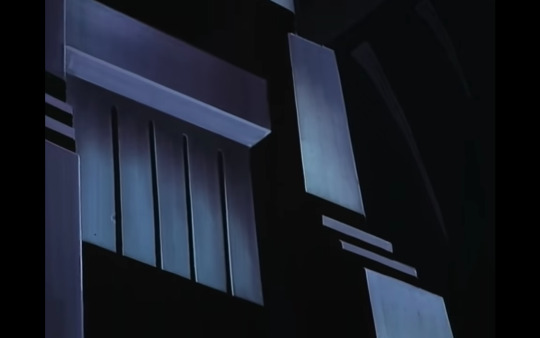
Some really nice background work that we get to pan through. This serves as our establishing shot, showing us as much as it can in the time provided of where our Batman resides and looms. It’s like a gargoyle’s playground, and already we can tell that this isn’t your average Saturday morning cheeseball.
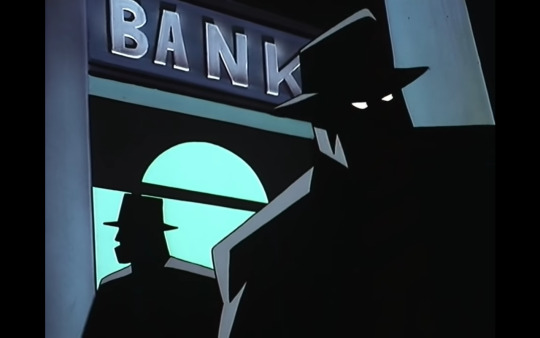
Two sinister figures step into the shot. Notice the lack of any real texture or line work. This leaves so much up to the imagination and further sets up the tone. The production company behind the show has stated that when the intro was initially animated, it was done in full detail, but it was sent back and redone because they wanted this vague, mysterious aesthetic. I’d absolutely love to see the initial version, but I am more than happy with what actually became the sequence.

The music creates some tension, and then it is relieved by an explosion that cuts through the darkness. It almost makes you jump right out of your seat. Imagine seeing this in a movie theater. This scene also confirms your suspicions about the two figures. Their intentions cannot be good.
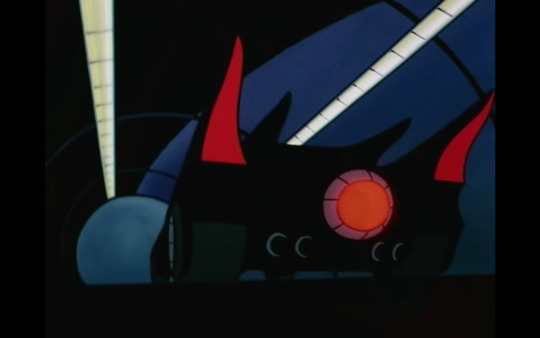
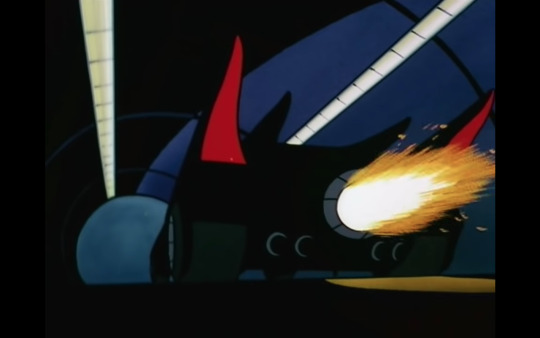
Wow, the music chugs right along here, almost taking your heartbeat for a ride along with it. Then we get a shot from behind the Batmobile. It blasts to life, and we see one red section amongst all the black colors. It’s almost like Batman’s version of the bank-explosion, and equally as threatening to the men he’s about to hunt down.
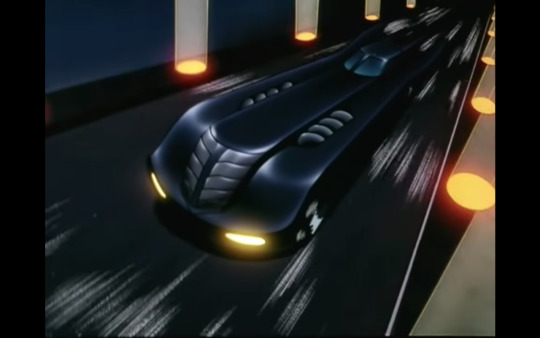
There it is. I’d love to know what show people thought this was if they happened to flip to Fox right as this show appeared. Would they have known it was Batman immediately? The Tim Burton movie had been out for a bit at this point, so I would assume that many did.
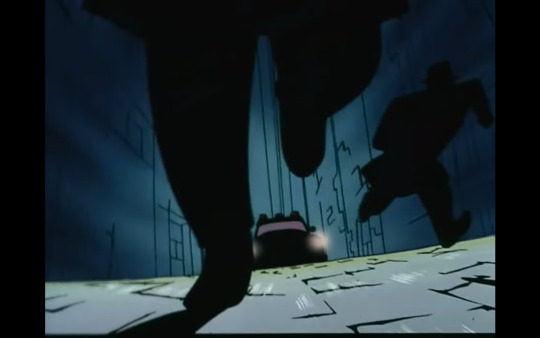
And here we see the villain’s parallel situation, rushing to the same spot that Batman is, little do they know. We barely see any background details, leaving all of the focus to the darting feet and gaining police car.
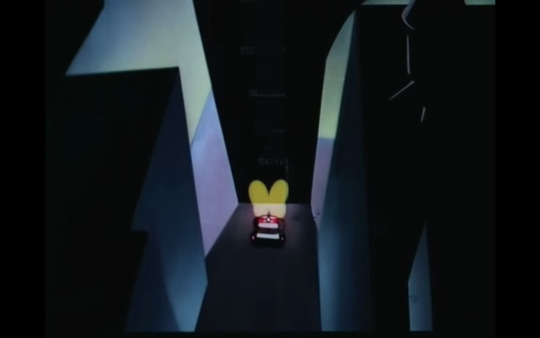
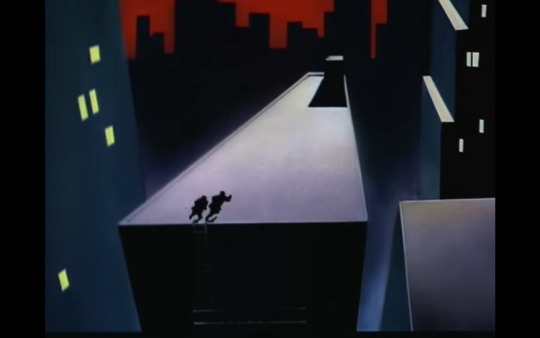
Boy, they sure do make it up that building quickly. Everyone loves to point this out, and I’ll admit that it’s something I’ve always noticed. But it’s also something that you don’t dwell on because, well, who cares. We see a dead end, and know there’s only so much further they can run until they become prey to the knight. We also see a really cool red skyline, which honestly wasn’t common to see in Batman the Animated Series until much later after the resurgence (TNBA). I’ve been kinda unsure of why people treat the red sky thing as if it’s an issue. I always loved how it looked, personally.
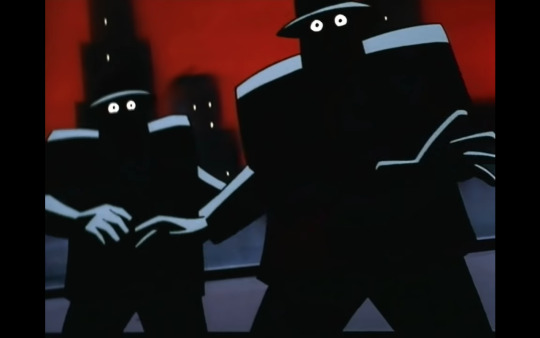
The look on their eyes says it all. At this point our fists are clenched. “C’mon. Show us what show this is!”

The menacing silhouette drops down. I loved this stylized look they they often do in the show, where all you see is the shape of a giant bat and some white, glowing eyes.

And there he is. Everyone watching immediately knows what they’re watching now. Here is the best-looking Batman that anyone had seen on tv thus far, giving that intimidating glare. We do see three dots of cell dirt, and it’s too bad that the crew never got around to editing these out before the first episode. Imperfections on an otherwise perfect looking shot.
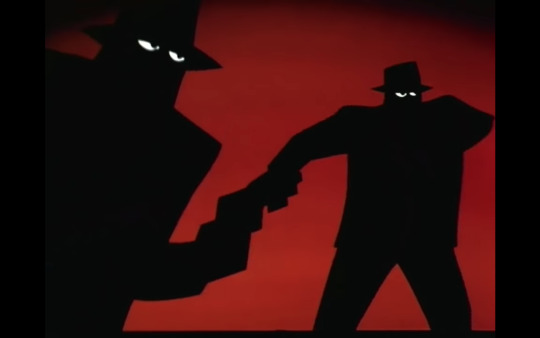
The baddies were spooked, but now it’s clear that they’re aggressive and have no idea what they’re getting themselves into. We also see that they’re holding firearms, something that was not as common at the time (and definitely not as common now).


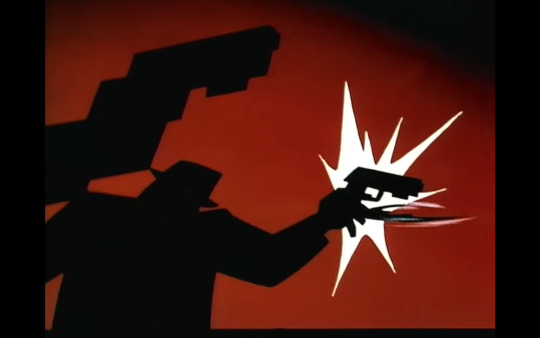
Batman, as always, a perfect shot with the batarang. This really has to be seen in motion to be appreciated. It looks so clean, and here you realize that there is no escaping for the thugs.

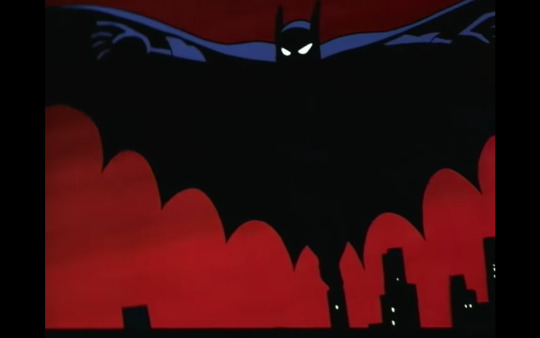
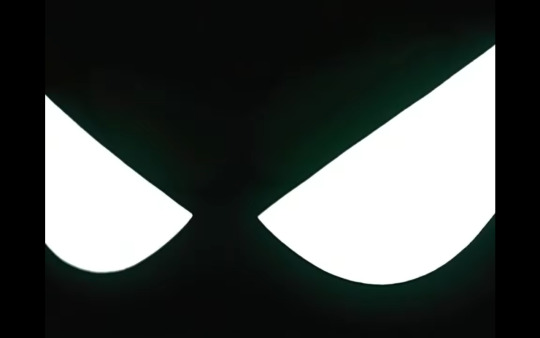
Batman leaps up, looking like a supernatural being. This is possibly my second favorite shot in the whole sequence, just because of how demonic Batman looks. If you saw this coming at you, you’d probably assume that you’d be sleeping in your death bed that night. I like to imagine that because of fear and the darkness, this is genuinely how criminals remember Batman looking.
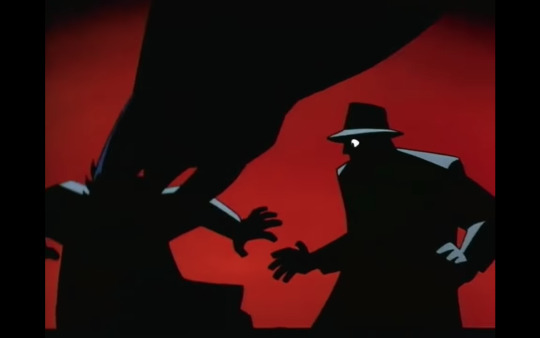


Out cold. You don’t necessarily see what batman actually did to him. Before watching the show and knowing Batman’s philosophies, you’re not even sure if the guy is alive. You just know that Batman seems fascinating, and that you cannot wait to learn more about him, and possibly feel the same sense of mystery that you would feel if you were actually on that rooftop.
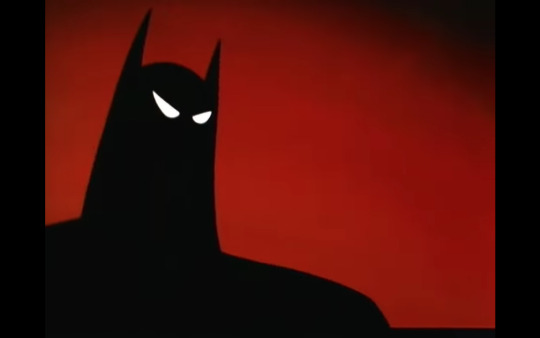
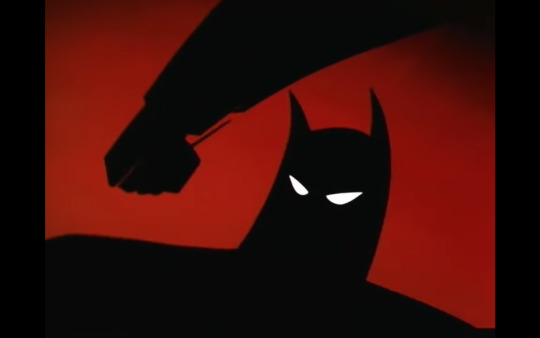
The way Batman bends here is again how I picture thugs remembering him. He moves way faster and a lot different than people usually picture humans being able to. And with the adrenaline rush, your mind can play tricks on you, man. Try staring at your reflection in a dark room sometime. Our minds aren’t always as straight forward as we assume.
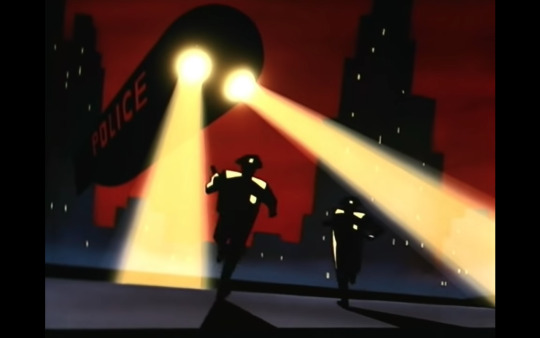
Batman took care of them before the police could even get up to the top of the building. You know how effortless this fight was. For the dark knight, it’s just another workday. For everyone else, it’s something unforgettable and unworldly. Everything is relative.
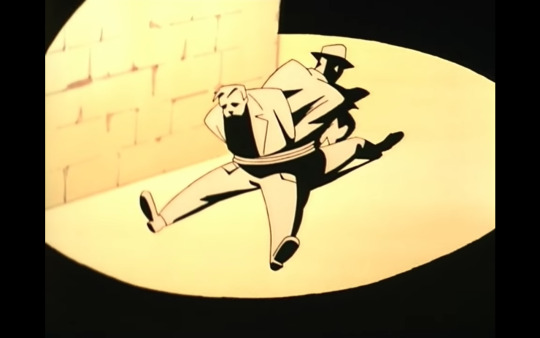
Here we see that the two men are fine, when Batman easily could have ended their lives. We know now that Batman isn’t a cold-blooded killer, but a protector of the night. A twisted guardian angel.

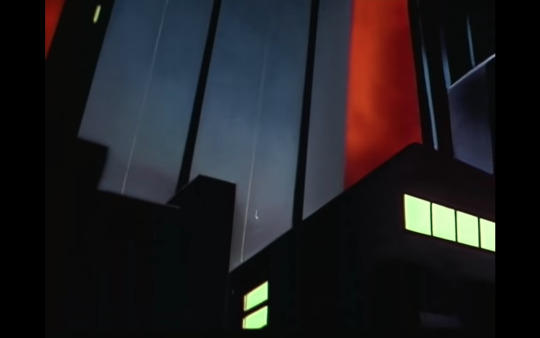
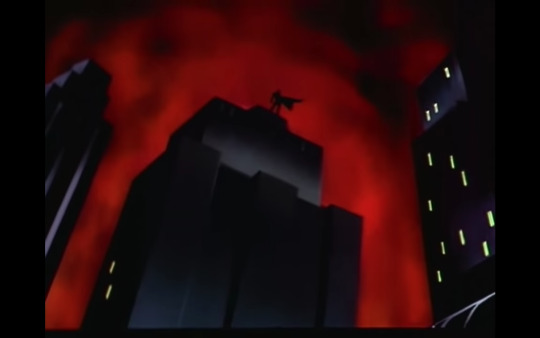
Here we scale up, and the shot melts into another section of the city. We get a taste of the heights of Gotham City here.

This couldn’t get anymore awes-
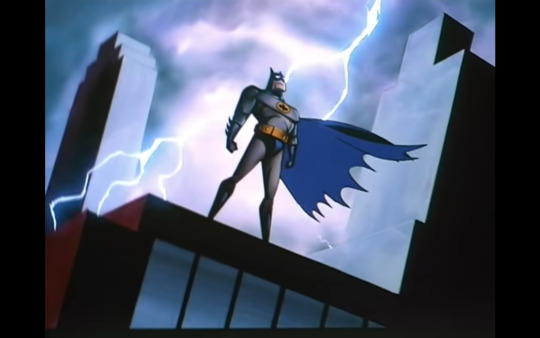
Whoa. Um. I was saying. A section of the music that played before repeats (my favorite section, with my favorite shot), and we get that flash of lightning. No need for a title sequence. This speaks for itself. Text would have cheapened it.
And that is the intro to Batman the Animated Series. I’ll likely be going over every intro we come across throughout the DCAU, so hopefully look forward to that! I’ve also decided to mix things up sometimes with posts like this and not just stick to episode blogs. As long as I have something to talk about, anyway! I’m hoping that more people find the blog this way. If you liked what you read, check out more! I’m not necessarily the fastest at posting, I am a busy, busy college student who sets schoolwork as priority. But I do posts for every single episode of the DC Animated Universe! I also take submitted questions, and would love to start discussions!
Also, check this out:
youtube
13 notes
·
View notes